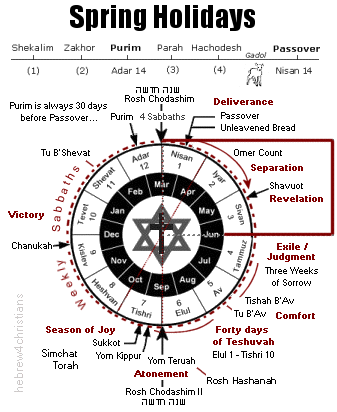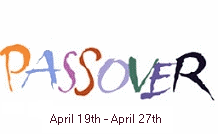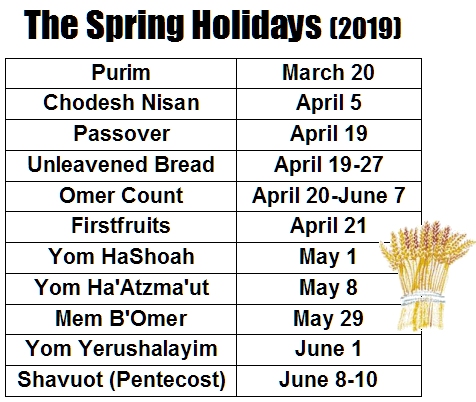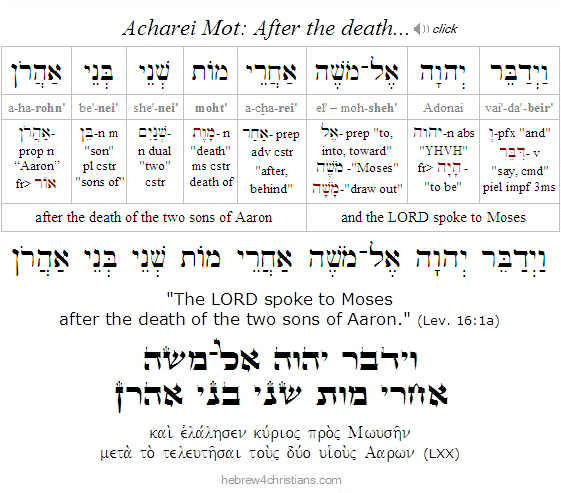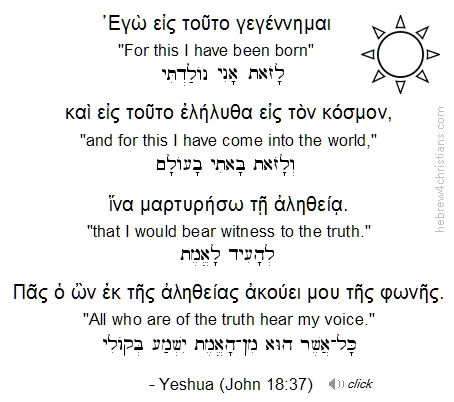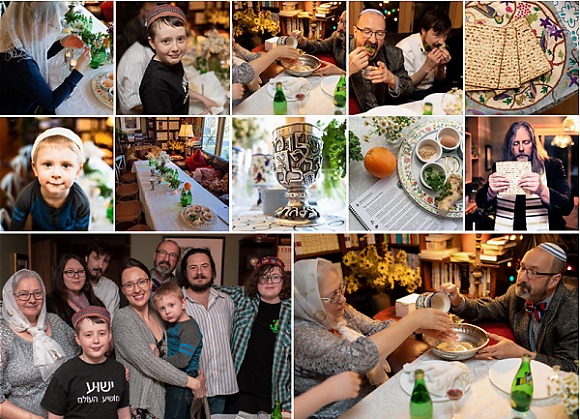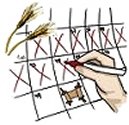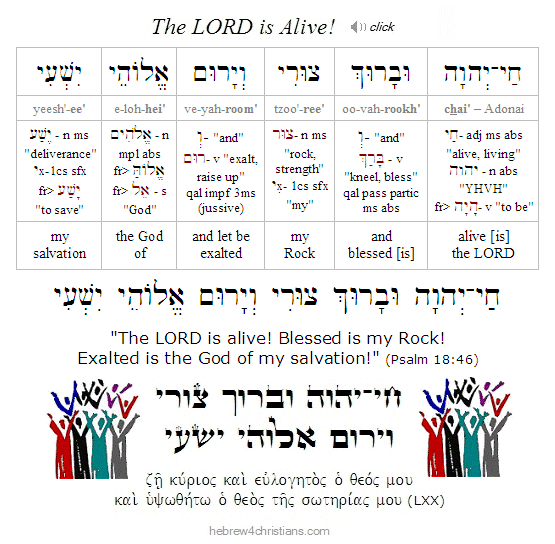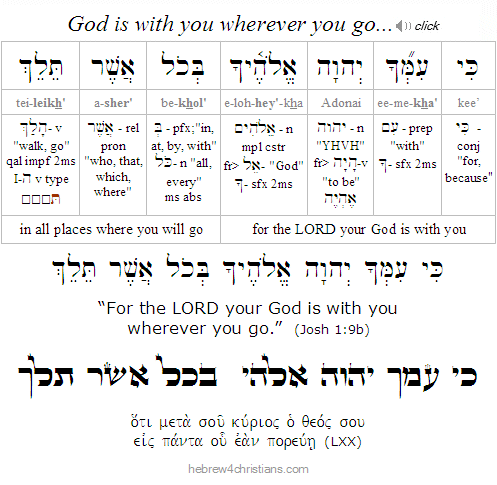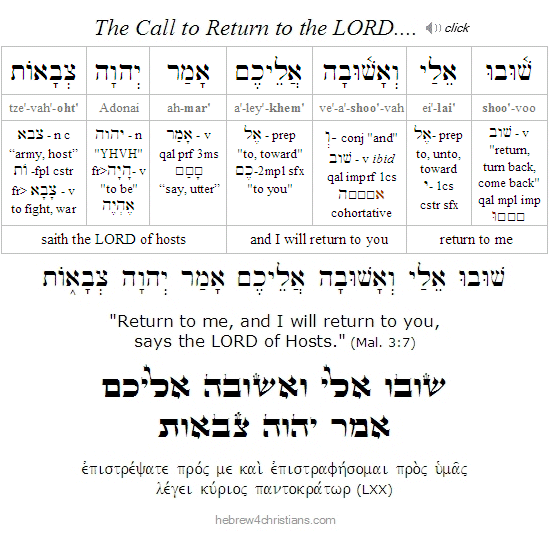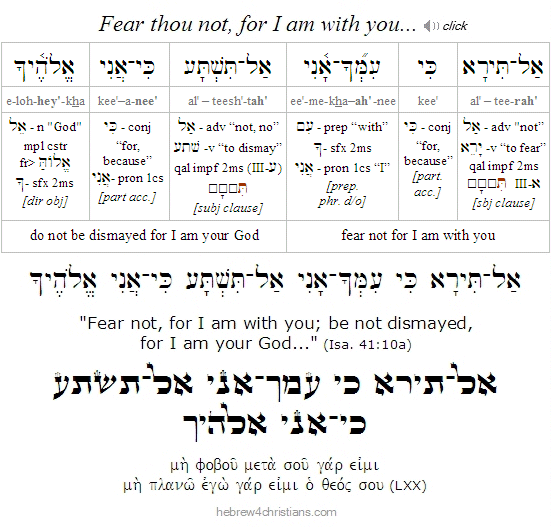|
Jewish Holiday Calendar
For April 2019 site updates, please scroll past this entry....
Spring is the start of the Biblical Year and is marked by two of the Shelosh Regalim (three annual pilgrimage festivals): Pesach (Passover) and Shavuot (Pentecost). The holiday of Shavuot is held seven weeks (or fifty days) following the morning after Pesach.
The Spring Holidays:
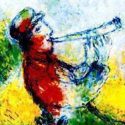
The spring holidays provide a portrait of the death, burial, and resurrection of the Messiah: Yeshua was crucified on erev Pesach, buried during Chag Hamotzi, and was resurrected on Yom Habikkurim (Firstfruits). Shavuot (i.e., the feast of Pentecost) was the day the Ruach HaKodesh (Holy Spirit) fell on believers in fulfillment of the promise given by our Lord.
Note that in accordance with tradition, the following holiday dates begin at sundown:
- Month of Adar II (Wed. March 6th [eve] - Fri. April 5th [day])
Dates for Passover 2019:
Free Seder Guide
- Month of Nisan (Fri. April 5th [eve] - Sat. May 4th [day])
- Biblical New Year's Day: Rosh Chodashim [Fri. April 5th, Nisan 1, 5779]
- Four Sabbaths: Tazria (chodesh), Metzora (HaGadol), Passover (x2), Acharei Mot
- Shabbat HaChodesh - The Sabbath before (or on) Rosh Chodashim
- Rosh Chodashim - The start of the Biblical Year (Fri., April 5th,)
- Shabbat HaGadol - The Sabbath before Passover (Fri. April 12th)
- Bedikat Chametz - Removing leaven from your home before Passover
- Fast of the Firstborn - Fri., April 19th at sunrise (Nisan 14)
- Bi'ur Chametz - Burning leaven; Fri. April 19th in afternoon (Nisan 14)
- Passover - Fri. April 19th late afternoon until sundown Sat. April 27th
- Unleavened Bread - Fri. April 19th until sundown April 27th (Nisan 15-22)
- Firstfruits - Sun. April 21st at sundown (Nisan 17); Yeshua's Resurrection
- Counting the Omer - Sun., April 21st - Fri., June 7th

- Armenian Genocide Remembrance Day (April 24)
- Yom HaShoah - Wed. May 1st at sundown (Nisan 27)
- Rosh Chodesh Iyyar - Sat. May 4th (Nisan 30)
- Month of Iyyar (Sat. May 4th [eve] - Mon. June 3rd [day])
- Month of Sivan (Mon. June 3rd [eve] - Tues. July 2nd [day])
Note: Because this is a Jewish leap year, the holiday of Passover -- and particularly the Festival of Firstfruits -- will not occur near the traditional date of "Easter" or "Resurrection Sunday" as it is often called in the Gregorian calendar... For more information, see the Calendar Pages....
April 2019 Updates
The Narrow Door...

04.30.19 (Nisan 25, 5779) "Strive to enter through the narrow door. For many, I tell you, will seek to enter and will not be able" (Luke 13:24). The narrow door is the way of humility, assuming a low position, crawling, if you will, and making yourself small... The large, wide-open door is designed for the crowd and its idols. Beware of the world that seeks to assimilate the soul: beware of becoming part of the crowd! The individual is lost and overwhelmed in the midst of the crowd and its momentum. The crowd assimilates the soul, laughs at the notion of individual responsibility, and abandons itself to the gravity of purely natural forces... The life of faith, on the other hand, refuses to regard the individual human heart as a triviality, a joke. Faith is an individual struggle, a walk into unknowing; it is the way of the sojourner who feels uneasy in this world of shadows... God is always with us and helps us stay strong and resolute, even as we struggle through the darkness of this age. Press on, chaverim! Do not lose sight of your high calling in Yeshua.
 |
Cowardice and Atrocities...
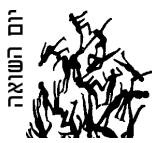
[ Yom HaShoah, or Holocaust Memorial Day, begins May 1st at sundown this year... ]
04.30.19 (Nisan 25, 5779) Yom HaShoah, or "Holocaust Remembrance Day," marks Israel's time of commemoration for the approximately six million Jews -- including over a million children -- who perished as a result of the actions carried out by Nazi Germany and its accomplices. It was inaugurated in 1953 and is annually observed on (or about) the 27th day of the month of Nisan, just a few days after Passover Week in the spring. In stark contrast to the celebration of freedom commemorated during Passover, Yom HaShoah marks a very difficult time when we revisit specters of absolute evil and again ask haunting questions about the power and presence of malevolence in our world. Often we are left speechless over the cruelty and depravity of human beings. It all seems so inexplicable, so needlessly horrible, so senseless, so vile... We may feel powerless, despondent, or full of indignation, but still we ask ourselves, how could this have happened? How was all of this possible?
Simply put, the Holocaust was the result of cowardice and self-deception... The systematic, institutionalized, and "politically correct" genocide of the Jewish people was made possible solely because so many others - including nominal "Christians" - forfeited their God-given responsibility to live as authentic individuals by passively surrendering their will to "the crowd." But giving up your identity to join a gang inevitably leads to fragmentation of the soul, potentially inviting in a "legion of demons..." Regardless of whether it's a gang of thugs running an inner city neighborhood, or the pressure to keep quiet over ethical misconduct at your place of work, or the desire to feel "approved" as a good citizen of the state, or even the pressure to conform to a particular religious group, in either case, "losing yourself" in the midst of the crowd is an evasion, a cop-out, and a desecration of the image of God within you. Indeed following the crowd is a form of slavery where you surrender your freedom for the sake of a supposed sense of security... You become self-deceived because you no longer "own" yourself but became the ward of "another." Becoming a member of a crowd makes you into a copy or similitude, a shadow rather than a person of substance.
We must never forget what happened to the Jewish people under Hitler. The Holocaust was made possible because people timidly refused to stand apart from the group to serve as bold witnesses of the truth. And the great risk of our age is the revival of political fascism that attempts to again control, disarm, and violate people's freedom all for the supposed greater good of the "state." We must remember that silence in the face of evil is itself evil: "First they came for the communists, and I didn't speak out because I wasn't a communist. Then they came for the trade unionists, and I didn't speak out because I wasn't a trade unionist. Then they came for the Jews, and I didn't speak out because I wasn't a Jew. Then they came for me, and there was no one left to speak out for me" (Martin Niemöller).
For more see: Cowardice of the Crowd: Further Thoughts on the Shoah.
 |
 |
Beauty for Ashes...
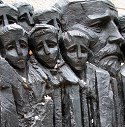
04.30.19 (Nisan 25, 5779) While there is no official "haggadah" for the Yom HaShoah memorial, it is traditional to light a yellow yahrzeit candle for those who died, to attend a Yom HaShoah memorial service, and to recite kaddish. Some people prepare a lavish meal using recipes written from memory by the starving women of Theresienstadt (salvaged after the war). Many of these recipes are for rich desserts and cakes, recalling days of joy before the women and their families were rounded up and brought to the concentration camps. During the memorial meal, stories of Jews who died are told, as well of those of survivors. Many survivors tell stories about the "hidden children" who were saved by righteous Gentiles (חֲסִידֵי אוּמוֹת הָעוֹלָם). These young survivors were either hidden in secret places (like Anne Frank) or were "adopted" by Christian families who pretended they were their own children.
Though we can't control what happens in this dangerous world, we can trust that God is working all things together for good, even during times of severe testing, and even in things that are blatantly evil (Rom. 8:28; Gen. 50:20). And while we instinctively recoil at the prospect of physical death, there are decidedly things worse than death itself, namely, losing hope in life, walking in the darkness of despair, living a joyless existence because of fear. As much as we abhor evil - and we must resist it with all our hearts - even more must we love the good - and cling to God (וּלְדָבְקָה־בוֹ) with all that is within us.
Ultimately, the most important thing to remember regarding death is the truth about God's salvation (יְשׁוּעָה). After all, God assuredly hates death and provides each of us with its eternal remedy: By clothing himself in human flesh, Yeshua embraced mortality itself and willingly bore the penalty for your sins, exchanging his life for yours, thereby destroying the one who had the power of death, namely the devil, and by so doing, set you free from slavery to the dread of death (Heb. 2:14-15). To those who belong to belong to Messiah, death represents a passage to eternal life and the loving presence of God Himself.
Only the miracle of faith can see hope in the face of radical evil... and yet that is the very message of the cross of the Messiah... Our Lord demonstrated that He is the the Killer of death itself; the Slayer of the Serpent; and the ultimate Triumph of God's Light over the realm of despair and everlasting darkness... He is the First and the Last, the Living One who died, and behold is alive forevermore, the true Keyholder of Death and Hell (Rev. 1:18).
For more on this see: "Beauty for Ashes: Further thoughts on the Shoah."
 |
Kaddish and Providence...
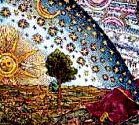
[ The following is related to Yom HaShoah, or Holocaust Memorial Day... ]
04.30.19 (Nisan 25, 5779) Since we are required to affirm and to trust that "all things work together for good" (Rom. 8:28), we must bless God for perceived evil as well as for perceived good, since all circumstances of life come from the hand of the LORD our God. Despite appearances that sometimes seem to the contrary, we believe in an all-powerful, supreme LORD who has not abandoned the world, but who actively sustains and upholds it with benevolent intent. "We walk by faith and not by sight" (2 Cor. 5:7). When bad things happen to the righteous, we trust in God's personal care for their ultimate good, despite their present troubles. As the prophet Job said: "Though he slay me, I will trust in Him" (Job 13:15). This is the heart behind the Kaddish, the mourner's prayer, that expresses acceptance of God's world, despite the pain, sorrow, loss, and so on.
The term hashgachah pratit (הַשְׁגָּחָה פְּרָטִית) refers to God's personal supervision of our lives (hashgachah means "supervision," and pratit means "individual" or "particular"). Since He is the Master of the Universe, God's supervision reaches to the smallest of details of creation - from subatomic particles to the great motions of the cosmos. God not only calls each star by its own name (Psalm 147:4), but knows each particular lily and sparrow (Matt. 6:28-30, 10:29). Each person created in the likeness of God is therefore under the direct, personal supervision of God Himself -- whether that soul is conscious of that fact or not. As Yeshua said, even the hairs on your head are all numbered (Matt. 10:30). Indeed, the God of Israel is called אלהֵי הָרוּחת לְכָל־בָּשָׂר / Elohei ha-ruchot lekhol-basar: "The God of the spirits of all flesh" (Num. 16:22), and that means He is LORD even over those who vainly attempt to suppress His Presence and reality. "Can a man hide himself in secret places so that I cannot see him? declares the LORD. Do I not fill heaven and earth?" (Jer. 23:24).
The Talmud says that when Moses asked God, "Please show me your glory" (Exod. 33:18), he was asking for God's vindication in the light of the gnawing question: "Why do the righteous suffer while the wicked prosper?" Moses was not given an explicit answer, and some of the sages said he wrote the enigmatic Book of Job to demonstrate that the question can only be reduced to God's inscrutable will: "Where were you when I laid the earth's foundation?" (Job 38:4). In other words, the question can only be answered by the One who knows the beginning from the end, the Infinite One who sees the implications and concatenation of all things. As finite beings, we see only a fraction of the big picture, and therefore we must yield our trust to the Wisdom and Power of Almighty God (Deut. 32:4).
It is written, "Your eyes saw me when I was inside the womb. All the days ordained for me were recorded in your scroll before one of them came into existence" (Psalm 139:16). In light of God's providential ordering of our lives, Blaise Pascal asked, "What is left for us but to unite our will to that of God himself, to will in him, with him, and for him the thing that he has eternally willed in us and for us." The Mishnah says it this way: "Do His will as if it was your will that He may do your will as if it was His will" (Avot 2:4). In other words, what else can we do but learn to trust, accept, and to say "yes" to life -- even if at times we may feel like orphans, lost in a fatherless world... All our days are recorded in God's scroll...
גָּלְמִי רָאוּ עֵינֶיךָ וְעַל־סִפְרְךָ כֻּלָּם יִכָּתֵבוּ
יָמִים יֻצָּרוּ וְלא אֶחָד בָּהֶם
gohl·mee · ra'·oo · ei·ney'·kha · ve·al-seef·re·kha · koo·lam · yee·ka·tei·voo
ya·meem · yoo·tza·roo · ve·lo · e·chad · ba·hem

"Your eyes saw me when I was inside the womb. All the days ordained for me
were recorded in your scroll before one of them came into existence."
(Psalm 139:16)

Therefore may God "teach us to number our days to get a heart of wisdom" (Psalm 90:12). The sages say on the day of death, one considers one's life as if it had been a single day... Life goes by so quickly, and we never know when our personal Rosh Hashanah will come. "No one knows the day or hour..." That's why it is so vital to be healed and to turn to God while there is still time. So turn to him today and bacharta ba'chayim (בָּחַרְתָּ בַּחַיִּים) - "choose life!" "For this commandment (of turning to God in teshuvah) is not hidden from you, and it is not far away. It is not in heaven... nor across the sea.... Rather, the matter is very near you - in your mouth and your heart - to do it" (Deut. 30:11-14; Rom. 10:8-13).
For more on this, see the meditation entitled "Paradox and Presence."
Humility and Love...
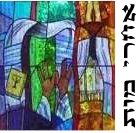
[ The following is related to our Torah reading this week, parashat Acharei Mot... ]
04.30.19 (Nisan 25, 5779) Regarding the opening verse from our Torah portion, "The LORD spoke to Moses after the death (אַחֲרֵי מוֹת) of the two sons of Aaron, when they drew near before the LORD and died" (Lev 16:1), the sages note the principle "to whom much is given, much is required" (Luke 12:48), particularly regarding service to God and living its consequence... Loving God requires both yearning for connection with him combined with a commitment to express his will in the mundane affairs of life. The sin of Aaron's sons was not that they sought closeness to God, but that their desire did not bear fruit in their practical experience. And such is the danger of those who zealously offer "strange fire" by seeking God at the expense of the lowliness of everyday experience. Some people seek for visions, signs and wonders, mystical revelations, prosperity, and so on, but they do so at the cost of their duty to make a Sanctuary for God in the midst of their everyday existence. May the LORD protect us and help us draw near to Him in the truth.
 |
Endurance and Healing...

04.29.19 (Nisan 24, 5779) Though our promised healing assuredly will come to us, it remains the prerogative of God to allow trials in our lives for our ultimate good. Faith is the key here: Steadfastly affirm your healing even in the midst of your anguish, because your suffering is a test designed to teach you to trust God and to receive the blessing apart from any empirical evidence (2 Cor. 4:18). As the Torah declares of our father Abraham: והאמן בּיהוה ויּחשׁבה לו צדקה -- "And he believed in the LORD, and He counted it to him for righteousness" (Gen. 15:6); and also of Job's faith in the midst of his agonizing struggle: הֵן יִקְטְלֵנִי לוֹ אֲיַחֵל -- "Though he slay me, I will hope in him" (Job 13:15). Sometimes all we can do is cry out to the LORD for deliverance... Our heart's cry does not question God's goodness to us, though we may silently wonder about the extent to which affliction may be used to mend our hearts. As C.S. Lewis once said, "We are not necessarily doubting that God will do the best for us; we are wondering how painful the best will turn out to be" (Letters of C.S. Lewis, 1964). There is a trust issue in suffering, and an intimacy that comes through its fires. As Kierkegaard reminds us, "It is one thing to conquer in the hardship, to overcome the hardship as one overcomes an enemy, while continuing in the idea that the hardship is one's enemy; but it is more than conquering to believe that the hardship is one's friend, that it is not the opposition but the road, is not what obstructs but what develops, is not what disheartens but ennobles" (Four Upbuilding Discourses, 1844).
The difficulty of intense personal suffering is deeply existential: how do you keep hope in the midst of this tension? "Lord I believe; help my unbelief" (Mark 9:24). How do you affirm that your heavenly Father will heal you but at the present hour you must continue to endure suffering? Do you then devise a "soul-building theodicy" to explain your struggle – providing a narrative to answer the "why" of your suffering -- or do you attempt to sanctify suffering as a means of healing others by the grace of the Messiah (Col. 1:24)? When Yeshua victoriously proclaimed, "It is finished" just before he died on the cross, he foreknew that his followers would experience a "purging process," a "refining fire," and time on the "potter's wheel" to perfect their sanctification. At the cross of Yeshua death itself was overcome – and all that it implies – and yet it is nevertheless true that we will suffer and die ourselves and that death persists an enemy (see 1 Cor. 15:26). While we celebrate the reality of the final redemption, the "instrumentality of our sanctification" needs to be willingly accepted and endured. I say "endured" here because I don't think we will ever have a complete answer to the question of "why" we undergo the various tests we face in this life. Our disposition in the midst of this ambiguity, in the midst of seemingly unanswered prayers, is where our faith is disclosed: will we despair of all temporal hope or not? Will we console ourselves with the vision of a future without tears and loss - a heaven prepared for us -- or will we resist the present darkness and seek to find deliverance in this hour? Do we trust God with our pain and submit to his will, or will we "die" inside – losing hope and despairing of all remedy?
As King David once wrote, "At an acceptable time, O God, in the abundance of your steadfast love answer me in your saving faithfulness. Deliver me from sinking in the mire; let me be delivered from my enemies and from the deep waters. Let not the flood sweep over me, or the deep swallow me up, or the pit close its mouth over me. Answer me, O LORD, for your compassion is life; in the abundance of your mercies turn to me" (Psalm 69:13-16).
עֲנֵנִי יְהוָה כִּי־טוֹב חַסְדֶּךָ
כְּרב רַחֲמֶיךָ פְּנֵה אֵלָי
a·nei'·nee · Adonai · kee-tohv · chas·de'·kha
ke·rohv · ra·cha·mey'·kha · pe·neh · e·lai

"Answer me, O LORD, for your compassion is life;
in the abundance of your mercy turn to me."
(Psalm 69:16)

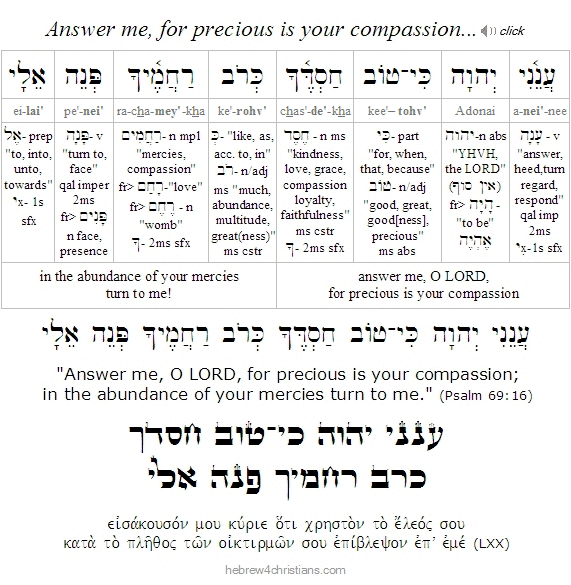
"But You, O GOD my Lord, do Thou for me for your own Name's sake; because your steadfast love is good, deliver me" (Psalm 109:21). "Do thou for me" is the confession that God alone has the power to help. Asking God to bring glory to His own Name -- to honor and magnify His Name -- is the theme of all true intercession.
Suffering has a way of focusing the heart and mind, reminding us that "today is the tomorrow of yesterday." Life is short, and our need is great to turn to the LORD and take hold His promises. We take comfort that God is for us the God of salvation: "Blessed be the Lord, who daily bears us up; God is for us our salvation. Selah. Our God is a God of salvation (יְשׁוּעָה), and to GOD, the Lord, belong deliverances from death" (Psalm 68:19-20).
הֲשִׁיבֵנוּ יְהוָה אֵלֶיךָ וְנָשׁוּבָה
חַדֵּשׁ יָמֵינוּ כְּקֶדֶם
ha·shee·vei'·noo · Adonai · e·ley'·kha · ve·na·shoo'·vah
cha·deish · ya·mey'·noo · ke·ke'·dem

"Turn us back to yourself, O LORD, and we shall be turned.
renew our days as of old"
(Lam. 5:21)

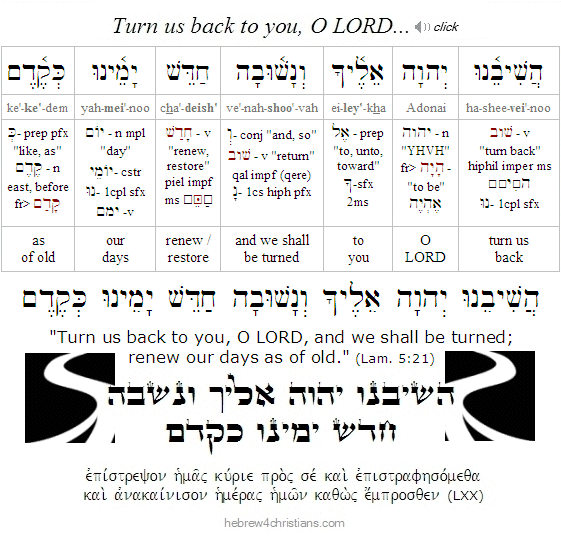
All those who are "fathered by God" conquer the world, since God imparts to us the victory of faith by means of His powerful Spirit (1 John 5:4). Therefore the heart of faith says, "In all these things [afflictions, tribulations, etc.] we are 'more than conquerors' (lit., "hyper-conquerors," i.e., ὑπερνικῶμενfromὑπέρ, "hyper" + νικάω, "to overcome") through Him that loved us (Rom. 8:37).
Let Go, Let God...

04.29.19 (Nisan 24, 5779) "Cast your burden upon the Lord, and he will sustain you" (Psalm 55:22). It is important to fully appreciate what this means. When you truly "cast your burden upon the Lord," you are insisting on peace of mind, refusing all worry, and resolving to let go of your anxieties... When you are tempted to consider trouble, when you hear the whisper of fear within, remember to cast your burden upon the Lord and he will sustain you, for "he will never permit the righteous to be moved..." But what of unutterable pain or sorrow? What if you cannot express the burden you carry? Then get alone with God and lay your soul bare: the heart has its own voice regardless of the words we are able to articulate. As it is written: בִּטְחוּ בוֹ בְכָל־עֵת - "Trust in him at all times… pour out your heart before him; God is a refuge for us" (Psalm 62:8). Let not your heart be troubled; be anxious for nothing; believe that God cares for you (Psalm 42:5; 1 Pet. 5:7). "Cast your burden upon the LORD and He will sustain you; he will never permit the righteous to be moved."
הַשְׁלֵךְ עַל־יְהוָה יְהָבְךָ
וְהוּא יְכַלְכְּלֶךָ
לא־יִתֵּן לְעוֹלָם מוֹט לַצַּדִּיק
hash·leikh · al-Adonai · ye·hahv·khah
ve·hoo · ye·khal·ke·le·khah
loh · yeet·tein · le·oh·lahm · moht · la·tza·deek

"Cast your burden on the LORD,
and He will sustain you;
He will never permit the righteous to be moved."
(Psalm 55:22)

Hebrew Study Card
The Goat of God...

04.29.19 (Nisan 24, 5779) Our Torah reading this week (Acharei Mot) explains the Yom Kippur (Day of Atonement) ritual, and while many people are familiar with the Biblical imagery of Messiah as "the Lamb of God" (שֵׂה הָאֱלהִים) who takes away the sins of the world (John 1:29), it is nonetheless true that he is also depicted as "the Goat of God" (עֵז הַאֱלהִים) who purifies us from iniquity by offering his blood for our everlasting atonement... As the "Lamb of God" Yeshua provides redemption from slavery to Satan and freedom from the wrath of God. By means of his shed blood and broken body, the plague of death passes over us and we are set free to serve God (this is the Passover connection). As the "Goat of God," Yeshua provides both personal cleansing (i.e., "atonement" for sin: the Greek word (ἱλαστήριον) is used in the LXX for the kapporet (i.e., mercy seat) in the Holy of Holies that was sprinkled with the blood of the sacrifice on Yom Kippur) as our personal Mediator before the Father, as well as corporate cleansing for ethnic Israel at the end of the Great Tribulation period. At that time Yeshua will function as Israel's true High Priest whose sacrifice is applied for Israel's purification, and so "all Israel shall be saved" (this is the Yom Kippur connection).
Note: For more on this see, "Yom Kippur and the Gospel" and "Behold, the Goat of God."
 |
Love and Reproof...
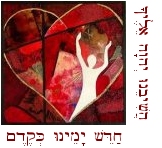
[ The following is related to our Torah reading this week, parashat Acharei Mot... ]
04.29.19 (Nisan 24, 5779) In our Torah portion this week there is a wonderful verse (Lev. 16:16) which states that the LORD "dwells with them in the midst of their contamination" (הַשּׁכֵן אִתָּם בְּתוֹךְ טֻמְאתָם). Even though the people were unclean (i.e., defiled by sin and tumah), the Divine Presence was not removed and the means for reconciliation were provided... Aren't you glad that the love of God doesn't "stop there" (i.e., with a verdict about our sinful condition) but goes beyond the offense to provide remedy and hope?
Yeshua said, "Where two or three are gathered in my name, there I AM in the midst of them" (Matt. 18:20). This is expressed by the Hebrew word for love (i.e., ahavah: אהבה), the gematria of which is thirteen, but when shared with another is multiplied: 13 x 2 = 26 -- the same value for the name of the LORD (יהוה). The commandment, "you shall love your neighbor as yourself" (וְאָהַבְתָּ לְרֵעֲךָ כָּמוֹךָ) thus awakens in the other the same kind of love for you -- and the result will be a "double love" -- or the love of God (אַהֲבַת הָאֱלהִים). Of course this isn't easy, but immediately after giving the commandment, God declares: "I AM the LORD" (אֲנִי יְהוָה), which the sages traditionally interpret to mean, "I, the LORD, will help you fulfill this commandment if you sincerely wish to do so."
For more on this topic, see the Torah article "Love and Reproof."
 |
Meaning in Suffering...

04.29.19 (Nisan 24, 5779) It has been noted that the survivors of the concentration camps were not necessarily the physically strongest, but they were people able to find meaning in their suffering and who never lost sight of hope. As survivor Viktor Frankl once said, "In some ways suffering ceases to be suffering at the moment it finds a meaning, such as the meaning of a sacrifice" (Frankl: Man's Search for Meaning). In light of this, let's resolve now to live each day full of concentrated hope - full of conviction - that even should this be the last day of our earthly existence, we will stand for God, we will hold on to the truth of God's salvation, and we will die in the everlasting hope of God's victorious love.
We who lived in concentration camps can remember the men who walked through the huts comforting others, giving away their last piece of bread. They may have been few in number, but they offer sufficient proof that everything can be taken from a man but one thing: the last of the human freedoms -- to choose one's attitude in any given set of circumstances, to choose one's own way...
Ultimately, man should not ask what the meaning of his life is, but rather he must recognize that it is he who is asked. In a word, each man is questioned by life; and he can only answer to life by answering for his own life; to life he can only respond by being responsible. - Viktor E. Frankl
Holocaust Memorial Day...
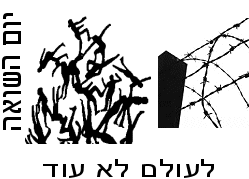
[ Yom HaShoah begins Wednesday May 1st (at sundown) and runs through the following day. ]
04.28.19 (Nisan 23, 5779) Shoah (שואה) is the Hebrew word for "ruin" or "destruction" and is another name used to refer to the European Holocaust, when six million Jews - including one and a half million children - were systematically murdered by the Nazis during World War II. After much impassioned debate, in 1953 the Israeli Knesset designated Nisan 27 as Yom HaShoah (יוֹם הַשּׁוֹאַה), or Holocaust Remembrance Day.
During this day, in Israel, a morning siren sounds, all activity stops, and people stand in honor of those who died during the atrocities of those years. Jews around the world hold memorials and vigils, often lighting six candles in honor of the six million Holocaust victims. Many hold name-reading ceremonies to memorialize those who were murdered during the atrocities. !לעולם לא עוד - le'olam lo od: "Never Again!" This year, Yom HaShoah begins Wednesday, May 1st at sundown and runs through the following day.
"You may know that the last few nights have been bad... Those who had been bombed out came to me the next morning for a bit of comfort. But I am afraid I am bad at comforting; I can listen all right, but I can hardly find anything to say. But it seems to me more important to share someone's distress than to offer smooth words about it... I've no sympathy with some wrong-headed attempts to explain away distress, because instead of being comfort, they are the exact opposite. So I don't try to explain it, and I think that is the right way to begin, though it's only a beginning, and I very seldom get beyond it. I sometimes think that real comfort must break in just as unexpectedly as the distress." - Dietrich Bonhoeffer (martyred April 9, 1945, at the Flossenbürg concentration camp)
About the Armenian Genocide...
I realize that Yom HaShoah (i.e., Holocaust Remembrance Day) is observed this week, but I would be remiss not to mention an earlier genocide of Christians -- mostly Armenians but also Assyrians and Greeks -- that took place under the Islamic Ottoman Empire, throughout World War I, where the Turks systematically massacred approximately 1.5 million Armenians, 300,000 Assyrians, and 750,000 Greeks. Today April 24th is recognized (by some) as "Armenian Genocide Remembrance Day." In Yerevan, the capital of Armenia, hundreds of thousands of people walk to the Tsitsernakaberd Genocide Memorial to lay flowers at the eternal flame. For more see the links listed below.
Parashat Acharei Mot...

04.28.19 (Nisan 23, 5779) Our Torah for this week is called Acharei Mot (אַחֲרֵי מוֹת). This portion transitions from the preceding readings regarding ritual purity (tahora) to recall the tragic incident of Nadab and Abihu, the two sons of Aaron who were killed when they offered "strange fire" upon the Altar of Incense during the dedication of the Tabernacle (see Lev. 10:1-2). Because these priests came close to the Holy of Holies in an incorrect manner, the LORD further commanded Moses to instruct Aaron that he should enter the innermost chamber only in a carefully prescribed manner once a year - on the tenth day of the seventh month - during the sacred time called Yom Kippur (i.e., the "Day of Atonement").
On this most solemn day, Aaron was commanded to immerse himself in a mikveh (pool of fresh water) and to dress in all-white linen. He then was instructed to slaughter a bull as a personal sin offering. Aaron then brought some ketoret (incense) to burn within the Holy of Holies before returning to sprinkle the blood of the sin offering seven times before the Ark of the Covenant (i.e., the kapporet or "Mercy Seat"). Aaron repeated this procedure using the blood of one of two goats that was selected (by lot) to be slaughtered as a sin offering on behalf of the people. After this, Aaron took more of the sacrificial blood and purified the Altar of Incense and the other furnishings of the Tabernacle. Later, the fat of these sacrifices was burned on the Copper Altar in the courtyard, though the hide and the flesh were to be entirely burned outside the camp.
After purifying the Tabernacle, Aaron went to the gate of the courtyard and laid both hands upon the head of the other goat (designated "for Azazel," a name for the accusing angel) while confessing all of the sins and transgressions of the people. This "scapegoat" was not slaughtered, however, but was driven away into the wilderness, carrying "all their iniquities unto a land not inhabited." Finally, Aaron returned to the Tent, washed and changed his clothes, and offered two more burnt offerings – one for himself and one for the people – to complete the purification process.
This elaborate ritual was ordained to be a decree for Israel, and the day of Yom Kippur was to be observed every year as a time of "affliction and mourning" for all the people. The portion ends with further instructions about making sacrifices, including the prohibition against offering sacrifices apart from the rites of the Tabernacle. The consumption of blood is explicitly forbidden, since blood was reserved for sacrificial purposes upon the altar.
The Torah of Love...
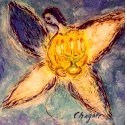
04.26.19 (Nisan 21, 5779) "Whoever has my commandments and keeps them, this is the one who loves me (הַמַּחֲזִיק בְּמִצְווֹתַי וְשׁוֹמֵר אוֹתָן הוּא הָאוֹהֵב אוֹתִי). And the one who loves me will be loved by my Father, and I will love him and will manifest myself to him" (John 14:21). Note that the Greek word translated "manifest" means to "shine inside" (i.e., ἐμφανίζω, from ἐν, "in" and φαίνω, "shine"), indicating that the revelation would be inward light of the Presence of Messiah himself (Χριστὸς ἐν ὑμῖν, ἡ ἐλπὶς τῆς δόξης, Col. 1:27). As we receive God's love, as we embrace it as our own, the love of Messiah will become visible to you. This comes from a place of inward surrender. As Paul Tillich said, "Sometimes in a moment of weakness light breaks into darkness, and it is as though a voice says, 'You are accepted; you are accepted... Do not seek for anything; do not perform anything; do not intend anything. Simply accept the fact that you are accepted.' If that happens to you, then you experience grace, and everything will be transformed."
Note: I've been troubled with eye problems and other health-related concerns this past week; thank you for your prayers for Hebrew for Christians... Shabbat Pesach Sameach chaverim!
The Last Word of Truth...

04.26.19 (Nisan 21, 5779) Though people assume they are "free to believe" whatever they want about the meaning and purpose of life, Ultimate Reality will always have the last word... Our Scriptures clearly teach that people ignore God at their own peril, and that we are therefore responsible to believe the truth and to reject what is false (1 John 4:6). This implies that we have a moral and spiritual duty to think clearly and not abuse our minds (Phil. 4:8; Rom. 12:2). God made us so that we could discern truth about reality. The mind functions according to logical laws because it is made in the image and likeness of God Himself... God Himself is the ground of all logic, since He created reality and structured the world to be knowable according to its laws. As it is written: "In the beginning was the word/logic (ὁ λόγος), and the λόγος was with God, and the λόγος was God" (John 1:1). God created a world that exhibits order and great beauty. And since human beings were created b'tzelem Elohim (בצלם אלוהים), in the image of God, our thoughts (and the words used to formulate our thoughts) as well as our actions are intended to exhibit order and beauty. It is written in our Scriptures that people perish because "they refuse to love the truth and so be saved" (2 Thess. 2:10-12). Therefore the issue of truth - physical, moral, aesthetic, spiritual, etc. - is central to salvation itself...
No one "invented" the laws of logic, but logical inference is presupposed in any form of declarative utterance (the denial of this axiom is self-stultifying and self-refuting). Since therefore the use of language presupposes the truth and validity of logic, every utterance we make is grounded in transcendental (i.e., non-empirical, intuitional, revelatory) meaning and significance (Psalm 19:2-3). In the world to come you will be shocked to understand that everything you thought, everything you said, and everything you did was given to you from above, and therefore has tremendous significance. "Let the words of my mouth and the meditation of my heart be acceptable in your sight, O LORD, my Rock and my Redeemer."
yee·he·yoo · le·rah·tzohn · eem·rei · fee · ve·heg·yohn · leeb·bee · le·fah·ney·khah
Adonai · tzoo·ree · ve·goh·a·lee

"Let the words of my mouth and the meditation of my heart be acceptable to You,
O LORD, my Rock and my Redeemer" (Psalm 19:14).

Hebrew Study Card
May it please God to help us use our words for the purpose of strengthening and upbuilding (οἰκοδομὴν) one another (Eph. 4:29). May our words always be gracious and "seasoned with salt" (Col. 4:6). Dear Lord, awaken our hearts. As it is written: "Whoever keeps His word, in him truly the love of God is perfected" (1 John 2:5).
Happy Passover and Shabbat Shalom, dear friends!
The LORD my Yeshua...

04.26.19 (Nisan 21, 5779) As we draw close to God and cleave to his heart, we will be delivered from the pain of our fears. The LORD becomes our Light and our Salvation, illuminating our steps despite the darkness and evil of olam ha'zeh, this present age (Psalm 119:105). As King David said, Adonai ori v'yishi: "The LORD is my light and my salvation" – literally, "my Jesus," my Yeshua – "whom shall I fear? The LORD is the refuge of my life, of whom shall I be afraid?" (Psalm 27:1). Yeshua is the Light of Life (אוֹר הַחַיִּים), the Healer of the fearful heart, the I-AM-WITH-YOU-ALWAYS One. His love overcomes all our fears. As the apostle Paul asked, "If God is for us, who can be against us?" (Rom. 8:31).
And as we hear the "footsteps of the Messiah" approaching nearer, let us heed the words of our Savior: "when you see these things taking place, you know that the time is near, right at the door" (Mark 13:29), and let us then encourage one another to wake up and come alive: "Awake, O sleeper, and arise from the dead, and Messiah will shine on you!" (Eph. 5:14). The message of teshuvah (repentance, "turning back to God") is always, "Wake up - you are living a nightmare." There is only one remedy, and that is discovered by coming to the Divine Light by opening your heart to the love and very real presence of God.
יְהוָה אוֹרִי וְיִשְׁעִי מִמִּי אִירָא
יְהוָה מָעוֹז־חַיַּי מִמִּי אֶפְחָ
Adonai o·ri ve·yish·i, mi·mi i·ra
Adonai ma·oz chai·yai, mi·mi ef·chad

"The LORD is my light and my salvation; whom shall I fear?
The LORD is the stronghold of my life; of whom shall I be afraid?"
(Psalm 27:1)

Download Study Card
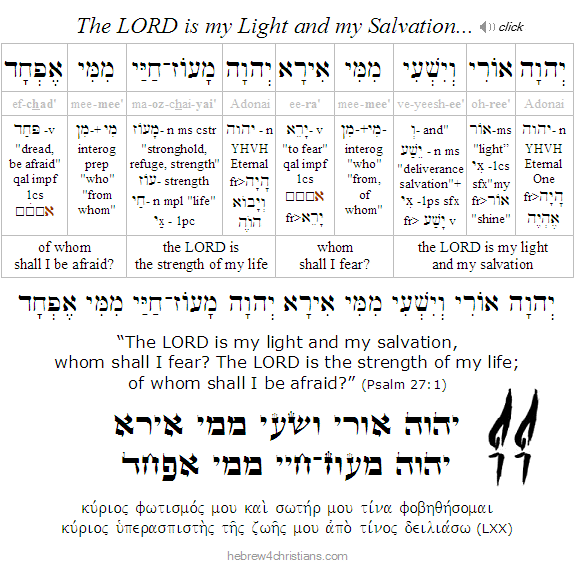
Revelation and Desire...

[ "Nothing is hidden that will not be made manifest, nothing is secret that will not be known and come to light. Take care then how you hear, for to the one who has, more will be given, and from the one who has not, even what he thinks that he has will be taken away" (Luke 8:18-19). ]
04.25.19 (Nisan 20, 5779) It might seem paradoxical, but our underlying motives are sometimes hidden from ourselves so that we are unaware of how we are being controlled by them. For example, if we are gripped by an unacknowledged hunger to find approval and validation from other people, we may often lose sight of God Himself (Gal. 1:10). The enemy within is usually in hiding, and we need special wisdom from God not to be ruled by fear, anger, and so on. It has been said that "we are only as sick as the secrets we keep," though the secrets we keep from ourselves are surely the most dangerous.
"If your enemy is hungry, give him bread to eat, and if he is thirsty, give him water to drink, for you will heap burning coals on his head, and the LORD will reward you" (Prov. 25:21-22). Some of the sages have said that the "enemy" here refers to the yetzer hara, the "evil impulse," and that by proactively attending to the inner emptiness and neediness we sometimes feel - by feeding ourselves the "bread of Torah" and the "water of the Spirit" - we will overcome the evil with good (Rom. 12:21). If you feel yourself lacking, the evil impulse will offer to fill the void. The only defense against inner emptiness is to be filled with the Spirit of God. Study the truth of Scripture, pray, develop hakarat hatov (gratitude), and perform acts of gemilut chassidim. Again, overcome the evil impulse with good. The LORD will see to it that your cup will overflow in the presence of your enemy (Psalm 23:5). Thus it is written, "From my enemies You teach me wisdom in doing your commandments" (Psalm 119:98), meaning that the yetzer hara can teach us if we submit to God's will... Therefore Yeshua said, "Be wise as serpents but harmless as doves" (Matt. 10:16).
The essence of sin is unbelief. Sin is not so much disobedience to an external code of behavior as much as it is abandoning your trust, your identity, and your hope as a beloved child of God. As you believe so you will behave, and as you behave so you believe... Therefore one of the greatest of sins is to forget the truth of who you really are – a prince or princess of God! The great temptation of sin is rooted in the lie that we are unworthy people, that God does not really loves us (just the way we are), that He is disappointed in us, and so on. This insightful quote by the late Henri Nouwen speaks to my heart:
Over the years, I have come to realize that the greatest trap in our life is not success, popularity, or power, but self-rejection.... Success, popularity, and power can indeed present a great temptation, but their seductive quality often comes from the way they are part of the much larger temptation to self-rejection. When we have come to believe in the voices that call us worthless and unlovable, then success, popularity, and power are easily perceived as attractive solutions. The real trap, however, is self-rejection. As soon as someone accuses me or criticizes me, as soon as I am rejected, left alone, or abandoned, I find myself thinking, "Well, that proves once again that I am a nobody." ... [My dark side says,] I am no good... I deserve to be pushed aside, forgotten, rejected, and abandoned. Self-rejection is the greatest enemy of the spiritual life because it contradicts the sacred voice that calls us the "Beloved." Being the Beloved constitutes the core truth of our existence."
Ultimately sin seduces people to destroy themselves, since it first of all seeks to disown, impugn, and reject what is most important for spiritual life. The devil seeks to murder and destroy all that we need to be eternally healed... And though we might want to escape from this conflict (or to pretend that it's not really here), the battle is intractably real and must be fully engaged until our redemption is complete (1 Pet. 5:8-9). Meanwhile, spiritual struggles can be downright ugly. Would any one deny that the cross of Messiah was a sacred space - and yet it was precisely from there, from the place of blood and suffering and pain and terror, that the grace, beauty, and strength of God for us would shine forth.
To effectively combat the devil, let us first of all pray to the LORD God Almighty and ask for His power, wisdom, and grace to deal with the evil one's devices and strategies used against us (Eph. 6:11-18; Rom. 13:12, 1 Thess. 5:8; 2 Cor. 10:4-5). Since we are not to be ignorant of the devil and his devices (2 Cor. 2:11), let us particularly ask God to remind us how much he loves us and to emphatically realize his heart for our lives... Let's further ask God to teach us who we really are and to give us the power of the Holy Spirit to walk in the truth of our sacred identity. Let's ask God to help us practically apply the victory given to us in the resurrection of Yeshua. With God's help, may we be bold to take our place at His banqueting table, assured that we are indeed His dear children. Shalom.
The Appointed Times...

[ Happy Passover, dear friends... ]
04.24.19 (Nisan 19, 5779) The "appointed times" (i.e., mo'edim: מוֹעֲדִים) were given by God to help us turn away from the omnipresent urge within the human heart to embrace vanity: "Every one of you shall revere his mother and his father and guard (שָׁמַר) my Sabbaths (שַׁבְּתתַי)... Do not turn to worthlessness (i.e., אֱלִיל) or make for yourselves any molten gods" (Lev. 19:3-4). In other words, the Biblical holidays such as Passover were intended to help us to sanctify ("set apart," "make holy") the times and seasons in order to remind us of the Divine Presence (Psalm 104:19). Therefore they are called mikra'ei kodesh (מִקְרָאֵי קדֶשׁ), "times in which holiness is proclaimed" (Lev. 23:2). The Torah's declaration that these days are holy implies that they are set apart for special activities, such as commemorating God as our Creator (Shabbat), our Redeemer (Passover), our Resurrection (Firstfruits), our Law Giver (Shavuot), our King (Rosh Hashanah), our High Priest (Yom Kippur), our Shelter (Sukkot), and so on. In this connection it should be noted that it is a mistake to assume that the divine calendar was somehow abrogated with the cross of Yeshua, since all of the Jewish holidays center on Him, and indeed the advent of the promised Ruach Ha-Kodesh (Holy Spirit) occurred precisely after the prescribed 49 day countdown to Shavuot (Acts 1:8; 2:1-4), that is, after Yeshua was raised from the dead...
Presently our lives "suspended" between two worlds - this phenomenal world with its illusions (olam hazeh), and the real world of spiritual substance and meaning (olam haba). We exist in an "already-not-yet" state of expectation and yearning where we must consciously mediate the truth of heaven by bringing it "down to earth." This is a truth war, and by truth I do not mean intellectual knowledge as much as the living truth that marks the lifestyle and vision of a follower of Messiah. We consciously remember Torah truth; we choose to always "set the LORD before us," and take "every thought captive to the passion of Messiah..." May God help us heed the call to walk in holiness by the power of His love and grace. Amen.
Suffering and Deliverance...
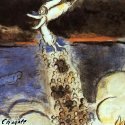
04.24.19 (Nisan 19, 5779) Sometimes suffering does not come from the lack of faith, but in the midst of faith, or even because of faith, since the LORD often uses affliction as the means of upbuilding the soul and developing spiritual resilience and maturity (Prov. 3:1-2). In light of God's sovereign power over all things, and God's great love for you, regard your suffering a gift from your heavenly Father to help you grow (Job 5:17; Psalm 94:12; 119:71). Persevering in the midst of your struggle develops patience and humility, teaching you to know your own nothingness and to utterly rely upon the goodness and mercy of God. Over time, suffering strips away your illusions, so that nothing remains except the naked heart and the treasures of faith. Only then does the heart find its blessing in God alone.
People tend to believe whatever they want to believe until they are faced with reality, and therefore God orchestrates tests and challenges to awaken people from their illusions and to help them realize their need for deliverance. Such afflictions are called the "troubles of love" (יִסּוּרֵי אַהֲבָה). Thus we read in the Torah how the people groaned because of their slavery and then cried out to heaven for help: "And God heard their groaning; he remembered his covenant ... and God saw the people of Israel, and God knew" (Exod. 2:24-25). God knows our profound need for Him. Affliction teaches us that wishful thinking is unable to sustain the weight of reality, and only God Himself can truly save us...
I am amazed that pagans cling to the idea that their lives have real value despite their rejection of transcendent worth and beauty and goodness as revealed in the Jewish Scriptures. Their everyday assumptions are stolen from the Judeo-Christian tradition, yet their underlying logical and semantic foundation is quite simply an illusion…. I'd like to listen to them justify the reason for getting out of bed in the morning using just the language that is entailed by their metaphysical assumptions. If seriously questioned, especially in light of the traction of their own personal heartache and disappointments, it is doubtless that they, like Nietzsche, would find themselves going insane as they attempt to (re)define the most meaningful aspects of life....
Where it is written, "The troubles of my heart are enlarged; bring me out of my distresses" (Psalm 25:17), we understand that it is God who hems us in and limits us (the word "troubles" (צָרוֹת) derives from a root (צַר) that means to limit or constrict), for the purpose of "bringing us out" of our distresses, just as God brought our ancestors out of "Egypt" (i.e., from mitzrayim: -מ, "from," and צַר, "narrow places") so they could experience freedom and newness of life.. The first step of lasting deliverance (יְשׁוּעָה) is to believe the revelation: "I AM the Lord your God," which begins the healing (Exod. 20:2). We are then set free from our bonds to surface appearances as we trust in God's Presence, since we now understand everything in relationship with the sacred Ground and Source of all life (Acts 17:28).
Regarding the cry of the heart: "How long shall I take counsel in my soul, having sorrow in my heart daily" (Psalm 13:2), the sages remark that just as long as we take counsel in our own soul there will be despair, since only after we realize that no further counsel can help us do we give up and confess our need for God's salvation. Therefore deliverance comes as we trust in the LORD with all our heart, and do not lean on our own understanding (Prov. 3:5).
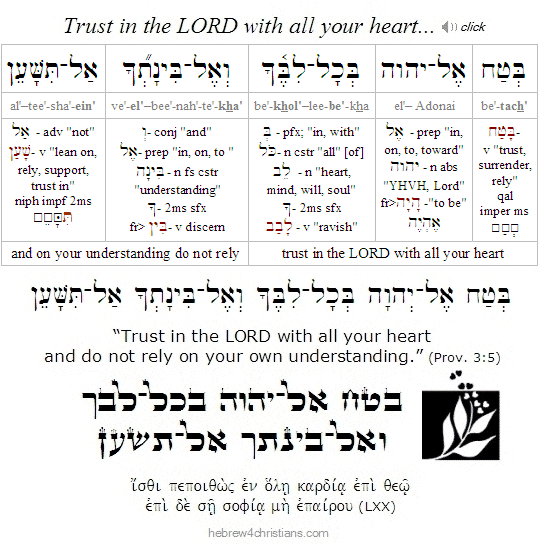 |
Turning as a Child...
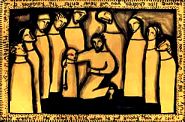
04.24.19 (Nisan 19, 5779) There is no teshuvah apart from humility (Matt. 5:5). The disciples of Yeshua came asking, "Who is the greatest in the kingdom of heaven?" And calling to him a child, he put him in the midst of them and said, "Truly, I say to you, unless you turn (shuv) and become like children (להְיוֹת כַּיְלָדִים), you will never enter the kingdom of heaven" (Matt. 18:2-3). Said the Kotzer Rebbe, "It is proper to weep during the holy days in order to show that despite all our seeming wisdom and learning, we are as helpless as little children who weep for what they desire." "I thank you, Father, Lord of heaven and earth, that you have hidden these things from the wise and understanding and revealed them to little children; yes, Father, for such was your gracious will" (Matt 11:25-26).
The late Henri Nouwen wrote, "I am beginning to see that much of praying is grieving." Contrition, grief, and regret for our sins is at the heart of genuine teshuvah. Crying is a expression of utter humility, helplessness, and need. In this life we weep over many things, but we inwardly cry for our Abba, our heavenly Father's love...
Passover's Love Song...

04.23.19 (Nisan 18, 5779) During Passover week it is customary to read the ancient "love song" of King Solomon called Shir Ha-Shirim (שִׁיר הַשִּׁירִים), or the "Song of Songs." In Jewish tradition, since Passover marks the time when our "romance" with God officially began, the sages chose this song to celebrate God's love for his people. And since Passover is also called Chag Ha-Aviv, the festival of spring, the Song is also associated with creativity and hope associated with springtime (Song 2:11-12). One way to read this poem is to see the king, who had disguised himself as a lowly shepherd to win the heart of the Shulamite woman, as a picture of Yeshua who took the form of a lowly servant to demonstrate his eternal love for those who are trusting in him... Indeed, the Song of Songs is linked to the "lilies" (i.e., shoshanim: שׁשַׁנִּים) mentioned in Psalm 45, which presents a Messianic vision of the Divine Bridegroom and offers an "ode" for a forthcoming wedding.
אֲנִי לְדוֹדִי וְדוֹדִי לִי
הָרעֶה בַּשׁוֹשַׁנִּים
a·nee · lei·doh·dee · vei·doh·dee · lee
hah·roh·eh · ba·shoh·sha·neem

"I am my beloved's and my beloved is mine;
he pastures among the lilies."
(Song 6:3)
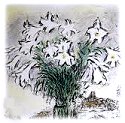
Download Study Card
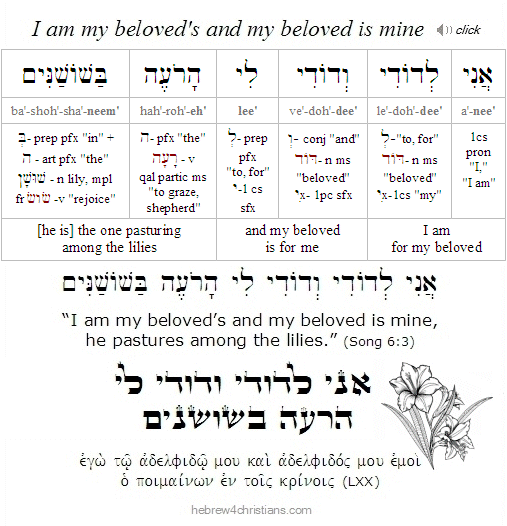
The meaning of Passover is of course rooted in the greatest love story ever told - about God, creation, the loss of Adam and Eve, the call of Israel, and the coming of the Messiah who would sanctify us as His own people, deliver us from the plague of death, and redeem us from the penalty of sin. Yeshua's mesirat nefesh ("giving over of soul" in sacrifice) and his triumph at the cross made the new covenant with God possible. As our Suffering Servant, He gave up His life for ours in exchange, redeeming us from the sickness unto death and making the way for our everlasting healing.
Whether or not you were able to attend a Passover Seder this year, please understand that there is always a place for you at His table. After all, Yeshua made a place for you within His heart when he died for you on the cross, and that is what Passover is really all about anyway. And for more on the connection between Passover and the Song of Songs, see the article "Shir Hashirim: Passover and the Song of Solomon."
 |
Personal Note: Shalom dear friends. I have been dealing with an ongoing eye issue that is causing me constant discomfort, distraction, and irritation, especially while reading... I have prayed many times for relief and have tried some of the usual home remedies including gently washing the eye, using colloidal silver drops, allergy eye drops, soaking the eye with a warm wash cloth (or a tea bag), and so on, but the irritation continues. Please offer a prayer for my healing, friends; I really appreciate your help. Thank you so much, and Happy Passover!
Passover Seder Pictures...
04.23.19 (Nisan 18, 5779) Happy Passover, dear friends! We held our annual Passover Seder at our home last Friday evening and enjoyed a wonderful and meaningful time together. We started the seder before sundown and ended about one on the morning. My son Judah helped set up the seder tables and sang the mah nishtanah (the "Four Questions"). I was unable to take many photos of the occasion, but here are a few (there are others on the Hebrew for Christians Facebook page).
[Left-to-right, top]: 1) Olga lights the candles; 2) Judah at the table; 3) washing hands;
4) Vadim and Yasha eat karpas; 5) the three matzot we use for the seder.
[Left-to-right, middle]: 1) Emanuel David; 2) the seder table; 3) kiddush for Passover;
4) the Passover plate (kera'ah); 5) John breaking the middle matzah.
[Left-to-right, bottom]: 1) quick family shot; 2) Vadim and Irina at the Seder.

The Great War for Souls...

[ "For our struggle is against spiritual forces of evil..." Eph. 6:12 ]
04.22.19 (Nisan 17, 5779) Ultimately we are living in the midst of a great spiritual war -- the war for truth. This has been the battle from the beginning. The very first recorded words of Satan (הַנָּחָשׁ) questioned God's truth: "Did God really say...?" (Gen. 3:1). In the end there will be found two types of people: those who love the truth and those who love the lie. These are the children of light (בְּנֵי הָאוֹר) and the children of darkness (בְּנֵי הַחשֶׁךְ), respectively. Followers of Yeshua the Messiah are told to "walk as children of light" / ὡς τέκνα φωτὸς περιπατεῖτε (Eph. 5:8). The children of light are called to be am kadosh - a holy people - separate from the evil engendered by the fallen world and its forces, just as the very first creative expression of God was the separation of light from darkness (Gen. 1:3-4). The children of light "hate evil and love the good," and conversely, the children of darkness "hate the good and love evil" (Psalm 34:21, Prov. 8:13, Amos 5:15, John 3:20-21). Regarding the heavenly Zion to come, it is written: "nothing unclean will ever enter into it, nor anyone who does what is detestable or practices falsehood (lit. "makes a lie"), but only those whose names are written in the Lamb's book of life" (Rev. 21:27).
We must stand for the truth, because the truth is what sets us free (John 8:32). As Yeshua said, "For this purpose I was born and for this purpose I have come into the world -- to testify to the truth. Everyone who is of the truth listens to my voice" (John 18:37). We must turn away from the lie to embrace the truth. One day all that is hidden will become manifest. "As I looked, thrones were placed, and the Ancient of Days took his seat; his clothing was white as snow, and the hair of his head like pure wool; His throne was ablaze with fire and its wheels were all aflame. A river of fire was streaming forth and proceeding from his presence; a thousand thousands served him, and ten thousand times ten thousand stood before him; court sat in judgment, the books were opened" (Dan. 7:9-10).
If the devil can't kill you, he will try to make you insane... He will lie to you about who you really are... He he will attempt harass you and vex your soul. He will whisper fearful things in your ear... He will make what is small seem big and what is big seem small. He will raise dark suspicion within your soul, causing you to walk in mistrust. He will remind you of your sins to make you feel ashamed and dirty. He will hiss that you are unlovable and unworthy. He will argue on behalf of your flesh that you deserve better than this... He will tempt you to seek relief in cisterns of emptiness and futility. Most of all, he will try to cast a spell to make you forget that you are truly a prince or princess of God Almighty... The devil seeks to drive you into the exile of loneliness and despair. Resist him in the Name of the LORD!
נָסוּ וְאֵין־רדֵף רָשָׁע
וְצַדִּיקִים כִּכְפִיר יִבְטָח
na·soo · ve'ein · roh·deif · ra·shah
ve·tza·dee·keem · keekh·feer · yeev·tach

"The wicked flee when there is no one pursues,
but the righteous are as confident as a lion."
(Prov. 28:1)

Hebrew Study Card
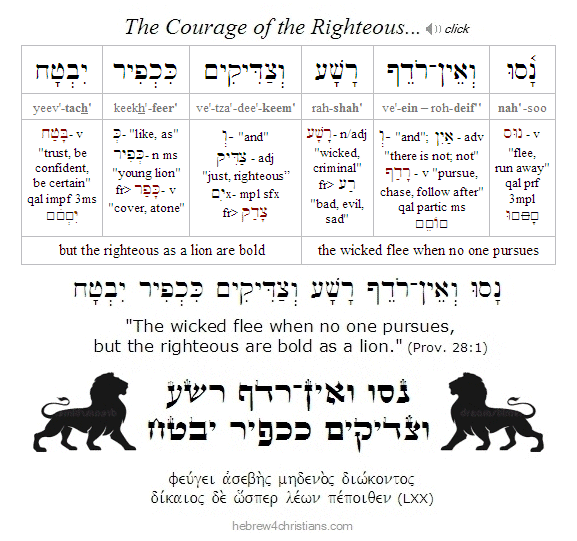
Countdown to Shavuot...

[ Right after Passover we are instructed to count 49 days until the holiday of Pentecost... ]
04.22.19 (Nisan 17, 5779) In the Torah we are instructed to count forty nine days – seven weeks of days – from the day following Passover until Shavuot (i.e., Weeks or "Pentecost"): שִׁבְעָה שָׁבֻעת תִּסְפָּר־לָךְ (Deut. 16:9). This period of time is called Sefirat HaOmer (סְפִירַת הָעוֹמֶר), or the "counting the [barley] sheaves" (Lev. 23:15-16). In abstract terms, it's as if there is a dotted line pointing directly from Passover to Shavuot - a "Jubilee" of days - representing the climax of Passover itself. The early sages identified this climax as the revelation of the Torah at Sinai, but the New Testament identifies it as the outpouring of the Holy Spirit (רוּחַ הַקּדֶשׁ) that ratified the reality of the New Covenant of God. The redemption process that began at Passover was therefore completed at Shavuot, and that "completion" was the revelation of God's love and deliverance for the entire world. And though the Jewish sages did not fathom the use of the otherwise forbidden leaven in the offering (see Eph. 2:14). The countdown to Shavuot therefore goes beyond the giving of Torah at Sinai and points to the greater revelation of Zion. Shavuot is the fulfillment of the promise of the Holy Spirit's advent to those who are trusting in Messiah (Acts 2:1-4). "Counting the Omer," then, is about receiving the Holy Spirit to experience and know the resurrected LORD of Glory. You can "count" on that, chaverim!
From a Messianic point of view, it is important to understand that the climax of the 49 days was not the giving of the law at Sinai (i.e., matan Torah), but rather the revelation of the altar (i.e., the"Tabernacle") and its subsequent fulfillment in the sacrificial death of Yeshua as our Lamb of God. Moreover, it was during this time that Yeshua made His post-resurrection appearances to His disciples - and indeed ascended to heaven during this 49 day period... Of particular importance is the climactic holiday of Shavuot, day 7x7 of the count, when the Holy Spirit (Ruach ha-Kodesh) was given to the disciples in fulfillment of the promise of Yeshua that we would not be left comfortless. Shavuot, then, marks the time of "Jubilee" of the Spirit, when are clothed with power from on high to serve the LORD without fear...
For more on this subject, see: "Sefirat HaOmer: Counting the Sheaves to Shavuot."
Life Triumphs over Death...

04.22.19 (Nisan 17, 5779) The Scriptures make clear that Yeshua is the true Passover Lamb of God (שֵׂה הָאֱלהִים) whose sacrificial death and shed blood causes the wrath of God to "pass over" (pasach) those who are trusting in Him (John 1:29, 3:36; Acts 8:32-36; 1 Cor. 5:7-8; 1 Pet. 1:18-20, etc.). Amen! Worthy is the Lamb who was slain! (Rev. 5:12). But while the sacrifice of Yeshua gives us forgiveness (סְלִיחָה) and atonement (כַּפָּרָה) with God (Eph. 1:7; Rom. 5:11; Heb. 9:12, etc.), the resurrection of the Messiah (i.e., techiyat ha-Mashiach: תְּחִיַּת הַמָּשִׁיחַ) justifies His work of salvation on behalf of the sinner and forever vindicates the righteousness of God (Rom. 4:20-5:1; Rom. 10:9; Heb. 13:20-21). As Yeshua said: "I am he that lives but was dead; but behold, I am alive for evermore (הִנֵּה אֲנִי חַי לְעוֹלָם וָעֶד), Amen; and have the keys of hell and of death" (Rev. 1:8). Rejoice friends, for our LORD lives! He has killed the power of death and forever reigns in indestructible life!
חַי־יְהוָה וּבָרוּךְ צוּרִי
וְיָרוּם אֱלוֹהֵי יִשְׁעִי
chai-Adonai · oo'va·rookh · tzoo·ree
ve'ya·room · E·lo·hei · yeesh·ee

"The LORD lives, and blessed be my rock,
and exalted is the God of my salvation!"
(Psalm 18:46)

Hebrew Study Card
The heart of faith sees Elohei Yishi (אֱלהֵי יִשְׁעִי), the "God of my salvation," namely, the One who was and is and is to come (הַהוֶה וְהָיָה וְיָבוֹא) – the LORD our God Yeshua (Rev. 1:4;8; Isa 41:4). The early Christian theologian Augustine of Hippo (354-430 AD) rendered Elohei Yishi as "God my Jesus," since "Jesus" (i.e., Yeshua) rightly means YHVH saves. Yeshua is the One who breathed life into the first Adam just as He is the One who breathes eternal life into those who are descended from Him, the great "second Adam."
The resurrection of Yeshua is not an "academic" or speculative question to be considered in purely rational terms, but rather is a matter of eternal life or death. How we choose to respond to its message determines our destiny. Everything turns on whether we awaken to the risen reality and Presence of Yeshua in our lives. Without Him we are hopeless; with Him we are more than conquerors (1 Cor. 15:14; Rom. 8:37).
Everything turns on whether we awaken to
the risen Reality and Presence of Yeshua in our lives...
Yeshua completely atoned for our sins and His resurrection validated that God the Father accepted His sacrifice. It was God the Father (i.e., Reality) who raised Yeshua in victory (Gal. 1:1, Rom. 10:9), and those who put their trust trust in Him are declared righteous on account of their faith. Yeshua "was delivered for our offenses, and raised again for our justification" (Rom. 4:25). As Jesus Himself said, "Because I am alive, you also will live" (John 14:19).
Note: We observe the anniversary of the resurrection of Yeshua on Nisan 17, which this year begins Sunday evening after sundown... Other Christian traditions rely on calendars different than the Torah's calendar and therefore they might observe the anniversary of the resurrection on a Sunday (for more on this see the Omer Controversy discussion). Regardless of the exact date, however, the Risen Reality of Yeshua is the essential point... Have you encountered Him? For more on the tremendously important subject of why the resurrection of Yeshua matters, see "Techiyat HaMashiach: Why the Resurrection Matters."
The Fight of your Life....
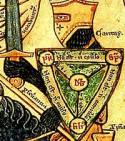
04.22.19 (Nisan 17, 5779) Because we are in the midst of a raging spiritual war, it is imperative to gird your mind and heart with truth... Keep yourself armed for the battle and be aware of the common strategies of the enemy of your soul (2 Cor. 2:11). Trust in God's power to deliver you from evil (1 Cor. 10:13). Be resolute in your convictions, refusing to yield to worldly pressures to compromise your faith in the name of supposed "tolerance." It is not loving to suppress the truth of Yeshua or to minimize the truth claims of our Messiah's vision of reality. Fight the good fight of faith, and take hold of those spiritual weapons that are "mighty through God to the pulling down of strongholds" (2 Cor. 10:4). Always be ready to yield every thought to the obedience of your LORD (2 Cor. 10:4). Know that this is the fight for your life, friend. The Prince of Peace (שַׂר־שָׁלוֹם) came to make peace between God and sinners through his sacrificial blood, but he did so by means of a terrible conflict with the powers of darkness, and his message still offends those enslaved by pride and fear... The devil provides weapons for those in his service, namely voilence, the lies of darkness, the impudence of pride, and the vain seductions of this world, and therefore it behooves us to avail ourselves of the weapons of faith received by the agency of the Spirit of God (Eph. 6:11-18). Be sober and vigilant because your adversary (ἀντίδικος) the devil prowls about like a roaring lion, seeking someone to devour. Resist him, firm in your faith, knowing that the same experiences of suffering are being accomplished by your brethren who are in the world" (1 Pet. 5:7-8). Yield yourself to God, resist the devil and he will flee from you (James 4:7). The end of all things draws near: be awake; call upon the Name of the LORD....
He is Risen Indeed...

04.21.19 (Nisan 16, 5779) He is Alive! The night of Nisan 17 marked the time of the resurrection of Messiah. According to a careful reading of Scripture, we believe the Lord was crucified on Nisan 14, when the Passover lambs were being sacrificed at the Holy Temple, and He rose from the dead three days and three nights later, on the night of Nisan 17 (i.e., before sunrise on Sunday). We rejoice that He is risen - He is alive - and our redemption is eternally secure! The most important fact of all history - and that which radically and forever transforms everything else - is the resurrection of Yeshua from the dead (תחייתו של משיח).
שֶׁכֵּן אֲנִי חַי
וְגַם אַתֶּם תִּחְיוּ
she·kein · a·nee · khai
ve·gam · a·tem · teekh·yoo

"Because I am alive,
you also will live" (John 14:9)

ὅτι ἐγὼ ζῶ καὶ ὑμεῖς ζήσετε
Unlike various religions of the world that seek to aspire to God by their own efforts, our Lord came to give us life from above, to secure a new source of connection with the divine life that derives from God's condescension, grace, and love... Our Moshia became flesh, clothed himself with our sicknesses to bring healing and eternal life to us. Amen. Yeshua redeems us from the curse that binds us to death, delivering us from Satan's legal claim and hold. The Savior (הַמּוֹשִׁיעַ) willingly entered the exile of our sinful condition and endured the sting of death for each of us. By doing so he overcame the power of death and disarms the realm of despair and everlasting darkness... Only Yeshua unflinchingly stared down and upended all the devil could throw at him by means of the invincible glory of His sacrificial life... Our LORD is the First and the Last, the Living One who died, and behold is alive forevermore, the true Keyholder of Death and Hell (Rev. 1:18).
Note: Our thoughts and prayers are for the families of those Christians murdered by Islamic jihadists in Sri Lanka today... May the LORD God of Israel bring his comfort to the victims of this hate crime and may the truth of God's love in Messiah - the love that overcomes the power of death be fearlessly proclaimed throughout all the world. Amen (Rev. 12:11).
Our Broken Matzah...
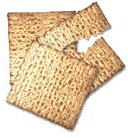
04.19.19 (Nisan 15, 5779) During our Passover Seder, we will place three matzahs on the table, said to represent Abraham, Isaac and Jacob, respectively. During the Yachatz step of the seder, the middle matzah (representing Isaac) will be broken to recall how Isaac was sacrificed in obedience to his father, foreshadowing the sacrifice of Yeshua by God the Father. Indeed, the Talmud states, "We break the middle matzah in tribute to Yitzchak (Isaac), who accepted the sins of the people upon himself" (Shabbos 89b). The smaller half of this broken matzah will be eaten later during the Motzi Matzah step, while the larger half will be eaten during the Afikomen step, near the end of the night...
In Hebrew, the middle of something is it's heart - the heart of the heavens, the heart of the earth, the heart of the sea, the heart of a person... Since the offering of Isaac by Abraham foretold of the greater offering of Yeshua by God Himself, when we break the middle matzah, then, we recall the broken heart of God over the pain Yeshua endured by taking our sins upon Him at the cross...."For our sake he made him to be sin who knew no sin, so that in him we might become the righteousness of God" (2 Cor. 5:21).
During his Passover seder with his disciples, Yeshua "took matzah, and after blessing it broke it and gave it to the disciples, and said, "Take, eat; this is my body" (Matt. 26:26). Since Yeshua did this while they were eating dinner, the matzah he broke would have been the Afikomen, thereby making the connection between the hidden bread (lechem ha-nistar) that would be broken given for our deliverance. The matzah we eat during Passover is called lechem oni (לֶחֶם ענִי) - "the bread of [His] suffering" - and eating the Bread of Life that was "broken for us" remembers the great suffering of our LORD...
 |
Twlight of Nisan 14, 5779
Intimacy of Passover...
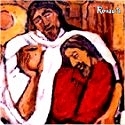
04.18.19 (Nisan 13, 5779) Unlike the rituals and practices of organized "religion," the Passover Seder takes place at home, not in a sanctuary, and may be conducted by anyone, not by professional clergy or a rabbi... The heart of the seder is shared meal celebrating our connection with family, our friends, the "called out" people of God who take refuge in his promises. Such intimacy is altogether fitting, since Passover was foreshadowed in the original paradise, was prophetically and poignantly re-enacted by Abraham's sacrifice of Isaac, and was later affirmed by Israel at the time of the Exodus. In each case the blood of the lamb is central: to cover the shame of Adam and Eve's transgression; to express the heart of God's compassion in the substitution of the lamb for Isaac, and for the redemption of the families of Israel during the Passover. Most of all, however, the Passover Seder foretells and recalls the sacrifice of Yeshua on our behalf as the great Lamb of God who delivers us from our slavery to sin. Therefore heed the Torah's general rule about the holidays: "You shall rejoice in your festival" (Deut. 16:14) by delighting in the salvation of God, by embracing our family and friends in the sure hope of eternal life.
Note: We've been very busy cleaning the house and getting ready for our family Passover Seder for tomorrow night... I added some new content to the Hebrew for Christians Passover Hagaddah (called "Worthy is the Lamb") that you can download here. If you can't attend a seder this year, please download the file and read through it on Passover. Get a couple candles, a box of matzah, and some grape juice and you will then be able to follow along! Wishing you all a wonderful Passover Season and a closer walk with our beloved Lord Yeshua who is our Passover Lamb of God. "Worthy is the Lamb who was slain, to receive power and wealth and wisdom and might" (Rev. 5:12). Amen! Love and blessings to you! - John
The Passion of Yeshua...
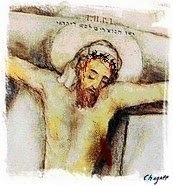
[ The following is related to holiday of Passover, which begins tomorrow evening at sundown. ]
04.18.19 (Nisan 13, 5779) "Abba father, if it is possible, let this cup be taken from me. But not what I want, but what you desire" (Mark 14:36). Yeshua was willing to fully surrender to the will of the Father, even though he experienced dread, pain, and even sweat "as great drops of blood" (ὡσεὶ θρόμβοι αἵματος) during his agony (Luke 22:44). He honored the Father as the deeper will for his life; he yielded to the Father's care even in the darkest hours of his persecution and torment. This is the passion that was foretold by the Akedah, when Isaac willingly offered himself upon the altar in obedience to his father Abraham's desire. By entrusting himself to God's care, Yeshua was able to love his enemies, to turn the other cheek, and to overcome evil with the greater power of good. His love was not reciprocally offered; it did not depend on our acceptance, but was grounded in the will of the Father. He loves us as we are, even when we were his enemies: "God shows his love for us in that while we were still sinners, Messiah died for us" (Rom. 5:8).
Note: For more on this topic, see the "Gospel According to Moses."
Taking Passover Personally...
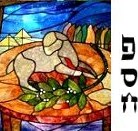
[ The following is related to holiday of Passover, which begins Fridau evening at sundown... ]
04.17.19 (Nisan 12, 5779) The message of Passover applies to each of us: "In each and every generation an individual should look upon him or herself as if he or she (personally) had left Egypt." Indeed the very First Commandment is to accept the reality of our personal deliverance by the LORD: "I am the LORD your God, who brought you (singular) out of the land of Egypt, out of the house of slavery" (Exod. 20:2). Note that the Hebrew word "Egypt" is mitzraim (מִצְרַיִם), a word that means "prison, enclosure, or straights," from the verb tzur (צוּר) meaning "to bind or confine" (the Yiddish word tsuris, "trouble," comes from the same root). On the other hand, the Hebrew word for salvation is yeshuah (יְשׁוּעָה), from a root that means to "make wide," to "release from constraint," to deliver or set free. It is noteworthy that God began the Ten Commandments by identifying Himself as our Redeemer and Deliverer rather than as our Creator, because the purpose of creation is to be set free by means of God's redemptive love given through Yeshua, the "Lamb slain from the foundation of the world" (Rev. 13:8; 1 Pet. 1:18-20; Eph. 1:4; 2 Tim. 1:9).
בְּכָל דּוֹר וָדוֹר חַיָּב אָדָם לִרְאוֹת אֶת־עַצְמוֹ
כְּאִלּוּ הוּא יָצָא מִמִּצְרָֽיִם
be-khol · dohr · va-dohr · khai-yahv · ah-dahm · leer-oht · et - atz-moh
ke-ee-loo · hoo · yah-tzah · mee-meetz-rah-yeem

"In each and every generation an individual should look upon himself (or herself)
as if he (or she) personally had left from Egypt."
The Meaning of Freedom...

04.17.19 (Nisan 12, 5779) Passover is sometimes called zeman cheruteinu (זְמָן חֵרוּתֵנוּ), the "Season of our Freedom." Some people think that "freedom" means "licentiousness," or the ability to do what they want to do whenever they want to do it. However, simply doing whatever you want to do is not the Torah's idea of freedom. Yeshua told us "whoever commits sin is the slave (δουλος) of sin," and went on to say "if the Son sets you free, you will be free indeed" (John 8:34-36). True freedom (i.e., cherut: חרוּת) is therefore moral and spiritual rather than merely physical. Real freedom has to do with the power to choose what is right and good, not to simply get your own way or to practice your lusts... Our deliverance is meant to clothe us with divine power to walk in righteousness and truth (Phil. 2:14-16).
Note: Where it is written, "The tablets were the work of God, and the writing was the writing of God, engraved on the tablets" (Exod. 32:16), the midrash says do not read "engraved (i.e., charut: חָרוּת) on the tablets" but rather as "freedom (i.e., cherut: חֵרוּת) on the tablets," since only those who obey God's will may rightly be called "free" people...
Our Need to Think Clearly...

04.17.19 (Nisan 12, 5779) An axiom of (fallen) human nature is that people tend to believe what they want to believe, and that they project their biases and preconceptions while assuming they are genuinely thinking... Yeshua warned us against making hasty judgments based on superficial appearances without taking time to investigate a matter carefully (see John 7:24). "Wisdom is justified by her children," he said, meaning that reason is often a servant to the passions (Luke 7:35). Rarely do people examine evidence and then form their conclusions but instead think selectively - listening to what appeals to them while ignoring questions that might threaten their preconceptions and prejudices. Many allow their personal feelings about an issue to so overwhelm them that they are incapable of coherent thinking at all. This leads to the strange phenomenon that the most opinionated of people often literally do not know what they are talking about, since they rarely define their terms, they are reluctant to seriously question their own predispositions and presuppositions, and they experience "emotional incontinence" when they are challenged about their convictions. This is quite common in today's colleges and universities, which have become bastions of irrationality and cultural programming. Such people are intellectually lazy, meaning they do not want to do the work that clear thinking requires but prefer to have their intolerance confirmed, to oversimplify topics, and to find their convictions in the propaganda of the crowd, pop culture, or in mass media...
We must learn to be aware of how our emotional needs can be exploited by other people, and in particular, by politicians, social engineers, activists, advertisers, fear mongers, agitators, racists, anarchists, and so on. Everyone has a real need to be loved, accepted, affirmed, and so on, though it is vital to have these needs met by God, not by man.... Manipulators know how to play with our emotions, perhaps by flattery or by appealing to our anxieties, and thereby they can deceive us into accepting as true what is untrue. When we are flattered, for example, we may transfer our positive feelings of affirmation with what the person is trying to con us into accepting. Often flatterers seem earnest and sincere, but this disguises ulterior motives at work. In political rallies appeals to the crowd abound: glistening generalities, appeals to snobbery or fear, sanctimonious humbug, and feel-good groupthink are common deceptive techniques. "Yes we can, yes we can!"
"I know your race. It is made up of sheep. It is governed by minorities, seldom or never by majorities. It suppresses its feelings and beliefs and follows the handful that makes the most noise. Sometimes the noisy handful is right, sometimes wrong; but no matter, the crowd follows it. The vast majority of the race, whether savage or civilized, are secretly kind-hearted and shrink from inflicting pain, but in the presence of the aggressive and pitiless minority they don't dare to assert themselves." - Mark Twain: The Mysterious Stranger
Professional propagandists (e.g., mass media news) regularly employ emotional appeals and obfuscated "thinking" to intimidate us, presenting false dilemmas designed to circulate carefully scripted words and rumors intended to win our confidence and to control our thinking (i.e., "brain washing"). Often it's not what is being said, but what is not being said - namely, the assumption that God is not real, that government is our savior, and so on. They often employ neuro-linguistic techniques of various kinds to disseminate a narrative or "politically correct" version of the "news" that is deliberately misleading and which serves the interests of the ruling elite. The use of slogans, the repetition of mantras expressing unquestioned assumptions, the dishonest tactic of making "straw men" out of other viewpoints, and the ongoing fraud that purports to provide "unbiased, objective" news is all part of the charade of our age...
It is important to seek the "bottom line" or hidden agenda at work when listening to the voices or opinions that the mass media injects into the "vocabulary" and conversation of mass culture. Our feelings are important, of course, though they are easily manipulated by the unscrupulous. Those who manipulate our emotions are bullies of the soul, trying to frighten us into joining their cause, warning us not to question their ideals at the risk of violence. The constant barrage of mass media disinformation attempts to enslave the minds of people, proclaiming the "godless gospel" that God is not in control of the world, that we must live in fear, that we must not think too deeply or dare to question the prejudices and doctrines of the oligarchs and "princes" of this evil world. Like a person of moral conviction, a logical person is an "enemy of the state" these days, because the godless manipulators of our age use deceptive techniques to suppress the truth of God and the truth about reality.
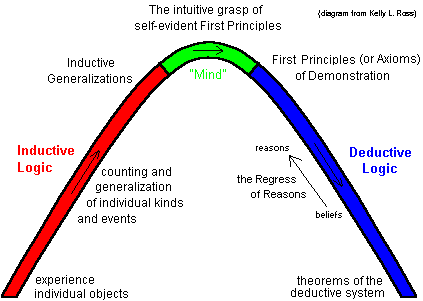 |
Anger and Strange gods...

04.17.19 (Nisan 12, 5779) Ours is an angry age, and anger blinds the heart.... Left unchecked, anger can destroy us and others. Angry words and actions leave their mark, wounding relationships and bringing about alienation and resentment. Dealing with our anger issues is not easy, of course, though it is essential for our healing. The sages say that unbridled anger is a symptom of idolatry - that is, elevating the self to "play god" by seeking to control things and to demand its own way. They note that the verse, "There shall not be within you a strange god (לא־יִהְיֶה בְךָ אֵל זָר), nor shall you bow to a foreign god" (Psalm 81:9) refers to the evil inclination within the heart which turns the self into a "foreign god," exalting the self "out of place" with reality. Anger entices the exalted ego to feel offended and to "make a case" against someone, finding them guilty of sin and worthy of contempt and retribution. We must be careful not to "legitimize" or excuse our spite by blaming others (or even God). Indeed the English word "blasphemy" comes from a Greek word (βλάσφημος) that means to speak evil, to revile, and to blame (μέμφομαι)... In other words, blaming others (including God) is a form of blasphemy. Raging about politics, insulting or slandering others, feeling aggrieved over your life (i.e., blaming God), indulging in expressions of frustration because you don't get your way, walking in bitterness, sarcasm, or cynical indifference, scorning others or holding them in contempt -- all these are examples of blasphemy.
Yeshua said, "Judge not, and you will not be judged; condemn not, and you will not be condemned; forgive, and you will be forgiven" (Luke 6:37). This is the "like-for-like" reciprocity of forgiveness: your forgiveness of others is the measure of your own forgiveness; the judgment you pronounce will fall upon you; the measure you use will be measured to you.... The way of humility extends sympathy and compassion to others, looking past their shortcomings and transgressions, relieving them of the demand to be faultless and perfect. The true self is the one given to us when we are connected to "I am the LORD your God" (Exod. 20:2), and indeed, this is the very first commandment of the Ten Commandments: anokhi Adonai Elohekha (אָנכִי יְהוָה אֱלהֶיךָ). We overcome the idolatry of our anger when we let go of our "need" to control everything in the world and then gratefully reconnect with who we really are, namely a child of God who by God's love, compassion, and grace is no longer made "strange" or "foreign" to the truth and blessing of life (Eph. 4:24; 1 Cor. 5:7).
To forgive means to let go -- to "give away" pain and hard feelings... Forgiveness releases the hurt, the anger, and the disappointment so that these emotions do not inwardly consume and exhaust our souls. And yet forgiveness must be self-directed, too, since refusing to forgive yourself denies or negates the forgiveness given from others. Forgiving yourself means admitting that you act just like other people, that you are human, and that you are in need of reconciliation too. Ultimately, forgiveness is both an act of self-acceptance and empathy -- we admit we are just like others, weak, flawed, in need of help, and so on. We can only forgive to the extent we recognize the truth about ourselves that we see in others. Yet we have to move on, past the shame, and to turn back to abiding hope. As a Yiddish proverb puts it, "You are what you are, not what you were..."
"Many sorrows shall be to the wicked, but he who trusts in the LORD shall be surrounded with favor." (Psalm 32:10)
"I hereby forgive all who have hurt me, all who have wronged me, whether deliberately or inadvertently, whether by word or by deed. May no one be punished on my account. And as I forgive and pardon those who have wronged me, may those whom I have harmed forgive me, whether I acted deliberately or inadvertently, whether by word or by deed." Amen. (The Gates of Repentance)
I like this quote attributed to Charles Williams: "Many promising reconciliations have broken down because, while both parties came prepared to forgive, neither came prepared to be forgiven." We have a quick eye to see how others offend us, but not how we might offend them. May the Lord help us be yashar, upright and honest with ourselves; may He give us the willingness to admit we make mistakes, that we are in need of mercy, and may He set us free from the slavery of pride. So how do we forgive the people who have offended us? By refusing to condemn them, for then we will not need to forgive. Our great need is to turn, at every moment, and to keep our focus on the Eternal and real. May God help us all use the "good eye" and see each other in the light of His countenance and loving presence...
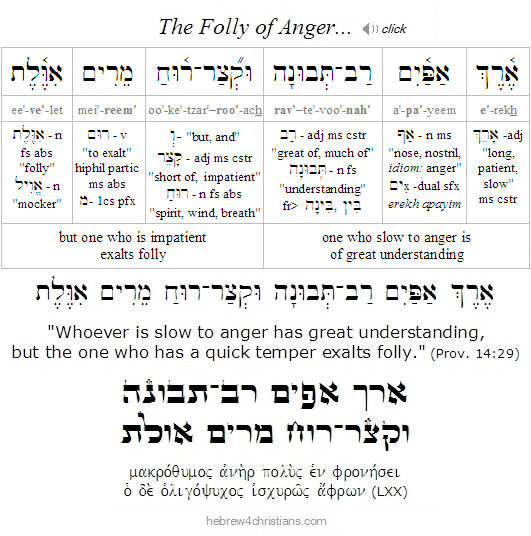 |
"The great thing, if one can, is to stop regarding all the unpleasant things as interruptions of one's 'own" or 'real' life. The truth is of course that what one calls the interruptions are precisely one's real life - the life God is sending you day by day" (C.S. Lewis: Letters to Arthur Greeves).
Always the First Step...
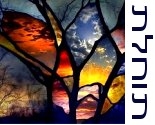
04.16.19 (Nisan 11, 5779) There is a core element of your spiritual life that is all-determinative, that affects everything else, and that is the decision of whether you will choose to "show up," whether you will engage it's hope; and whether you will open your eyes and yield yourself to the light... And this is an ongoing decision. Therefore we read: "If you walk in my statutes (אִם־בְּחֻקּתַי תֵּלֵכוּ) and observe my commandments and do them..." (Lev. 26:3). The sages note that unlike the holy angels, we must "walk out" the faith of our days, and therefore we are always moving either forward or backward. In this world, God's sun shines on the just and unjust alike (Matt. 5:45). Every human being lives by faith of some kind, and it is therefore impossible to opt out of the decision to "choose this day whom we shall serve" (Josh. 24:15). Indifference or apathy is as much a spiritual decision as is outright rebellion, and if we do nothing today to draw us near to the Lord, we will eventually regress and slip backward. This is all very sobering. "No one knows the day or hour," and that's why it is so vital to turn to God and be healed while there is still time. So turn today and bacharta ba'chayim (בָּחַרְתָּ בַּחַיִּים) - "choose life!" "For this commandment (of turning to God) is not hidden from you, and it is not far away... No, the matter is "very near you" (כִּי־קָרוֹב אֵלֶיךָ הַדָּבָר מְאד) - in your mouth and your heart - to do it" (Deut. 30:11-14; Rom. 10:8-13).
"The" Question of Passover...

04.16.19 (Nisan 11, 5779) During the Passover seder we begin our retelling the story of the Exodus when the question is sung: "Mah nishtanah ha-lailah ha-zeh mikol ha-leilot?" - What makes this night differ from all other nights? This is "the" central question of Passover, asked for thousands of years, and the answer is always the same: Avadim Hayinu: "We were slaves, but God redeemed us from bondage by the blood of the lamb (דַּם הַשֶּׂה)." Note again that there were not many lambs, but the LORD told Israel: "You shall keep it [i.e., the Passover lamb] until the fourteenth day of this month, when the whole assembly of the congregation of Israel shall slaughter him at twilight (Exod. 12:6). Each family put their trust in God's uniquely appointed sacrifice to be delivered from the plague of death (מכת המוות).
מַה נִּשְׁתַּנָּה הַלַּיְלָה הַזֶּה מִכָּל הַלֵּילוֹת
mah · nish·ta·nah · ha·lai·lah · ha·zeh · mi·kohl · ha·ley·loht

"What makes this night differ from all other nights?"
The Exodus for Today...
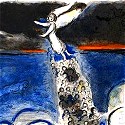
[ "The LORD is a warrior; the LORD is His Name" / יהוה אִישׁ מִלְחָמָה יהוה שְׁמו (Exod. 15:3) ]
04.15.19 (Nisan 10, 5779) An old midrash says that at the time of the great Exodus, only a remnant of Israel were actually saved while all the others died in the makkah (plague) of darkness, having fallen so low that they could not believe in the redemption or even want to be redeemed (Rom. 9:27-28)... God forbid that we should give up hope now, chaverim, especially because of the great salvation Yeshua secured for us at the cross (Heb. 2:3-4; Heb. 6:4-6). בכל דור ודור -- b'chol dor vador -- "in each and every generation" an individual should look upon him or herself as if he or she (personally) had been rescued from Egypt.
And yet divine history is somewhat "cyclical" in its expression. The closer we go back to the beginning, the more we see how the future was "seeded" and gets replayed in every generation. Both the Tree of Life (עֵץ הַחַיִּים) and the Tree of the Knowledge of Good and Evil (עֵץ הַדַּעַת טוֹב וָרָע) were present in the original paradise (Gen. 2:9). When Eve listened to the lies of the nachash (serpent) and regarded the forbidden tree as "desirable to make one wise," she immediately began her descent into exile. At the very dawn of human history, then, we see that "truth" (אֱמֶת) apart from God (א) leads to death (מֵת). Adam and Eve's disobedience led to God's gracious promise regarding the coming "Seed" who would restore all things by being victorious in the war for truth (Gen. 3:15). Of course, this promised Seed was Yeshua, our Suffering Servant and "Second Adam," who, through His sacrifice upon the cross, "reversed the curse" and reconciled humanity with God. Note, however, that this "proto-gospel" message also implied perpetual warfare between the heirs of the Messiah (called the "children of light") and the heirs of Satan (called the "children of darkness"). The ongoing enmity between these "two seeds," then, was ultimately something God willed (1 Thess. 5:5; Col. 1:13; 1 John 3:10). The children of light are called to be am kadosh - a holy people - separate from the evil engendered by the fallen world and its forces, just as the very first creative expression of God was the separation of light from darkness (Gen. 1:3-4). The children of light "hate evil and love the good," and conversely, the children of darkness "hate the good and love evil" (Psalm 34:21, Prov. 8:13, Amos 5:15). The Exodus story, then, is not so much a matter of ancient history as it is a present revelation of God's righteous liberating power over the powers of darkness. The great Exodus led to Sinai, and with it the re-encountering of the Tree of the Knowledge of good and evil, just as the Cross of Yeshua is the Tree of Life in the midst of the Garden of God. Life is about spiritual warfare, and the power encounter between God and Pharaoh is a paradigm for the ages. Therefore Yeshua refered to his own sacrificial death as the great Lamb of God the final exodus (Luke 9:31).
Throughout history we see the repeated attempt to resuscitate or revive ancient "Ra worship" (which derives from Satan in the garden). Every culture has its emissaries of evil -- its "pharaohs," its political dynasties, its caste systems, and its presumed sense of status quo. In the ancient world, most political figures were literally deified; in the Middle Ages, they were thought to rule through "divine right"; but in today's secular world, there is no justification given for their control other than through deception and the naked "will to power." In nearly every case, however, it can be stated that politicians and leaders of this world represent what is most sick about the human condition. Politicians and princlings are given "their hour" in this earth, and they are undoubtedly groomed by the "god of this world" who was a murderer and a liar "from the beginning" (John 8:44). The dust and ashes of countless past civilizations and regimes attest to this truth...
Today we are living in a world that is "globalist" by design. Politicians are often unwitting lackeys for the darker powers seeking to consolidate power to enslave the whole earth. The so-called global economy and its system of usury is the mechanism that will give rise of yet another "Pharaoh" who likewise will be judged by the LORD God Almighty at the End of Days.
Many people live in a state of fear because they believe the lies and propaganda of "the lords of the darkness of this world" / τοὺς κοσμοκράτορας τοῦ σκότους τούτου (Eph. 6:12). Satan's power always has been through the use of deception. If he can get you to believe a lie, he will begin to control you through fear. This is how the devil has always gained the kingdoms of this world -- through deception and violence... As followers of Yeshua, we must always keep in mind that reality centers on the LORD God of Israel and never in the "rhetorical violence" and metaphysical fantasies of political or media figures.
The LORD God of Israel truly cares about people's liberation from deception and oppression. The story of the Exodus is His everlasting rebuke to all the world's dictators and should cause every politician to soberly assess their fate... The time is coming when His judgment will fall upon all the "kings of the earth who take counsel against the LORD and against His Anointed One" (Psalm 2:2).
Presently we are living with the tension of the "already-not-yet" aspect of the original prophecy that "he (the Messiah) will crush the head (of the serpent)." Satan still appears to have the upper hand, at least in the temporal realm. Final victory is not yet here, even if it is assured through the promises of God (Rom. 16:20). And while the time appointed by God for the Messianic redemption of Israel and the "End of Days" is a heavenly kept secret (Mark 13:32), there are certain signs called chevlei mashiach (חֶבְלֵי מָשִׁיחַ) - the "birth pangs" of the Messiah - that indicate that the time is imminent when this world (κόσμος) will be judged.
Most of these birth pangs indicate peril and danger, including "distress of nations in perplexity because of the roaring of the sea and the waves," and "men's hearts failing them for fear, and with foreboding of what is coming on the earth" (Luke 21:25-6). In addition, the moral depravity of mankind will be unmasked, showing us clearly that "men shall be lovers of their own selves, covetous, boasters, proud, blasphemers, disobedient to parents, unthankful, unholy, without natural affection, trucebreakers, false accusers, incontinent, fierce, despisers of those that are good, traitors, heady, highminded, lovers of pleasures more than lovers of God; having a form of godliness, but denying the power thereof" (2 Tim. 3:2-3). The increase in "globalism" and the unholy urge to unify the world into a new type of "Babylon" will give the Messiah of Evil his coming political platform in the days ahead. "Political correctness," that is, social coercion based on godless consensus, is the ethos of our time.
We must cling to the truth that "all things work together for good to them that love God" (Rom. 8:28), and we must also take hold of the command given to Joshua: chazak ve'ematz, "Be strong and of good courage!" Just as Joshua was promised that the LORD would be with him as he went in to possess the land, so we must remember that the LORD has promised never to leave us nor forsake us (Heb. 13:5; Matt. 28:20), even in the midst of tribulation, or distress, or persecution, or famine, or nakedness, or danger, or sword (Rom. 8:35).
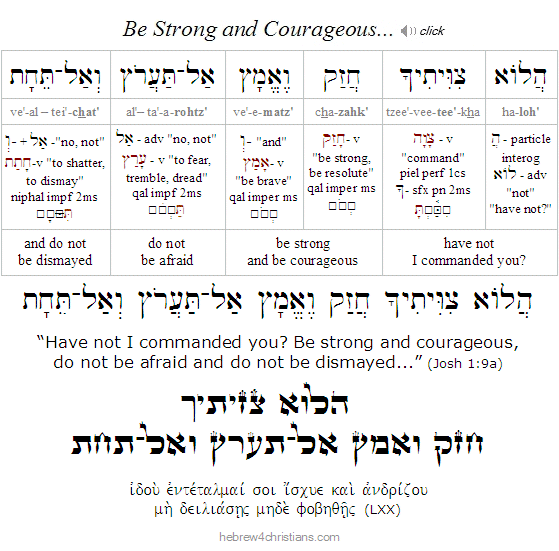 |
We do not need to live in fear, because melo khol ha'aretz kevodo: מְלא כָל־הָאָרֶץ כְּבוֹדו, "the whole earth is filled with His glory (Isa. 6:3). "In God have I put my trust: I will not be afraid what man can do unto me" (Psalm 56:1). Passover is all about the victory of God over the powers of darkness for the sake of our deliverance (i.e., yeshuah: יְשׁוּעָה). The echo of Moses' cry, "Let my people go!" is still resounding in the heavenly realms. So be encouraged, chaverim, even in the face of evil. Do not be afraid and do not be dismayed, "for the LORD your God is with you wherever you go." Amen!
The Sign of Life...
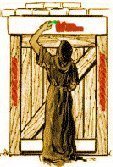
[ The following is related to the holiday of Passover, which begins Friday evening, April 19th... ]
04.15.19 (Nisan 10, 5779) Ve'hayah ha'dahm lakhem le'oht: וְהָיָה הַדָּם לָכֶם לְאת - "The blood shall be a sign for you... And when I see the blood, I will pass over you (וּפָסַחְתִּי עֲלֵכֶם) and no plague will befall you to destroy you, when I strike the land of Egypt" (Exod. 12:13). The blood would be a sign for the eye of faith, i.e., "for you," and not for the unbelieving world at large. During the afternoon of the 14th, the korban Pesach (Passover lamb) was slaughtered and its blood smeared on all three sides of the doorframe, top, right and left, that is, in the form of the letter Chet (ח). This letter is connected with the word chai (חי), "alive," and chayim (חיים), "life," signifying that atoning life is in the sacrificial blood (Lev. 17:11).
 |
Note that some say that the letters of the Name YHVH (יהוה), that is, the Name of Divine Compassion - were daubed on the doorposts: The Yod (י) was written on the top beam, the Vav (ו) on the right doorpost, and the Hey (ה) on the left. This implies that since Yeshua is indeed YHVH, his Name was written on the doorposts of the faithful.
Hebrew Lesson
Exod. 12:13b Hebrew reading (click):
In Every Generation...

[ "In every generation, each of us is obligated to see himself or herself [lirot et atzmo] as though he or she personally came forth from Egypt." - Traditional Hagadah ]
04.15.19 (Nisan 10, 5779) Concerning the observance of the Passover Seder the Torah states, "When your child asks you in time to come, 'What is the meaning of the testimonies and the statutes and the rules that the LORD our God has commanded you?' then you shall say, 'We were slaves (עֲבָדִים הָיִינוּ) to Pharaoh in Egypt, but the LORD brought us out of Egypt with a mighty hand. And the LORD showed signs and wonders, great and grievous, against Egypt and against Pharaoh and all his household, before our eyes" (Deut. 6:20-23). We are instructed to "remember what the LORD your God did to Pharaoh and to all Egypt, the great trials that your eyes saw, the signs, the wonders, the mighty hand, and the outstretched arm, by which the LORD your God brought you out" (Deut. 7:19). As it is written in the Shema, "You shall teach them diligently to your children," we ask, what do we teach? And we answer: Kulo! Everything – the whole story of our deliverance (הסיפור המלא).
So to help fulfill our great obligation to keep educating our children, I am again updating "Worthy is the Lamb - A Messianic Passover Haggadah" for this year.... Please feel free to download this succinct guide for your own study or Passover celebration.
Note: The early sages taught that Hebrew word "Pesach" (פֶּסַח) can be read as peh (פֶּה), "mouth," and sach (סַח), "speaks," indicating that Passover is a confession of the truth of God's redemption, testifying to the truth of the LORD's faithful love. On Pesach we thank God for the revelation and the wonder of the great Lamb of God that was slain...
Truth and Freedom...

04.15.19 (Nisan 10, 5779) When Yeshua said that the truth would "make us free" (ἐλευθερώσει), he was referring to the acceptance of the Witness of Divine Reality (i.e., the Word, Breath, Spirit, Voice, Message, Meaning, and Love of God) that delivers us from the lies we habitually tell ourselves. If you "persevere in my word" (μείνητε ἐν τῷ λόγῳ τῷ ἐμῷ) he said, "then you are my disciples indeed, and you will know the truth, and the truth will set you free" (ἡ ἀλήθεια ἐλευθερώσει ὑμᾶς, John 8:31-32). In other words, as we identify with his vision and redemptive mission, we will "be free indeed" from the tohu va'vohu (Gen. 1:2) – the "chaos and unreality" – that inescapably besets the way of the lie... We will be delivered from vanity and delusions of this world and its diseased affections; we will be set free from the need to justify ourselves by religion (perfectionism); we will no longer crave other people's approval; we will not be moved by the crowd and its pressures; we will find courage to face our challenges without resorting to escapism; and we will learn how to experience peace even when we encounter frustrations. Despite our daily struggles and tests, we will be released from bondage to anger and resentment as we yield our will in trust that God is working all things together for our ultimate good (Rom. 8:28). Genuine freedom is not an "accidental property" of the heart, depending on "luck" or "fortune," but instead is a decision to believe in the Reality of the salvation of God given in Yeshua our LORD.
Teshuvah of Passover...
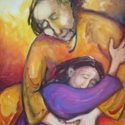
04.14.19 (Nisan 9, 5779) We must be careful not to worship an idol, that is, a false concept of God! It is entirely possible to study the Bible, to go to church or synagogue, and yet worship a pagan god. How so? By not knowing the heart of the Father; by not honoring the One who passionately seeks our healing. We know the Father by the Son, that is, in "the language of Son" (ἐν υἱῷ) and in the truth of his passion (Heb. 1:2; Luke 10:21-24). Our heavenly Father is eager to forgive and embrace all of his children (John 3:16-17). In Yeshua's famous parable of the "prodigal son," the father saw his wayward child a "long way off" and ran to embrace and kiss him - no questions asked, no explanations needed about his past. When the son nevertheless began reciting his carefully prepared speech of regret and repentance, the father barely listened, and in his overwhelming joy instructed his servants, 'Bring quickly the best robe, and put it on him, and put a ring on his hand, and shoes on his feet. And bring the fattened calf and kill it, and let us eat and celebrate. For this my son was dead, and is alive again; he was lost, and is found...' (see Luke 15:20-25).
Know the heart of the Father... God sees you while you are still "a long way off" (Rom. 5:8). He runs to you with affection when you first begin to turn your heart toward Him. Indeed, God's compassion is so great that He willingly embraces the shame of your sins and then adorns you with "a fine robe, a ring, and sandals." Your Heavenly Father even slaughters the "fattened calf" (Yeshua) so that a meal that celebrates your life may be served.
It is never too late to turn to God... The prophet Jeremiah spoke in the Name of the LORD: "Return, faithless Israel, declares the LORD. I will not look on you in anger, for I am kind (כִּי־חָסִיד אֲנִי), declares the LORD" (Jer. 3:12). When the people drew back in shame, however, God encouraged them by saying "Come back, O lost children; I will heal your faithlessness. "Behold, we come to you, for you are the LORD our God" (Jer. 3:22).
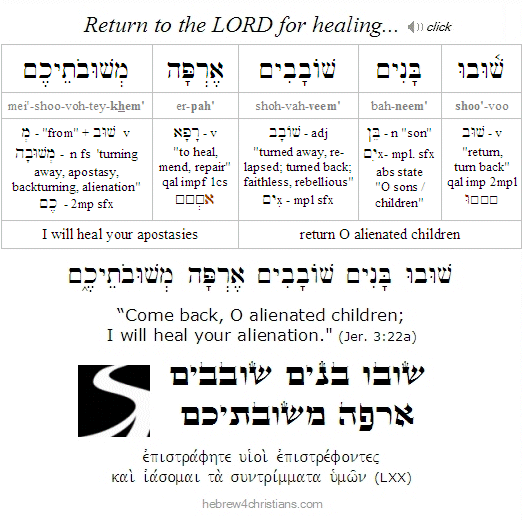 |
Passover Torah Readings...
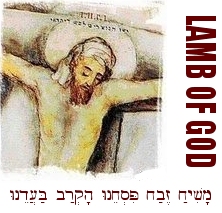
04.14.19 (Nisan 9, 5779) Shavuah tov, chaverim! We are getting very close to the central holiday of Passover, which begins this coming Friday at sundown.... We are very busy cleaning house, getting rid of chametz (products with yeast), and planing for our Seder. Note that the weekly Torah Reading cycle is suspended for the holiday week of Unleavened Bread (called "Passover Week" in the Jewish tradition), with each day of the week (from Nisan 15 through Nisan 22) assigned additional readings from the Torah and Haftarah (these are listed in the Passover Week Readings page as well as the Torah reading page for this week.)
Because the Jewish calendar is solar-lunar, the dates for each day's readings are not fixed, but vary from year to year. This means that the intermediate days of Passover, called chol hamo'ed (CH"M) will vary from year to year. Remember the Jewish day begins at sunset and runs through the following day until 18 minutes before sunset.... To ensure the accuracy of a particular day's readings, always check a good Jewish holiday calendar. Chag Sameach!
Faith's Expectancy...

04.12.19 (Nisan 7, 5779) Regarding the Passover Seder we read: "And you shall eat it in haste; it is the Passover sacrifice to the LORD" (Exod. 12:11). The sages ask, "Why the haste?" Wasn't the redemption foretold to Abraham (Gen. 15:7-16) and later reaffirmed by Jacob (Gen. 48:21), Joseph (Gen. 50:24) and again by Moses and Aaron (Exod. 4:29-31)? Recall that the sequence of the plagues was a year-long administration of successive judgments and that the Israelites had been anticipating their redemption after centuries of slavery. In answer to the question, then, "Why the haste," the sages reply that this was intended to teach us that when the moment finally arrives we must be ready to go forward in faith... Those who hesitated were lost, and many perished during the plague of darkness. The signs were present; God sent forth his prophets, but many chose to remain in Egypt and subsequently were left behind to perish (Mechilta Shemot 13). Likewise Yeshua rebuked his generation for missing the signs of his advent (see Luke 19:44). When we are given the opportunity to believe, then, we must choose to act - we must decide - often in haste, in the midst of darkness and ambiguity. Remember Lot's wife (Luke 17:32). Therefore the Passover was eaten while dressed for travel, anticipating the walk of faith to come...
The Passover Lamb (שֵׂה הַפֶּסַח)

04.12.19 (Nisan 7, 5779) Some of the sages say that the Passover was meant to be a prelude to the revelation given at Sinai, though it really had to do with the deliverance (i.e., yeshuah: יְשׁוּעָה) of those who had faith in God's remedy given through the blood of the lamb. The Passover anticipates God's victory over the powers of darkness -- recall that the final plague was delivered at midnight -- and the people then left Egypt for the promised land the following day -- a vivid testimony of God's power of redemption (Exod. 12:29; Exod. 12:41). We observe the Passover seder in the evening before the Exodus event because we share in the experience of salvation - trusting in God's deliverance from death by the agency of the sacrificial lamb - before we celebrate our freedom. Likewise we first go to the cross of Messiah, the Great "Lamb of God" - receiving God's provision for our healing and deliverance - before we begin our journey into the promise of newness of life (1 Cor. 5:7).
Observing Passover is an act of faith. While still within the darkness of bondage in Egypt, the Israelites had to believe in the freedom God promised to them. By taking hold of the lamb on the 10th of Nisan, waiting four days and then slaughtering the lamb, placing its blood upon their doorway, and later eating its flesh, the people expressed faith in God's deliverance by means of his compassionate gift of vicarious atonement (Exod. 12:3-12). Again, celebrating Passover expresses faith that we are set free from the powers of darkness and oppression, even during the struggle against the darkness. The victory of Passover is a divinely given freedom, a rebirth produced by the Spirit of God (2 Cor. 5:17).
The Very First Passover...
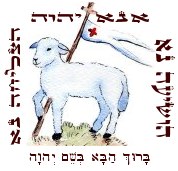
[ The following is related to the holiday of Passover, which begins this Friday April 19th... There is no Passover apart from the blood of the Lamb! ]
04.12.19 (Nisan 7, 5779) Passover is the archetypal picture of the redemption of God. Its theme goes all the way back to the beginning, to the primordial orchard of Eden itself, when Adam and Eve disobeyed God and ate from the forbidden tree. Because of their transgression, our original ancestors incurred the plague of death and were exiled from the Divine Presence, though God graciously promised to heal them through the coming Seed of the woman – the Savior who would crush the head of the serpent and break the fangs of his venomous sting (Gen. 3:15). Soon after making this great promise, God clothed our primordial parents with the skin of a sacrificed lamb (Gen. 3:21), linking their coming deliverance with the "Lamb of God slain from the foundation of the world" (1 Pet. 1:18-20). The very first "Passover" was in the garden. The story extends to the world to come, too, where in the redeemed paradise of God we will celebrate the victory of the Lamb who was slain for our redemption (Rev. 5:12-13, Rev. 19:7).
The great story of our redemption is revealed on two levels in Scripture - one that concerns the paradise of Eden (the universal level), and the other that concerns the paradise of Israel (the particular level). Therefore Yeshua is both rightly called the "Lamb of God who takes away the sins of the world" (John 1:29) and "the Messiah our Passover Lamb who has been sacrificed for us" (1 Cor. 5:7). Likewise he is both called the "Seed of the woman," and "the Son of David"; the "Second Adam," and the "King of the Jews," and so on. The story of Israel's redemption in Egypt therefore serves as an allegory of both the universal salvation promised in Eden (i.e., the lamb slain from the foundation of the world) as well as the revelation of the sacrificial ministry of Yeshua as Israel's promised Messiah. Yeshua is both the Savior of the world as well as Israel's true King and Deliverer.
Note: For more on this subject, please see the articles, "The Very First Passover" and "The Gospel in the Garden."
The Torah of Passover...

[ The following concerns the holiday of Passover, which begins Friday April 19th at sundown. ]
04.12.19 (Nisan 7, 5779) All of the Biblical holidays begin with the primordial holiday of Passover. On the first of Nisan, two weeks before the Exodus, God showed Moses the new moon and commenced the divine calendar. Two weeks later, the Israelites kept the Passover by daubing the blood of the lamb on their doorposts. At the stroke of midnight of Nisan 15 God sent the last of the ten plagues on the Egyptians, killing all their firstborn. On the 6th of Sivan, exactly seven weeks after the Exodus (49 days), Moses first ascended Sinai to receive the Torah (Shavuot). Forty days later, on the 17th of Tammuz, the tablets were broken. Moses then interceded for Israel for another forty days until he was called back up to Sinai on Elul 1 and received the revelation of the Name (YHVH). After this, he was given the second tablets and returned to the camp on Tishri 10, which later was called Yom Kippur, or the "Day of Atonement." Later the holiday of Sukkot ("Tabernacles") was instituted to commemorate God's care for the people as they trekked through the desert en route to the promised land.
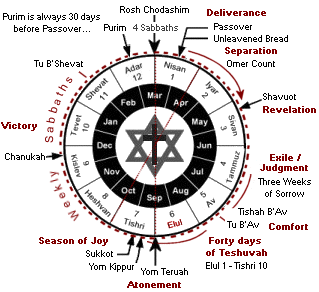 |
The Exodus from Egypt is perhaps the most fundamental event of Jewish history. In addition to being commemorated every year during Passover (Exod. 12:24-27; Num. 9:2-3; Deut. 16:1), it is explicitly mentioned in the first of the Ten Commandments (Exod. 20:2), and it is recalled every Sabbath (Deut. 5:12-15). The festivals of Shavuot and Sukkot likewise derive from it (the former recalling the giving of the Torah at Sinai and the latter recalling God's care as the Exodus generation journeyed from Egypt to the Promised Land). Indeed, nearly every commandment of the Torah (including the laws of the Mishkan (i.e., "Tabernacle") and the sacrificial system) may be traced back to the story of the Exodus. Most importantly, the Exodus prefigures and exemplifies the work of redemption given through the sacrificial life of Yeshua the Messiah, the true King of the Jews and the Lamb of God.
The very first occurrence of the word "Torah" (תּוֹרָה) in the Scriptures refers to the obedient faith of Abraham (Gen. 26:5), and the second occurrence refers to the law of Passover: "There shall be one law (תּוֹרָה) for the native and for the stranger who sojourns among you" (Exod. 12:49). There is a link between these two occurrences. Abraham lived before the time of the Exodus, of course, and therefore he obeyed the law of Passover by means of the Akedah (the sacrifice of his "only begotten" son Isaac). Despite offering his son up upon the altar at Moriah, Abraham believed in the LORD and it was credited to him as tzedakah (righteousness). Abraham's obedience revealed that the inner meaning of Torah is that the "righteous shall live by faith" (Hab. 2:4, Rom. 1:17). The Torah of Passover (תּוֹרַת פֶּסַח) likewise teaches that redemption from death is possible through the exchange of an innocent sacrificial victim. The blood of the Passover was "a sign" of imputed righteousness that was obtained entirely by faith. This is the "korban" principle of "life-for-life" that underlies the Torah of the sacrificial system of the Tabernacle as well. Ultimately all true Torah points to Yeshua, who is the divinely appointed Redeemer and the beginning and goal of all of creation... "When the fullness of time (τὸ πλήρωμα τοῦ χρόνου) had come, God sent forth his Son, born of woman, born under the Torah, to redeem those who were under the Torah, so that we might receive adoption as sons" (Gal. 4:4-5).
Related Topics for Passover:
Passover Soul Searching...
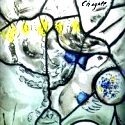
04.11.19 (Nisan 6, 5779) The search for chametz (leaven) is not unlike the soul searching we do before the fall High Holidays, when we perform chesbon hanefesh (חֶשְׁבּוֹן הַנֶּפֶשׁ) by taking inventory of our spiritual condition before the LORD. In other words, we are instructed to search and remove sources of inner impurity so that we might experience the truth that we have been made into a "new substance" that is purged from the sour and rotting influences of our past lives... Since Yeshua has been sacrificed as your Passover Lamb, you are indeed a new creation (בְּרִיָּה חֲדָשָׁה), made "unleavened" by the power of the Holy Spirit (2 Cor. 5:17). Therefore we are likewise commanded put away the "old nature" - the yetzer ha'ra - and purge from your life the old influences that inwardly canker you and make you sick. May you walk in the truth of the love of God for your soul....
חָקְרֵנִי אֵל וְדַע לְבָבִי בְּחָנֵנִי וְדַע שַׂרְעַפָּי
וּרְאֵה אִם־דֶּרֶךְ־עצֶב בִּי וּנְחֵנִי בְּדֶרֶךְ עוֹלָם
chohk·rei·nee · el · ve'da · le·vah·vee · be·chah·nei·nee · ve'da · sar·a·pai
oo·re-eih · eem · de·rekh · oh·tzev · bee · oo'ne·chei·nee · be·de·rekh · oh·lahm

"Search me, O God, and know my heart! Test me and know my thoughts.
And see if there be any grievous way in me,
and lead me in the way everlasting!"
(Psalm 139:23-24)

Hebrew Study Card
Note that the phrase translated "grievous way" (i.e., derekh otzev: דֶּרֶךְ־עצֶב) literally means "way of an idol," or "idolatrous way." Whatever consumes our heart may be an idol...
שׁוּבוּ אֵלַי וְאָשׁוּבָה אֲלֵיכֶם
אָמַר יְהוָה צְבָאוֹת
shoo·voo · e·lai · ve·ah·shoov·ah · a·ley·khem
ah·mar · Adonai · tze·vah·oht

"Return to me, and I will return to you,
says the LORD of hosts" (Mal. 3:7)
Being Wholehearted...
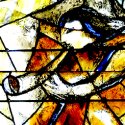
04.11.19 (Nisan 6, 5779) We are admonished in our Torah: תָּמִים תִּהְיֶה עִם יְהוָה אֱלהֶיךָ - "You shall be wholehearted (i.e., tamim: תָּמִים) with the LORD your God" (Deut. 18:13). When we study Scripture or things of "religion," we must be careful not to lose sight of what is important. We should serve God with "simplicity" (תֻּמָּה), that is, sincerely, with our whole heart and with straightforward intent. We should use a "single eye" and resist the temptation to "read into things" (Matt. 6:22-23). Indeed, God knows that we can evade the truth by means of being overly "sophisticated" when we read the Scriptures. The essential truth is plain enough, but we want to split hairs, consult a variety of commentaries, engage in mystical speculations, and so on, all in an attempt to defend ourselves against hearing from the Spirit of God! But as it says in Scriptures: holekh batom yelekh betach, "Whoever walks in simplicity (בַּתּם) walks securely" (Prov. 10:9).
Kierkegaard once lamented: "The matter is quite simple. The Bible is very easy to understand. But we Christians are a bunch of scheming swindlers. We pretend to be unable to understand it because we know very well that the minute we understand we are obliged to act accordingly." Indeed - there is a real danger of merely "thinking about" truth rather than living it... For instance, you might study the Psalms as literature and attempt to understand the nuances of Hebrew poetry, but that is altogether different than reading them with inner passion, with simple faith and the earnest desire to unite your heart's cry with the devotion that originally gave life to the sacred words... Likewise you might study Torah, pronounce the Name YHVH, carefully observe the festivals, and hope to "correct" Christians regarding their religion, and still be a lost soul... We must read with a heart of faith to unlock the truth that speaks to the heart. If you believe only what you understand, your faith is actually grounded in your own reasoning, not in the Divine Voice of Love.
Words and Judgments...
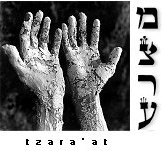
[ The following is related to our Torah reading this week, parashat Metzora... ]
04.11.19 (Nisan 6, 5779) Some people think that the prohibition against lashon ha'ra (evil speech) refers primarily to defaming another person's reputation or impugning someone's character, but it actually refers to saying anything negative or critical of others at all – even if what is said is factually true... The Chofetz Chaim explained the commandment this way: "You are forbidden to relate anything negative about others. If a negative statement is true, it is still considered to be lashon ha'ra (except in very specific circumstances, such as testifying in a criminal court case); and if a negative statement is false, even partly false, it is motzi shem ra (מוֹצִיא שֵׁם רָע), that is, defamation of character, and is therefore a much more serious offense. It cannot be repeated enough that true negative statements are considered lashon ha'ra. The most common defense to a criticism for speaking lashon ha'ra is, "But it is true!" However that is exactly what categorizes the statement as being lashon ha'ra" (Sefer Shemirat Lashon). We must exercise great care, chaverim, for "death and life are in the power of the tongue" (Prov. 18:21). A midrash states that if someone speaks well of another, the angels above will then speak well of him before the Holy One, but if he speaks evil of another, the accusing angel will then accuse him before the Holy One.
Likewise Yeshua taught us that whatever is spoken in this life is "echoed" throughout eternity and will be reheard upon the day of judgment: "I tell you, on the day of judgment people will give account for every careless (ἀργὸν) word they utter, for by your words you will be justified, and by your words you will be condemned" (Matt. 12:36-37). We are especially warned against making promises we might break: "Let what you say be simply 'Yes' or 'No'; anything more than this comes from evil" (Matt. 5:37). Therefore the Holy Spirit says through David: "What man is there who desires life and loves many days, that he may see good? Keep your tongue from evil and your lips from speaking deceit."
"Why is the tongue called a slaughtering arrow? (i.e., חֵץ שׁוֹחֵט לְשׁוֹנָם, Jer. 9:8). Because if a person draws a sword to kill a neighbor, and the neighbor begs for mercy, the person's mind can change, and the sword can be returned unused. However, once an arrow is loosed, it can never be called back, even if the person who shot it has a change of mind" (Midrash Shocher Tov).
Note: In Lev. 14:2 we read, "this is the law of the leper (תּוֹרַת הַמְּצרָע), where the word "leper" (i.e, ha'metzora: הַמְּצרָע) was homiletically read by the sages as ha'motzi ra, "one who brings forth evil." Spiritually speaking, the one who speaks evil becomes a "leper." Note also that there are cases when we are duty bound to speak the truth, even if it is "negative," such as in criminal matters, though that is not the point of the general prohibition against lashon ha'ra... We must pursue justice and reprove evil, but we must do so in love and with the aim at true restoration. Seek first the Kingdom of God and His righteousness...
Hope in Troubled Times...

04.10.19 (Nisan 5, 5779) "But you must know this: in the last days perilous times shall come" (2 Tim. 3:1). Notice first that this knowledge is not optional, since the Greek verb is imperative (i.e., Τοῦτο δὲ γίνωσκε - i.e., "this you must know..."). In order to heed this commandment, then, we need to understand some of the language being used in this verse. The Greek phrase "in the last days" (ἐν ἐσχάταις ἡμέραις) refers to the prophesied "End of Days," sometimes called acharit ha-yamim (אַחֲרִית הַיָּמִים) in Hebrew, the time just before the advent of the coming of Messiah. In the context of Paul's letter, however, the "last days" ultimately refers to the period of the Great Tribulation (צָרָה גְדוֹלָה) just before Yeshua returns to establish His Kingdom in Zion in fulfillment of the words of the Hebrew prophets...
According to many of the sages, the time immediately preceding the appearance of the Messiah will be a time of testing (nisayon) in which the world will undergo various forms of tribulation, called chevlei Mashiach (חֶבְלֵי הַמָּשִׁיחַ) - the "birth pangs of the Messiah" (Sanhedrin 98a; Ketubot, Bereshit Rabbah 42:4, Matt. 24:8). Some say the birth pangs are to last for 70 years, with the last 7 years being the most intense period of tribulation -- called the "Time of Jacob's Trouble" / עֵת־צָרָה הִיא לְיַעֲקב (Jer. 30:7). The climax of the Great Tribulation is called the great "Day of the LORD" (יוֹם־יהוה הַגָּדוֹל) which represents God's wrath poured out upon a rebellious world system. On this fateful day, the LORD will terribly shake the entire earth (Isa. 2:19) and worldwide catastrophes will occur. "For the great day of their wrath has come, and who can stand?" (Rev. 6:17). The prophet Malachi likewise says: "'Surely the day is coming; it will burn like a furnace. All the arrogant and every evildoer will be stubble, and that day that is coming will set them on fire,' says the LORD Almighty. 'Not a root or a branch will be left to them'" (Mal. 4:1). Only after the nations of the world have been judged will the Messianic kingdom (מַלְכוּת הָאֱלהִים) be established upon the earth. The remnant of Israel will be saved and the 1000 year reign of King Messiah will then commence (Rev. 20:4). For more information about this, see "As the Day Draws Near."
Notice that Paul states that the time before the End of Days would be perilous (χαλεπός). In the entire New Testament, the only other place we find this Greek word is in Matthew 8:28, where it describes fierce demonic activity. Indeed, the word "perilous" likely comes from a Greek verb (χαλάω) that means "to let down from a higher place to a lower," thereby creating a sort of spiritual "chasm" or rift, which again suggests that Satan's activity will be increased upon the earth. In the "End of Days," then, a wave of fierce demonic activity will appear upon the earth that will menace and terrorize others.
Are we then to live in fear of these things? No. "There is no fear in God's love" (φόβος οὐκ ἔστιν ἐν τῇ ἀγάπῃ). The Greek word translated "times" in this verse (καιροὶ) is also translated as "appointed times" (מוֹעֲדִים) in the Scriptures. God has appointed this time to be one of judgment upon the earth, and we are therefore forewarned so that we can speak the truth and offer healing to the world... God will never leave us nor forsake us; He will walk with us through the waters, and through the fires, chaverim (Isa. 43:2). Our Good Shepherd knows how to calm the storms around us...
We are living in a decaying and moribund world, and the great age of apostasy will soon be coming to an end. The Apostle Paul provided a list of nineteen characteristics that would mark the heart of people during this final period of human history. "People will be lovers of self, lovers of money, proud, arrogant, abusive, disobedient to their parents, ungrateful, unholy, heartless, unappeasable, slanderous, without self-control, brutal, not loving good, treacherous, reckless, swollen with conceit, lovers of pleasure rather than lovers of God, having the appearance of godliness, but denying its power" (2 Tim. 3:2-5). Noteworthy in this litany is the phenomena of what might be called "misdirected love." People will be "lovers of themselves," "lovers of money," "lovers of pleasure more than lovers of God," and "not lovers of good." Loveless self-centeredness will be the "norm" of the day.... And even though he was being prophetic (i.e., speaking of the End of Days), the Apostle linked these nineteen middot ra'ot (evil attributes) to the character of false teachers presently in the church, and warned his protege Timothy that Satan can masquerade as an "angel of light." Therefore we are to have nothing to do with those who pervert the gospel message (2 Tim. 3:5). These false teachers would come to an end just as did "Jannes and Jambres" (Paul here cites a midrash regarding the identity of two of the Egyptian magicians who opposed Moses and whose rods were swallowed up by Aaron's rod in Exod. 7:11-12).
Paul then encouraged Timothy to "stay the course" and to refuse to exercise false "tolerance" in light of these conditions... Now more than ever we must abide by the truth and refuse to compromise the message of the gospel. We must never forget the reality and certainty of Yeshua's soon return. In what may have been Paul's last recorded words, he writes: "I charge you in the presence of God and the Messiah Yeshua, who is the Judge of the living and the dead (הֲשׁפֵט אֶת־הַחַיִּים וְאֶת־הַמֵּתִים), and by his appearing and his kingdom: preach the word; be ready in season and out of season; reprove, rebuke, and exhort, with complete patience and teaching. For the time is coming when people will not endure sound teaching (διδασκαλία), but will cater to their passions and gather around themselves teachers who say whatever their ears itch to hear. Yes, they will stop listening to the truth, but will turn aside to wander after myths" (1 Tim. 4:1-4). The phrase "having itchy ears" may be an idiom for satisfying their curiosity - they "itch" to hear things, in other words, that appeal to their sensuous nature rather than dealing with the underlying heart issue... They may be superficially interested in doctrine, but only because it satisfies their desire to be "in the know" about the latest religious ideas, etc.
All this leads to a sober assessment of the purpose of studying the Jewish roots of our faith. Some people genuinely seek to better know and love their Savior by engaging in the study of Hebrew, the Jewish holidays, and so on, while others undoubtedly do so because they "itch" to hear things in an attempt to satisfy their curiosity.... Indeed a lot of what is passed off as "Messianic Judaism" today appears to be based on spiritual pride. If you listen to some of the big-name Messianic teachers out there today, you'll hear that the Christian Church is either an entirely self-deceived social institution or else how "Christians" are woefully deficient regarding matters of spiritual truth. In short, these teachers insist that something more needs to be added, some additional knowledge, practice, awareness, insight, and so on. And of course these teachers are happy to proclaim themselves as the ones who can "disabuse" you of your pathetic misconceptions, etc. We see this trend in both the "Torah observant" schools of Messianic Judaism as well as in the "new wave" of "mystical Messianic Judaism" that is beginning to become more and more commonplace. For more on this, see the article entitled, "Kabbalah and Legalism."
It is one thing to "play games" and trifle with spiritual matters, and it is an entirely different thing to be shocked into conviction and genuine teshuvah... Soren Kierkegaard once lamented there are many people who arrive at conclusions in much the way schoolboys do: "they cheat their teachers by copying the answer book without having worked the problem out themselves." This is part of the mob mentality within Christendom. We can parrot creedal formulas or recite catechisms, yet in the end it is our own responsibility to make an authentic faith commitment. Thomas Aquinas' most significant work was his Summa theologiae or 'Summary of Theology,' a massive book that attempted to systematize all of Christian theology. He worked on it from 1266 through 1273, but when he was nearly finished, he underwent an experience so intense that, as he himself explained, everything he had written "seemed like straw." He thereafter gave up writing about theology after he encountered the Reality itself. "Examine yourselves to see whether you are living the life of trust. Test yourselves. Don't you realize that Yeshua the Messiah is in you? - unless you fail to pass the test" (2 Cor. 13:5). The message of the Messiah is central. Yeshua is the beginning and the end. Simply put, trusting in the sacrificial life, death, and resurrection of Yeshua as your personal righteousness before the Father is the central commandment of all the Scriptures.
As we draw closer to the "end" of the "End of Days" it is important not to let our hearts grow cold or numb... The devil is increasingly using mass media, the realm of politics, and stupefying "news" propaganda (i.e., κόσμος) to incite the workers of iniquity to do his bidding, tempting believers in the LORD God of Israel to feel discouraged, overrun with evil, and increasingly marginalized in their faith... But take heart, chaverim: the victory has already been won; God's truth will forever prevail (1 Cor. 15:57). Always remember that there is more power in one simple and heartfelt prayer before heaven than all the schemes and armies of the wicked combined. All those who are "fathered by God" conquer the world, since God imparts to us the victory of faith by means of His powerful Spirit (1 John 5:4). Therefore the heart of faith says, "In all these things [afflictions, tribulations, etc.] we are 'more than conquerors' (lit., "hyper-conquerors," i.e., ὑπερνικῶμενfromὑπέρ, "hyper" + νικάω, "to overcome") through Him that loved us (Rom. 8:37). So do not lose heart. Don't believe in the matrix of this world. Time is short; the hour approaches... "Have no fear of them, for nothing is covered that will not be revealed, or hidden that will not be known" (Matt. 10:26). Amen.
מִגְדַּל־עז שֵׁם יְהוָה
בּוֹ־יָרוּץ צַדִּיק וְנִשְׂגָּב
meeg·dal-ohz shem Adonai,
boh-yah·rootz tzad·deek ve·nees·gahv

"A tower of strength is the Name of the LORD,
the righteous one runs to him and is set on high."
(Prov. 18:10)

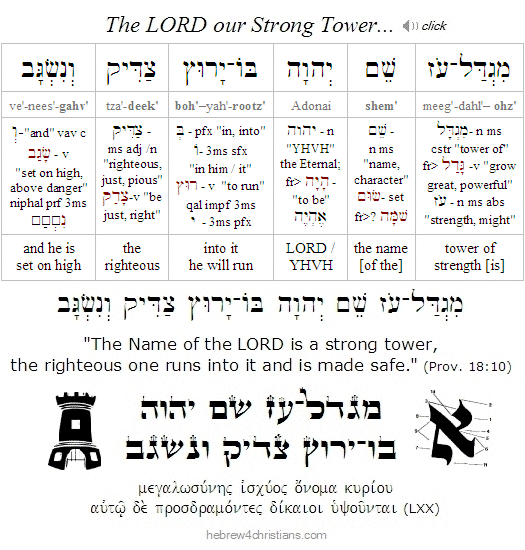
Download Study Card
Celebrate God's Love...
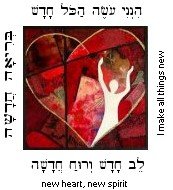
04.10.19 (Nisan 5, 5779) Yeshua said the kingdom of heaven could be likened to a king who gave a wedding feast for his beloved son. Those who were invited made one excuse after another why they could not attend, so the disappointed king then instructed his servants to "go out quickly to the streets and lanes of the city, and bring in the poor and crippled and blind and lame... and compel everyone you find to come in, so my house may be filled" (see Luke 14:15-24). God loves people and implores them to personally join in the celebration of his love, to partake of the marriage feast of the Lamb (חֲתֻנַּת של הַשֶׂה; Rev. 19:7). But note that this means that we are willing to bring all the lame, broken, and fearful parts of ourselves to the banqueting table of God's love... The courage to "come to the table" only comes from the conviction that you are welcomed and accepted, that is, by trusting that you are truly made safe by God's love. This is the heart of Passover after all...
Perhaps we are suspicious and question God's unconditional love for us because we've experienced rejection or abandonment in our lives. We silently wonder, "What if God lets me down and I get hurt again?" We prefer the "comfort" of our fears to the risk of letting go and trusting in God's love for us, just as we are... This fear shows up in a lot of ways, for instance, by thinking we have to be "religious," or by attempting to clean ourselves up before we can accept God's love. On the other hand, we might entertain a sense of false humility that considers our sin to be too much for God to bear, and thereby excuse ourselves from the celebration.... In every case the problem is the need to control. We want to define the terms of love before we will let go and trust. We are offended at the idea of divine grace because we want to esteem ourselves as worthy of God's love based on who we are, rather than on who God is... The message of God's love, however, is scandalous, precisely because it gives wholeheartedly to those who are undeserving and unworthy, to the tax collectors, the sinners, the crippled and blind and lame... Thank God that our Savior is called "the friend of sinners!" (Luke 7:34). So come just as you are; sit at the table; know that you are welcome.
Heaven's Love Story...
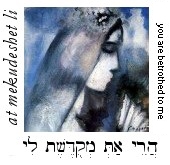
04.10.19 (Nisan 5, 5779) The Scriptures reveal that ultimate reality is a divine love story with a "happy ending," despite the struggles we often face in this world. We see this in connection with the great deliverance of the Passover, when we read the story of our redemption in a book called a "haggadah." Note that the Hebrew word "haggadah" (הַגָּדָה) means "retelling," which of course refers to the story of our journey from slavery to freedom by the hand of God's love. With regard to the sanctity of this story, the Torah commands us: "You shall tell (i.e., ve'higadta: וְהִגַּדְתָּ, from which "haggadah" comes) your child on that day, 'It is because of what the LORD did for me when I came out of Egypt.' And it shall be to you as a sign on your hand and as a memorial between your eyes, that the Torah of the LORD may be in your mouth. For with a strong hand the LORD has brought you out of Egypt" (Exod. 13:8-8). The sages note that the numeric value of the word "haggadah" (הַגָּדָה) is the same as the Hebrew word for "good" (i.e., tov: טוֹב), which again indicates that the story of our redemption in the Messiah is truly good – indeed, the greatest story ever told...
מָה־אָשִׁיב לַיהוָה כָּל־תַּגְמוּלוֹהִי עָלָי
כּוֹס־יְשׁוּעוֹת אֶשָּׂא וּבְשֵׁם יְהוָה אֶקְרָא
mah · ah·sheev · la'donai · kohl-tag·moo·loh·hee · a·lai
kohs · ye·shoo·oht · es·sah · oov·shem · Adonai · ek·rah

"What shall I render to the LORD for all his benefits to me?
I will take the cup of salvation, and call upon the name of the LORD."
(Psalm 116:12-13)

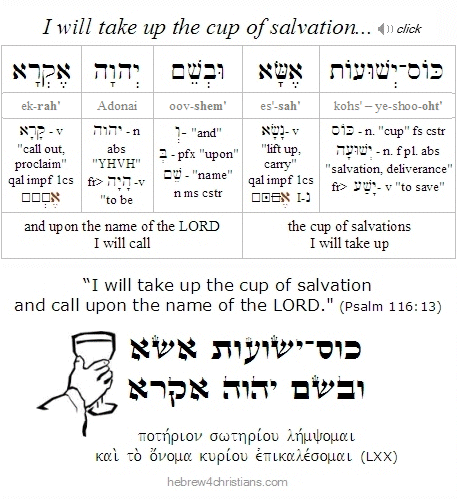
Hebrew Study Card
Cleanse out the Old Leaven...

04.10.19 (Nisan 5, 5779) Passover begins in just nine days, on Friday, April 19th at sundown! We prepare for the holiday by consciously removing the "chametz" from our lives: "Cleanse out the old leaven (חָמֵץ) that you may be a new lump, since you really are unleavened; for Messiah, our Passover lamb (משיח השה הפסח שלנו), has been sacrificed. Let us therefore celebrate the festival, not with the old leaven, the leaven of malice and evil, but with the unleavened bread (matzah) of sincerity and truth" (1 Cor. 5:7-8).
Leaven (i.e., yeast) produces fermentation, especially in bread dough, and is the result of natural processes of decay. We therefore vacuum the house, wipe down cupboards, and physically remove all bread stuffs from our dwelling places. This is in obedience to the commandment to "remove all leaven from our dwellings" (Exod. 12:5, 13:7, Deut. 16:4). On the night before Passover, we perform a ceremony called "bedikat chametz" and symbolically remove the last vestiges of bread any crumbs we may have missed.
Chametz is metaphorically regarded a corrupting influence, a hidden source of uncleanness that manipulates purer elements. Like the influence of a lump of leaven in a batch of dough, "spiritual" leaven functions as an evil impulse within us (i.e., yetzer ra: יֵצֶר רָע) that corrupts and "sours" our soul. This "yeast in the soul" is essentially pride that manifests itself in idolatrous desires and lusts. That is why unleavened bread is called the "bread of affliction" (i.e., lechem oni, literally, "bread of humiliation" or the "bread of humility").
"Cleanse out the old leaven." Ultimately the problem we have with "holiness" is that we are decidedly unholy people. This is similar to the idea that the Law is "holy, just, and good," but we are "sold into slavery to sin" (Rom. 7:12-14). But thank God for our Savior Yeshua, who imparts holiness to us and sets us free from the attempt to please God through the principle of "self-effort" (1 Cor. 1:30; Titus 3:5; Rom. 8:1-2). If any person is "in Christ," that is, united to him by the covenant of his oath of blessing, they are briah chadashah - a "new creation" - all things become new (1 Cor. 5:17). You already are unleavened (καθώς ἐστε ἄζυμοι) by the gift of God given in Yeshua our Savior (1 Cor. 5:7). Because of Him, we do not work toward a place of victory, but rather from the place of His victory (1 Cor. 15:57).
Note: We still remove leaven from our home to symbolize the inward reality of being made a new creation in Messiah, and we still observe the Passover seder because it is an affront to Yeshua our Lord who died as the Lamb of God for our sins and yet to disregard the clear teaching of Scripture not to trample underfoot the cost of his sacrifice for us....
The Limping Messiah...

[ The life is in the blood (Lev. 17:11). There is no Passover without the Lamb (Exod. 12:21) -- the wounded Lamb of God (Rev. 5:21)! ]
04.09.19 (Nisan 4, 5779) As we prepare our hearts for Passover, recall that the Hebrew verb "pasach" (פָּסַח) can mean not only "to pass over," but also "to limp," suggesting the heel of Messiah that was "bruised" in the battle for our salvation (Gen. 3:15). As it is written, "Just as Moses lifted up the serpent in the wilderness, so must the Son of Man be lifted up, that whoever believes in him may have eternal life. For God so loved the world, that he gave his only Son, that whoever believes in him should not perish but have eternal life (חַיֵּי עוֹלָם). For God did not send his Son into the world to condemn the world, but in order that the world might be saved through him" (John 3:14-17). Humanity as a whole has been "bitten by the snake" and needs to be delivered from its deadly venom. Just as the image made in the likeness of the destroying snake was lifted up for Israel's healing, so the One made in the likeness of sinful flesh was to be lifted up as the Healer of the world (Rom. 8:3). All we need to do is look up and believe...
Some people might object that the verb pasach (פָּסַח) alludes to the wounded Savior, our great Passover "Lamb who was slain" (John 1:29; 1 Pet. 1:19-20; Rev. 5:12; 13:8); however, it is evident that the Hebrew root can mean "to limp" as a result of a wound. Indeed the Hebrew participle pise'ach (פִּסֵחַ) means "lame" or "crippled" (for example, see Lev. 21:18; Deut. 15:21; 2 Sam. 9:13, etc.). Furthermore, there are several uses of the verb pasach that explicitly mean to "limp" or "be lame." For example, in 2 Sam. 4:4 it says: "and he (Mephibosheth) fell and 'became lame" (וַיִּפָּסֵחַ); in 1 Kings 18:21, we read: "how long will you limp (פּסְחִים) between two opinions?" and in 1 Kings 18:26 it is written: "and they (the priests of Baal) 'limped upon the altar" (וַיְפַסְּחוּ עַל־הַמִּזְבֵּחַ) in a pagan ritual dance. In other words there is clearly a connection between Passover and becoming wounded, and this alludes to the Suffering Servant, the Messiah, whose heel was bruised in the battle for our deliverance (Gen. 3:15). Those who wish to argue that pasach cannot refer to the "limping" of the Messiah, the Passover "Lamb of God" who was slain for our sins in the battle against the serpent, therefore have the burden to explain the meaning and usage of the verb pasach in these other verses of the Hebrew Scriptures.
Note: For more on this subject, see "The Gospel in the Garden."
Passover and Teshuvah...
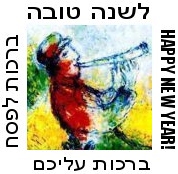
04.09.19 (Nisan 4, 5779) Since we are at the beginning of a new year, it is an opportune time to reflect on the direction of our lives... The Scriptures say: "As a person thinks in his heart, so is he" (Prov. 23:7). Consider for a moment how your thinking defines your inner reality and the quality of your spiritual life. Thinking is inextricably linked to faith, and therefore we are responsible not only for what we believe, but for how we think (Acts 17:30-31). Sinful thinking creates "negative energy" that brings pain to yourself and others. Left unchallenged, such impaired cognitive function leads to slavery of the mind, hopeless addictions of thought, and distressing captivity. The first step to freedom is to confess our sin, acknowledging the reality of our own negativity – and bringing that truth to the light. Therefore teshuvah – turning to God – involves cheshbon hanefesh (חֶשְׁבּוֹן הַנֶּפֶשׁ), accounting for our soul and yielding it to the love of God for rectification: "If we confess our sins, he is faithful and just to forgive us our sins and to cleanse us from all unrighteousness" (1 John 1:9). For freedom we have been set free, and that means freedom from the power of the lie. If we deny our own sin, we cannot confess the truth to find lasting healing (James 5:16).
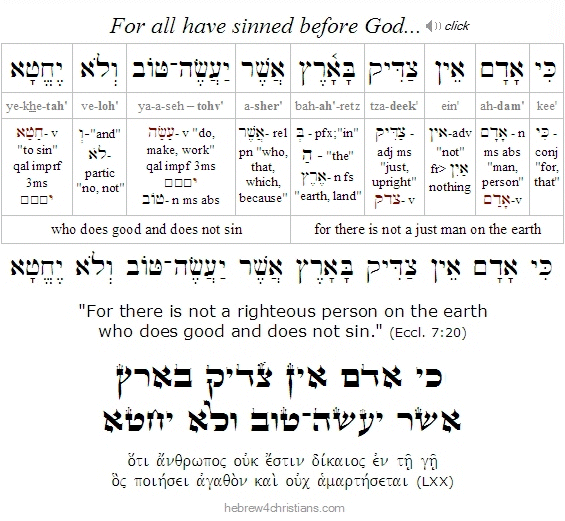 |
Honoring God's Passover...

[ The central holiday of Passover begins Friday April 19th at sundown... ]
04.09.19 (Nisan 4, 5779) It is written in our Scriptures: "Let the people of Israel keep the Passover at its appointed time (וְיַעֲשׂוּ בְנֵי־יִשְׂרָאֵל אֶת־הַפָּסַח בְּמוֹעֲדוֹ). On the fourteenth day of this month, at twilight, you shall keep it at its appointed time; according to all its statutes and all its rules you shall keep it" (Num. 9:2-3). "Observe the month of Aviv (i.e., Nisan) and keep the Passover to the LORD your God, for in the month of Aviv the LORD your God brought you out of Egypt by night" (Deut. 16:1; cp. Exod. 12:1-20). Regarding the question of whether followers of Yeshua should celebrate the festival of Passover by participating in a Yeshua-honoring Seder, the answer is a resounding YES! After all, Yeshua is the Author of the Torah and its Voice, Word, and Perfect Expression. He is the true Lamb of God (שֵׂה הָאֱלהִים) that was prefigured in the garden of Eden, exemplified in the sacrifice of Isaac (i.e., the Akedah), symbolized in the blood of the sacrifice of the lamb of God daubed in the form of a cross on the doorposts in Egypt during the great Exodus, and was finally perfectly realized in the sacrificial death and crucifixion of Yeshua during the time of the sacrifice of the korban Pesach (Passover lamb) at the Temple. Indeed the "Lord's Supper" or "Communion" is based on the Passover Seder where Yeshua explained how his sacrificial death as the Lamb of God would take away the sins of the world (see John 1:29; Luke 22:15; etc.). Therefore in the New Testament we read that the Apostle Paul instructed us to perform bedikat chametz and observe this festival: "Cleanse out the old leaven (i.e., chametz: חָמֵץ) that you may be a new lump, as you really are unleavened. For Messiah, our Passover lamb has been sacrificed (מָשִׁיחַ זֶבַח פִּסְחֵנוּ). Let us therefore keep the feast, not with the old leaven, the leaven of malice and evil, but with the unleavened bread of sincerity and truth" (1 Cor 5:7-8).
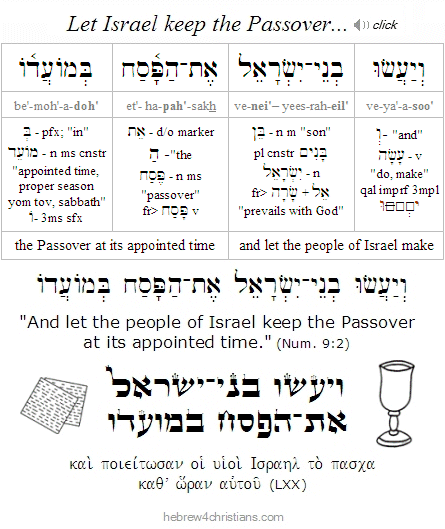 |
The Great Lamb of God...
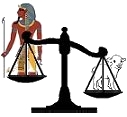
04.08.19 (Nisan 3, 5779) Though God instructed each household to select its own lamb for the Passover, the Torah refers to "the" Lamb of God, as if there was only one: "You shall keep it [i.e., the Passover lamb] until the fourteenth day of this month, when the whole assembly of the congregation of Israel shall slaughter him (אתוֹ) at twilight. Note that the Hebrew phrase translated "at twilight" is bein ha'arbaim (בֵּין הָעַרְבָּיִם) which means before the Passover began (Exod. 12:3-6). Tellingly, this prefigured the sacrifice of Yeshua who died upon the cross before the Passover was celebrated (Mark 14:41-45). Note further that
that the direct object "him". Note that the direct object "him" (i.e., oto) can be read as Aleph-Tav (את) combined with the letter Vav (ו), signifying the Son of Man who is First and Last... Indeed there is only one "Lamb of God" that takes away the sins of the world, and that is our Savior, Yeshua the Messiah...
Note that the original Passover sacrifice was not given to the Levitical priesthood as a sin offering since it preceded Sinai and the giving of the various laws concerning the sacrificial rites... Therefore the blessing, "You are blessed, LORD our God, King of the universe, who releases the captives" (i.e., matir asurim: בָּרוּךְ אַתָּה יְהוָה אֱלהֶינוּ מֶלֶךְ הָעוֹלָם מַתִּיר אֲסוּרִים), is for all people who are trusting in the blood of the Lamb for life. Indeed, in the world to come all the redeemed will sing of the Great Passover of Messiah that was foretold by Moses and fulfilled by the outstretched hands of Yeshua our LORD:
רָאוּי הַשֶּׂה הַטָּבוּחַ לְקַבֵּל גְבוּרָה
עשֶׁר וְחָכְמָה וְכּחַ וִיקַר וְכָבוֹד וּבְרָכָה
rah·uy has·seh ha·tah·voo·akh le·kab·beil ge·voo·rah,
oh·sher ve·chokh·mah, ve·koh·akh vee·kar ve·kha·vohd uv·rah·khah

"Worthy is the Lamb who was slain, to receive power and wealth and wisdom
and might and honor and glory and blessing"
(Rev. 5:12)

Hebrew Study Card
The Chosen Lamb of God...

[ The Sabbath immediately before the Passover is called Shabbat HaGadol... ]
04.07.19 (Nisan 2, 5779) The Sabbath that occurs immediately before Passover is called Shabbat HaGadol (שבת הגדול), which is associated with the selection of the sacrificial lamb four days before the time of Passover (Exod. 12:1-6). The New Testament notes that it was four days before Passover (Nisan 10) when Yeshua made His triumphant entry into Jerusalem riding on a donkey, signifying His Messiahship, in fulfillment of the prophecy of Zechariah: "Rejoice greatly, O daughter of Zion! Shout aloud, O daughter of Jerusalem! Behold, your King is coming to you; righteous and having salvation is he, humble and mounted on a donkey, on a colt, the foal of a donkey" (Zech. 9:9). During this time, when the pilgrims had come to select a lamb for their Passover sacrifice at the Temple - they saw Yeshua and cried out: hoshee'ah na (הוֹשִׁיעָה נָּא), meaning "please save" or "save now" (in English this phrase was translated from the Latin to form "Hosanna!"). The people spontaneously began singing Psalm 118:25-26 in anticipation of the great Messianic hope:
אָנּא יְהוָה הוֹשִׁיעָה נָּא
אָנָּא יְהוָה הַצְלִיחָה נָּא
בָּרוּךְ הַבָּא בְּשֵׁם יְהוָה
בֵּרַכְנוּכֶם מִבֵּית יְהוָה
an·na · Adonai · ho·shee·ah · na
an·na · Adonai · hatz·lee·chah · na
bar·rookh · ha·ba · be·shem · Adonai
be·rakh·noo·khem · mee·beit · Adonai

"Please, O LORD save us now! Please, O LORD prosper us!
Blessed is the one who comes in the Name of the LORD;
we bless you from the house of the LORD."
(Psalm 118:25-26)
Hebrew Study Card

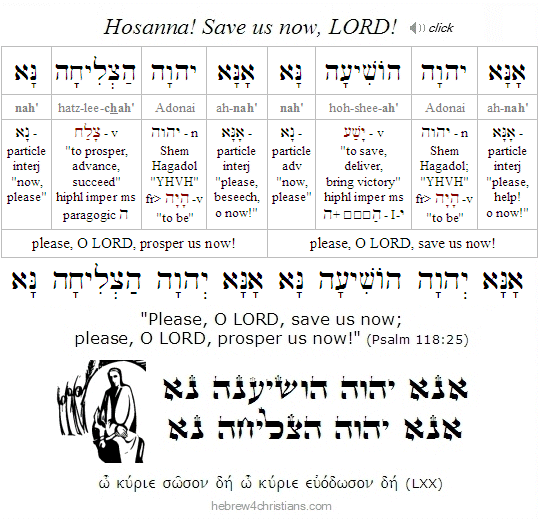
Though he came in humility, riding upon a lowly donkey, it is striking to note that once he arrived in Jerusalem for Passover, Yeshua immediately went to the Temple and drove out all who sold there, overturning the tables of the "moneychangers" and the seats of those who sold pigeons (Matt. 21:1-16). The true Lamb of God (שֵׂה הָאֱלהִים) had come! At the Temple he then healed the blind and castigated the religious authorities by stating that the praise of children overruled their objections (Psalm 8:2). Over the next two days, he was accosted by priests, scribes, Pharisees, etc. - the whole religious establishment - which culminated in his utter denunciation of them beginning in Matthew 23 ("Woe unto you..."). He then left the Temple and foretold its destruction to the disciples, going on to explain the signs of the End of the Age (אַחֲרִית הַיָּמִים) that would precede the advent of the Messianic Kingdom (Matt. 24). Yeshua was later crucified (before sundown) on Nisan 14, prophetically corresponding with the time when the Passover lambs were sacrificed at the Temple.
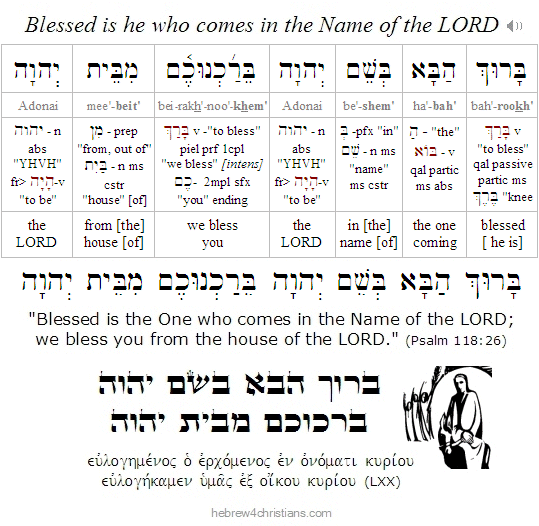 |
Note: For more on the prophetic aspects of the selection of the Passover lamb, see the Shabbat Hagadol pages. For a tentative chronology of the crucifixion, burial, and resurrection of the Messiah, see "Reshit Katzir: Messiah as the Beginning of the Harvest."
Get Ready for Passover:
Cleansing of the Leper (פרשת מצרע)
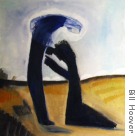
04.07.19 (Nisan 2, 5779) Recall from last week's Torah (Tazria) that if someone was diagnosed with tzara'at (i.e., "leprosy"), they were forced to live in a state of exile. The afflicted person (called a metzora) tore his clothes like a mourner, put a shroud over his face, and remained alone. If anyone came near, the person would cry out: "Unclean! Stay away! Do not become impure because of me!" While so isolated, the person would have opportunity to perform teshuvah (repentance) and to reexamine his relationship with God.
In our Torah portion this week (Metzora), we learn about the laws for cleansing "lepers" (i.e., metzorim). If the one suffering from tzara'at (i.e., the metzora) had apparently been healed, he would first call for the priest to be officially reexamined. If the priest saw no sign of tumah (uncleanness), a second examination was scheduled seven days later, and if at that time there was no further sign of disease, the process of tahara (purification) would begin.
The purification process was somewhat elaborate: After the second examination, the priest required that the metzora bring the following items for his cleansing:
- An earthenware bowl filled with spring water (mayim chayim)
- Two birds of the same type (whether turtledoves or pigeons)
- A stick of cedar wood
- A hyssop branch
- A scarlet thread
The priest then commanded that one of the birds should be slaughtered over the earthen vessel filled with fresh water, with its blood mixing with the water. The living bird, the piece of cedar, and the hyssop branch were then tied together using the scarlet thread, and the entire bundle was dipped into the earthen vessel. The blood and water mixture was then sprinkled seven times on the healed metzora, and the living bird was then set free.
Next, the healed person washed his clothes, shaved off all his hair (including his eyebrows), and bathed in a mikveh (ritual pool for cleansing). After that he could return to the camp - but he could not return to his home for another seven days. On the eighth day he would bathe again and offer several offerings (a chatat, an asham, an olah, and a minchah), but the blood from the asham (guilt) offering was mixed with oil and applied to his earlobe, thumb and foot, similar to the blood applied to the priests during their ordination. Oil from a meal offering was sprinkled seven times in the direction of the Sanctuary. Only after all this was he pronounced tahor (clean) by the priest. His life of uncleanness would be over, and he would be like a man who was brought back from the dead to new life.
This purification ritual corresponded with other rituals revealed in the Torah. The sprinkling of the hyssop by the priest recalled both the blood of the Passover lamb and the sprinkling of the ashes of the Red Heifer that cleanse from contact with death; the offering made of the two birds - one which was sacrificed and the other set free - recalled the scapegoat of the Yom Kippur ritual. The washing of garments, the shaving of all hair, and the immersion in a mikveh recalled the birth of the Jewish people at the Sea of Reeds. The blood of the guilt offering applied to the earlobe, thumb and foot, recalled the dedication of Aaron and his sons as the priests of Israel (Lev. 14:14). In other words, the individual purification process mirrored the purification of the community of Israel, and healing ultimately meant being reidentified as a redeemed child of God. In a very literal sense, then, we see how the metzora was "reborn" by water and by the blood (John 3:5; 19:34; Heb. 9:19).
Themes of the New Year...

[ The Biblical New Year begins tonight at sundown, dear friends... ]
04.05.19 (II Adar 29, 5779) A central theme of the New Year season is teshuvah (תְּשׁוּבָה), a word often translated as "repentance," though it's more accurately understood as turning (shuv) to God in response to His call. Indeed, the Hebrew word teshuvah can mean both "turning" and "answering." A related Hebrew word is nacham (נָחַם), which literally means to "sigh" as a way of expressing regret or sorrow, usually in response to something in the past. In the New Testament, the Greek word metanoia (and its related verb, metanao) is the most commonly used word to express the idea of "repentance." The compound word is formed from 'μετα' (after, with) and 'νοεω' (to think) and generally means "changing your mind" (in the noun form) or "thinking differently" (in the verb form). These words, whether expressed in ancient Hebrew or the ancient Greek, imply a change of direction, and that change ultimately begins with how we think and what we regard as truth. Threefore Yeshua's earthly ministry began with the message, "The time is fulfilled, and the kingdom of God is at hand; repent (μετανοεῖτε) and believe (πιστεύετε) in the gospel" (Mark 1:15). These two verbs (repent, believe) are in the imperative mood. We are commanded to repent, to "change our thinking" and to believe the message of God's love given in the Messiah.
Since we all necessarily must think in order to live, we should value clear thinking. This should be obvious enough, though people often make various errors and misjudgments because they devalue the effort required to carefully think through a question. As William James once said, "A great many people think they are thinking when they are merely rearranging their prejudices." When it comes to questions about the gospel, however, God regards such carelessness to be blameworthy. Again, the LORD holds us accountable for what we think and believe, especially when it comes to the reality and mission of His Son.
"Escape for your life. Do not look back..." (Gen. 19:17). You must turn away from what once defined you and never look back... This includes not only turning away from your former sins, but turning away from the guilt and shame of your sins... Living in the past, wallowing in your sin and regretting your mistakes, can cause you to feel worthless and even hopeless. If you feel compelled to revisit your former life, then be sure to do so before the foot of the cross, in light and presence of God's redemptive love for you. You can't change the past, but you can leave it behind by turning it over to God for healing. Teshuvah (repentance) means accepting who you are in light of God's love and salvation for your soul. "Brothers and sisters, I do not consider myself to have attained this, though I am single-minded: I forget the things that are behind and reach out for the things that are ahead ... heeding the upward call of God in Yeshua our Messiah" (Phil. 3:13-14). May you "find yourself in Him, not having a righteousness of your own that comes from the law, but that which comes through faith in Messiah, the righteousness from God that depends on faith" (Phil. 3:9).
 |
Shanah Tovah, friends!
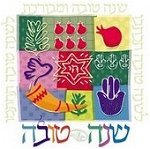
[ The Biblical New Year begins tonight at sundown, dear friends! Shanah Tovah b'Yeshua! ]
04.05.19 (II Adar 29, 5779) God is both infinitely loving and infinitely just, and both of these "attributes" are inseparably a part of who he is. God is One. Nonetheless, the cross of Yeshua proves that "love is stronger than death, passion fiercer than the grave; its flashes are flashes of fire, a raging flame, the very flame of the Lord" (Song. 8:6). It is at the cross that "love and truth have met, righteousness and peace have kissed" (Psalm 85:10). This implies that we must drop our defenses – even those supposed objections and pretenses voiced by our shame – and "accept that we are accepted." It is God's great love for you that leads you to turn to him. Allow yourself to be embraced by his "everlasting arms."
מֵרָחוֹק יְהוָה נִרְאָה לִי
וְאַהֲבַת עוֹלָם אֲהַבְתִּיךְ
עַל־כֵּן מְשַׁכְתִּיךְ חָסֶד
me·rah·chok Adonai neer·ah lee
ve·a·ha·vaht o·lahm a·hav·teekh
al kein me·shakh·teekh cha·sed

"The LORD appeared to me from far away.
I have loved you with an everlasting love;
therefore with lovingkindness have I drawn you."
(Jer. 31:3)

Hebrew Study Card
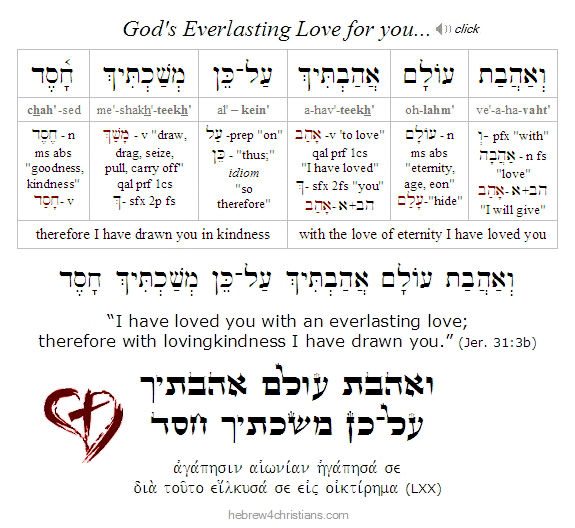
Genuine repentance will entirely change you. It is an act of profound respect over what God has done on your behalf. You say, but I am a miserable wretch! Indeed that is so, but the consciousness of your wretched state is the heart's cry for love... God goes "outside the camp" to meet with you. He enters the leper colony to join you there, in your wretchedness, and even takes upon your fatal disease. He sees you in your desperate estate and joins you there. God enters into the dust of your death and says, "Live!"
Repentance means changing your thinking, turning around to face the truth, and returning to embrace God's love. It does not identify the whole person with sin, but rather regards all people as redeemable, worthy, and valuable to God. Conviction of sin is not the end, but rather the means to newness of life. God saved us so that we could be in a love relationship with Him. We must "choose life," and that means choosing to welcome God's love into your heart. The only sin that can keep you from God's everlasting love is the denial that his love is personally for you. You must forsake seeing yourself "in the flesh" and take hold of God's spirit, his passion, and his grace for your soul. You are worthy to be loved because God is worthy to make you so. Therefore as our wonderful Savior appealed, "Repent and believe the good news" (Mark 1:5). God is love, and that love is for you.
We sincerely wish you "shanah tovah u'metukah ba'Adoneinu Yeshua ha-Mashiach" - a good and sweet year in our Lord Jesus the Messiah! May the LORD God heal you, body and soul; may He ease your pain, increase your strength, and release you from all your fears... May blessing, love, joy, and true shalom surround you and fill you with ongoing wonder and thanks. In the Name above all Names we pray: Amen.
 |
It Ain't About your Religion...
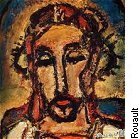
04.05.19 (II Adar 29, 5779) The message of the cross of Messiah is that your deepest need for love, peace, and happiness is not to be found in this world, nor in the religious philosophies of this world, but instead is found by being healed from the sickness of spiritual death. That's the gospel message, after all, which presents an offense to the "flesh," that is, to natural human pride and humanistic aspiration. Indeed many religious people seem to think that something more is needed than the miracle of Messiah, and they therefore both underestimate the severity of our lost condition while flattering the ego with the conceit that it can contribute something to prospect of genuine eternal life... The Apostle Paul admonished: "If with the Messiah you died to the axioms of this world, why, as though you still belonged to the world, do you submit to its presuppositions (i.e., δόγματα)?" (Col. 2:20). Religious "legalism" (i.e., adherence to formula or ritual rather than living in personal faith) is a worldly practice that leads to a false sense of security in the mantras, ceremonies, "virtue signaling," theological jargon, and various "mummeries" of religion. Worse still may such worldly religion lead to a "holier-than-thou" sense of spiritual superiority or elitism. Yeshua denounced the religionists of his day by focusing on what mattered most of all -- healing the outcasts, touching the lepers, seeking the lost, and being a "friend of tax collectors and sinners" (Matt. 11:19). Focusing on outer forms of religion -- even Torah based religion -- elevates the law to an end in itself rather than as a means to the greater end of love and healing. We have to be careful not to make an idol out of religious practices, for all the commandments are meant to serve the end of receiving God's love and sharing that blessing with others. Any "Torah observance" that leads you to "thank God that you are not like other people" (Luke 18:11) is therefore not genuine Torah observance at all, for the heart of the Torah is love, just as love is the Torah of the Gospel (John 15:12).
For more on this see "Teshuvah of the Heart."
Are you known by God?

04.05.19 (II Adar 29, 5779) Yeshua somberly warned those who professed faith: "Not everyone who says to me, 'Lord, Lord,' (אֲדנִי אֲדנִי) will enter the kingdom of heaven, but the one who does the will of my Father who is in heaven. On that day many will say to me, 'Lord, Lord, did we not prophesy in your name, and cast out demons in your name, and do many mighty works in your name?' And then will I declare to them, 'I never knew you; depart from me, you workers of lawlessness'" (Matt. 7:21-23). Despite the practice and profession of their faith, these people were strangers to God... They had a false sense of assurance, believing that they were "serving God" while they really were not... So the essential question here is whether Yeshua truly knows you. You may know something about God, religion, or "spirituality," and yet you may remain unknown by him... So where are you finding life? What are you loving? Where are you going?
"MANY will say to me in that day, Lord, Lord, have we not prophesied in thy name? and in thy name have cast out demons? and in thy name done many wonderful works?" From this we infer that good works - even those done "in the name of Messiah" - are insufficient for life, and that something more is needed... Yea, even Yeshua's sacrifice on the cross can't bring you into relationship with him apart from personally receiving it for your healing... By faith you must encounter Yeshua clothed in your flesh, bearing your sin, and suffering death for you; otherwise you remain "outside" of Messiah, in a place of exile and loss....
"And then will I declare to them, 'I never knew you; depart from me, you workers of lawlessness' (Matt. 7:23). Of course the Sovereign LORD knows all things, including the devious ways of the lawless (the word "lawless" [ἀνομία] refers to those who contemptuously spurn or "dismiss" the truth of Torah), so here we need to understand this "knowledge" as a personal heart connection, an inward trust, and an ongoing intimate communion with the LORD. It is written in Scripture, "The LORD knows the way of the righteous (כִּי־יוֹדֵעַ יְהוָה דֶּרֶךְ צַדִּיקִים), but the way of the wicked ends in destruction" (Psalm 1:6). As Yeshua said, "My sheep hear my voice, and I know them, and they follow me. I give them eternal life, and they will never perish..." (John 10:28-19). Notice that the deciding factor turns on whether you are in relationship with Messiah: "This is the work of God, to trust in the One whom God has sent [for you]" (John 6:28-29). This is the will of the Father, the true Torah of the LORD, namely, to honor the Messiah and believe in his salvation... This is the work of faith. You trust him for eternal life, you believe that he bears your sins, you seek to know his heart, and you desire to share your life with him. It is lawlessness to reject the Torah of the LORD that commands us to follow Messiah and know him in all our ways - including the ways of our struggles, our fears, and so on. Each of us must wrestle alone, in the dark places of fear, to find our new name from God (Gen. 32:24). Is the blessing for you or not? The essential thing is to know (and more importantly) to be known by Yeshua...
"I am trying here to prevent anyone saying the really foolish thing that people often say about Him: I'm ready to accept Jesus as a great moral teacher, but I don't accept his claim to be God. That is the one thing we must not say. A man who was merely a man and said the sort of things Jesus said would not be a great moral teacher. He would either be a lunatic — on the level with the man who says he is a poached egg — or else he would be the Devil of Hell. You must make your choice. Either this man was, and is, the Son of God, or else a madman or something worse. You can shut him up for a fool, you can spit at him and kill him as a demon or you can fall at his feet and call him Lord and God, but let us not come with any patronizing nonsense about his being a great human teacher. He has not left that open to us. He did not intend to." (C.S. Lewis: Mere Christianity, 1952)
There are two great questions God always is asking us. The first is "who do you say that I am?" and the second is "will you make a place for me?" Being in a love relationship with God is the goal of life, the "end of the law," and the reason we were created. But we cannot love God apart from understanding his passion for us. The LORD is the "Jealous God," a Consuming Fire, the One who desires all of our heart on the altar (Luke 9:23). Therefore the very first commandment is simply אָנכִי יְהוָה אֱלהֶיךָ, "I AM the LORD your God" (Exod. 20:2), because without "making a place" God's love within your heart, nothing else will follow.
Our Daily Deliverance...

04.05.19 (II Adar 29, 5779) Just as we ask God for our "daily bread" (לֶחֶם חֻקֵּנוּ), so we ask for our daily deliverance: "Lead us not into temptation, but deliver us from the evil one" (Matt 6:13). Note that the term translated "evil" in many translations ("deliver us from evil") is a substantive rather than an adjective: τοῦ πονηροῦ, the evil one... "Give us this day our daily deliverance from the evil one...." Our daily bread and our daily deliverance are connected with our decision to "choose life" (בַּחַרְתָּ בַּחַיִּים) -- and to always choose life -- even in moments we find difficult, distressing, and even when we might wish that we were no longer living... Choosing life means refusing to practice "bad faith" by evading the eternal significance of our choices; it means finding the will to regard life as worthy; it implies that we will eat our bread in trust that the Lord is at work even in the darkest of hours (Passover occurred at midnight)... Choosing life means refusing to eat the fruit of death and to seek Yeshua, the Tree of Life. We live one day at a time; we only have today. We are given daily bread for this hour of our need. Today is the day of your deliverance - if you are willing to walk in it. Therefore, the Spirit of the Living God cries out, "Choose life and live!"
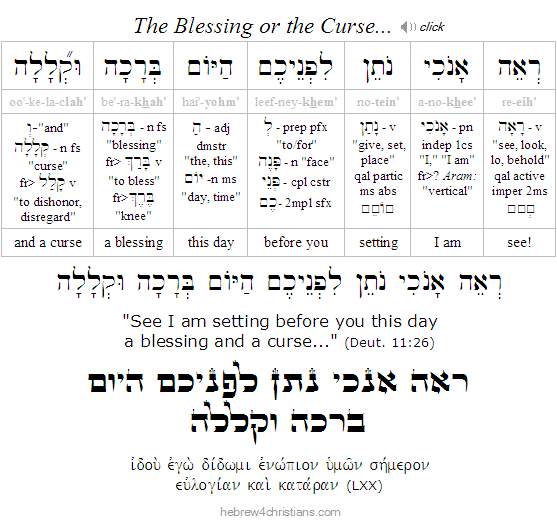 |
"Do not be grieved [even over yourself], for the joy of the LORD (חֶדְוַת יְהוָה) is your strength" (Neh. 8:10). Affirming the love, faithfulness, compassion, and salvation of God is a powerful way to defeat the enemy of our souls, who regularly entices us to despair. King David constantly asked God to help him in his spiritual struggles. "Though I walk in the midst of trouble (בְּקֶרֶב צָרָה), you preserve my life; you stretch out your hand against the wrath of my enemies, and your right hand delivers me" (Psalm 138:7). "For the enemy has pursued my soul; he has crushed my life to the ground; he has made me sit in darkness like those long dead. Therefore my spirit faints within me; my heart within me is appalled" (Psalm 143:2-3). Despite whatever struggle we may face, "the LORD is near to the brokenhearted and saves the crushed in spirit (Psalm 34:18). Indeed, the Lord God is far greater than your heart's sin and will one day entirely deliver you of sin's effect and influence. Amen.
Rosh Hashanah of Spring...

[ The following is related to the Biblical New Year and the theme of teshuvah (repentance)... ]
04.05.19 (II Adar 29, 5779) Spiritual danger is just as real as physical danger, though most people pretend it isn't because it isn't easily seen. The real dangers of life are not vulnerability to crime, sickness or some accident, however, but rather susceptibility to despair, the tendency to put off repentance, and the possibility of not dying well.... It is a great danger to walk through life asleep only to be jolted awake upon the day of death. "The greatest danger is that one does not discover, that one is not always discovering, that one is in danger" (Kierkegaard). Danger of what? Of wasting your life with trifles and vanities; of never learning how to truly love or to be loved; of becoming numb, unfeeling, and therefore unmoved by your need for God. As C.S. Lewis once wrote, "The safest road to hell is the gradual one - the gentle slope, soft underfoot, without sudden turnings, without milestones, without signposts." Therefore during this season we cry out: Hashivenu Adonai eleykha venashuvah: "Return us to You, O LORD, and we shall return..." (Lam. 5:21).
הֲשִׁיבֵנוּ יְהוָה אֵלֶיךָ וְנָשׁוּבָה
חַדֵּשׁ יָמֵינוּ כְּקֶדֶם
ha·shee·vay·noo Adonai e·ley·kha ve·nah·shoo·vah
kha·daysh ya·may·noo ke·ke·dem

"Turn us back to yourself, O LORD, so that we may return to you;
renew our days as of old" (Lam. 5:21)

Hebrew Study Card

More than Half-Way...

[ The following is related to our Torah reading this week, parashat Tazria... Shanah Tovah! ]
04.05.19 (II Adar 29, 5779) Although the priest needed to go "outside the camp" to examine a metzora (i.e., "leper"), the person still needed to "be brought" to the priest to meet him there, while he or she was in a state of exile (Lev. 14:2-3). In other words, the afflicted one was required to meet the priest "half-way." However, the love of God is so great that He reached out and touched us by becoming a "leper" for us, choosing even to die in exile - "outside the camp" - to eternally purify us from our sins... In that sense, our great High Priest Yeshua surely meets us far more than "half-way," since He "emptied Himself" (κενόω) of his heavenly glory and willingly descend into the "leper colony" of humanity, bearing our sickness, shame, and the sting of death itself on our behalf. As it is written: "But [He] made himself nothing (εκενωσεν), taking the form of a slave, being born in the likeness of men; and being found in human form, he brought himself low by becoming obedient to the point of death, even death on a cross" (Phil 2:7-8).
Atonement and Blood...

[ The following is related to our Torah reading this week, parashat Tazria... Chodesh Tov! ]
04.05.19 (II Adar 29, 5779) Though the gift of human life (i.e., conception / birth) is rightly regarded as one of the greatest events in the world, the Torah states that it begins in impurity (טֻמְאָה), indicating that natural life by itself is insufficient for attaining spiritual life (John 3:7). Hence we read in our Torah portion that the birth of a child results in impurity for the mother that required blood atonement (Lev. 12:2,7). A new mother is treated as a niddah (a menstruent woman) and is considered impure (i.e., tamei, טָמֵא) for 40 days (if a boy) or 80 days (if a girl). Only after making an offering of blood (e.g., a lamb, a young pigeon, or a turtledove) was she declared "clean" (טָהֵר) by the priests. This was also true of Miriam (i.e., Mary, the mother of Yeshua) who fulfilled her "days of purification" and offered the prescribed sacrifices according to the law (Luke 2:22-24).
The Torah makes it clear that blood (דָּם) is used as a means of consecration as well as a means of obtaining atonement (כַּפָּרָה) with God. Blood was used on the doorposts of the houses in Egypt to ward off judgment and was later used to ratify the covenant given at Sinai (Exod. 24:8). All the elements of Mishkan (Tabernacle) were likewise "separated" by its use: The altar, the various furnishings of the Temple, the vestments of the priests, and even the priests themselves were sanctified by blood (Exod. 29:20-21, Heb. 9:21). But ultimately blood was used to "make atonement" for the soul upon the altar. As the Torah (Lev. 17:11) plainly states: "For the life of the flesh is in the blood (כִּי נֶפֶשׁ הַבָּשָׂר בַּדָּם), and I have given it for you on the altar to atone (לְכַפֵּר) for your souls, for it is the blood that makes atonement by the life (כִּי־הַדָּם הוּא בַּנֶּפֶשׁ יְכַפֵּר)." Blood is therefore connected to the holiness of life through sacrificial death...
Note: The concept of "unclean" has connotations that are negative and alien to the Hebrew concept of tumah (טָמְאָה), the noun, or tamei (טָמֵא), the adjective. The word tumah derives from the root word "atum" (אָטוּם) which means "impenetrable," "set apart," or "sealed off." There are a lot of opinions why the period of being set apart is 40 days for the birth of a boy but is doubled to 80 days for the birth of a girl, some quite esoteric (e.g., since a woman's separation is 40 days, a second woman's separation, i.e., that of the baby girl, is also taken into account). The important thing to note, however, is that the time of "impurity" is a "hands-off" time, set apart, intended for sacred purposes. Thus birth and death are times of tumah where people are released from the ordinary to encounter the extraordinary.
For more on this subject, see the "Atonement and Blood" article.
Projection and Mirrors...

04.05.19 (II Adar 29, 5779) Our Torah portion for this week (i.e., parashat Tazria) discusses purification from a spiritual disease called tzara'at (צָרַעַת), often inaccurately translated as "leprosy." The early sages noted that the Hebrew word tzara'at may be read as "tzar ayin" (צַר עַיִן), meaning a stingy or arrogant eye... And just as our words reveal what is within our hearts (Luke 6:45), so do our eyes (Luke 11:34; Matt. 15:19). How we look upon others is a function of how we see ourselves; and therefore we all share in the disease of our fellows. The leprous person who has the disease shall wear torn clothes and let the hair of his head hang loose, and he shall cover his upper lip and cry out, 'Unclean, unclean.' The sages interpret, "Unclean, unclean!" (Lev. 13:45) to mean that the one who is unclean calls others "unclean," which is to say, he projects his own defects onto others. As the Baal Shem Tov noted, "Sinners are like mirrors. When we see faults in others, we must understand that they only reflect the evil within ourselves." Healing comes when we understand that we all are affected by sin and sickness, and when we criticize others, we condemn ourselves (Rom. 2:1). There is much in all of us that remains broken, unclean, and in need of God's touch. Love uses the "good eye" (ayin tovah) to believe in the good, even if that good is yet unseen (Heb. 11:1). "Love bears all things, believes all things, hopes all things, and endures all things" (1 Cor. 13:7), and that includes for our healing.
May the LORD heal our sicknesses by teaching us to see from the perspective of His love...
Purification and Healing...

[ The following is related to our Torah reading for this week, parashat Tazria... ]
04.05.19 (II Adar 29, 5779) The cleansing of a metzora (i.e., "leper") corresponded with other significant sacrificial rituals given in the Torah. The sprinkling of the hyssop by the priest recalled the blood of Passover; the offering made of the two birds - one which was sacrificed and the other set free - recalled the scapegoat of the Yom Kippur ritual. The washing of garments, the shaving of all hair, and the immersion in a mikveh (a pool of fresh water) recalled the birth of the Jewish people at the Sea of Reeds. Finally, the blood of the guilt offering sprinkled on the earlobe, thumb and foot, recalled the dedication of Aaron and his sons as the priests of Israel (Lev. 14:14). In other words, the individual purification process mirrored the purification of the community of Israel, and healing ultimately meant being re-identified as a redeemed child of God. In a very literal sense, then, we see how the metzora was "reborn" by water and by the blood (John 3:5; 19:34; Heb. 9:19).
Of the Messiah it is written: "He is despised and rejected of men, a man of pains (אִישׁ מַכְאבוֹת) and acquainted with sickness (וִידוּעַ חלִי), and we hid as it were our faces from him. He was despised and we esteemed him not. Surely he has carried our sicknesses (חֳלָיֵנוּ) and borne our pains (מַכְאבֵינוּ), yet we esteemed him as plagued (נָגַע), smitten of God (מֻכֵּה אֱלהִים) and oppressed. But he was pierced (מְחלָל) for our transgressions (פְּשָׁעֵנוּ), he was crushed for our iniquities (עֲוֹנתֵינוּ): the discipline for our peace was upon him (מוּסַר שְׁלוֹמֵנוּ עָלָיו); and in his blows we are healed. All we like sheep have gone astray; we have turned every one to his own way, but the LORD has attacked in him (הִפְגִּיעַ בּוֹ) the iniquity of us all" (Isa. 53:3-6). Through the substitutionary sacrifice of the righteous Suffering Servant, Yeshua, we are both forgiven and made free from the power of sin and death. Because of Him we are no longer "lepers" or outcasts from the community of God but are made clean through His loving touch.
Notice that the word translated "blow" (i.e., חַבּוּרָה, "wound" or "stripe") comes from the same root as the word "friend" (חָבֵר), and therefore we can read this as "in His friendship we are healed." Yeshua gave up His life for us so that we could become his friends... As He later told us regarding his sacrifice: "Greater love has no one than this, that one lay down his life for his friends" (John 15:13). Indeed of Yeshua it may truly be said, Yesh ohev davek me'ach – "there is a friend who sticks (davek) closer than a brother" (Prov. 18:24).
Note: For more on this subject, see the article: "Thoughts on Holiness."
 |
Matters of Death and Life...

04.05.19 (II Adar 29, 5779) Our ability to use language is perhaps what most differentiates us from animals -- and what most closely links us to God Himself. Indeed, words (i.e., devarim) and rationality (הִגָּיוֹן) are central to tzelem Elohim, the image of God, even as Yeshua represents this image most perfectly as devar Elohim (דְּבַר הָאֱלהִים), the "Word (λόγος) of God" (Heb. 1:3, John 1:1). Just as the Word of God resounded, "Let there be Light, and there was Light (Gen. 1:3), so our words are the medium of how we experience and understand reality. Words, then, are powerful and can bring forth light and life, though tragically, they can cause darkness and death, too. As it is says in Proverbs: מָוֶת וְחַיִּים בְּיַד־לָשׁוֹן / "Life and death are in the power of the tongue" (Prov. 18:21).
מָוֶת וְחַיִּים בְּיַד־לָשׁוֹן
וְאהֲבֶיהָ יאכַל פִּרְיָהּ
mah·vet · ve·cha·yeem · be·yad · lah·shohn
ve·oh·ha·vey·ha · yoh·khal · peer·yah

"Death and life are in the power of the tongue,
and those who love it will eat its fruits" (Prov. 18:21)
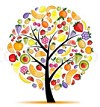
Hebrew Study Card
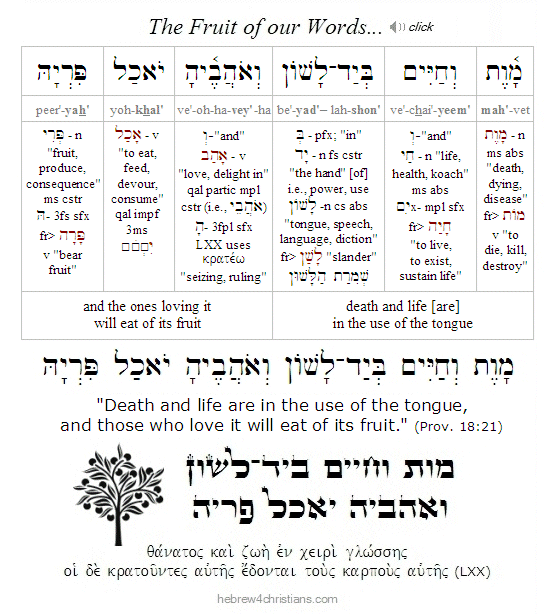 |
The midrash notes the morphological similarity between the word devarim (i.e., דְּבָרִים, words) and devorim (דְּבוֹרִים, bees). The words of Torah can give joy and sweetness to those who heed them (Psalm 19:10), but they are a deadly poison to those who do not: "Just as the honey of the bee is sweet and its sting is sharp, so, too, are the words of Torah." Likewise, our words can either be used to build up, edify, and comfort others, or they can be used to tear down, deliver poison, and cause pain. Most cases of violence - domestic or otherwise - begin with verbal abuse... In this connection the Talmud (Arachin 15b) states that a person can cause others to live or die with his or her speech. You can breath life into another person by encouraging them, teaching them, and affirming them, or you can slay another person by slandering them, humiliating them, or ignoring them. In either case our words about others fall back upon us - an echo of what is within our own hearts - and define who we are...
Hurting others with our words is regarded as a terrible sin (lashon hara) that is linked with spiritual leprosy (i.e., tza'arat). One who publicly embarrasses another so the person's color changes (i.e., either blushes or turns ashen) is judged as if he spilled blood. This is sometimes called ona'at devarim, i.e., "stealing words" in service to a critical spirit that humilates or debases others. It is a sort of "soul murder" and its practitioners are likened to verbal terrorists. Yeshua said that calling someone an "empty-headed fool" (ῥακά) puts you in danger of moral condemnation, but calling someone a "rebel" or "godless person" (μωρός) puts you in danger of eternal damnation itself (Matt. 5:22). This is "like-for-like" justice. Our words of criticism reveal an illegitimate sense of self-righteousness that turns a blind eye toward our own defects of character. Yeshua advises: "Let what you say be simply 'Yes' or 'No'; anything more than this comes from evil" (Matt. 5:37).
In Pirkei Avot we read, "If there is no Torah study there is no proper conduct; if there is no proper conduct there is no Torah study. If there is no wisdom there is no fear of God; if there is no fear of God there is no wisdom... If there is no flour (sustenance) there is no Torah; if there is no Torah there is no flour" (Avot 3:21). In other words, reverential respect precedes Torah, and our actions (and this includes our use of words and the underlying thoughts and attitudes they express) always trump the mere profession of faith upon our lips. Joy, like true love (or a cough), cannot be hidden... "He [Ben Azza] would say: Do not scorn any man, and do not discount anything. For there is no man who has not his hour, and no thing that has not its place" (Avot 4:3).
It's been said that "hurt people hurt people." Embracing the truth that you are of infinite worth and dignity is the first step of deliverance from a heart of malice and ill-will. May it please the Lord to give us a "good eye" -- and a heart that affirms words of life, love and grace both for ourselves and for others. "Let the words of my mouth, and the meditation of my heart, be acceptable in thy sight, O LORD, my Rock and my Redeemer" (Psalm 19:14).
Living in Perilous Times...
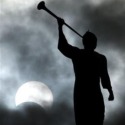
04.04.19 (II Adar 28, 5779) "Light has come into the world, but people love darkness rather than light, because their deeds are evil" (John 3:19). "For all who practice sin are the slaves of sin," made captive to the devil and to his will (John 8:34; 2 Tim. 2:26). Politicians may promise people "freedom," but they themselves are "slaves of corruption, for whatever overcomes a person, to that he is enslaved" (2 Pet. 2:19). Yeshua forewarned the moral depravity that would pervade mankind just before the time of his return: "Because lawlessness (i.e., ἀνομία, from -α ('not') + νομος, 'torah') will be increased," he said, "the love of many will grow cold (i.e., ψύχομαι, 'be extinguished')" (Matt. 24:12). Likewise the Apostle Paul forewarned: "But know this also, that in the last days perilous (χαλεποί) times shall come" (2 Tim. 3:1). Note that Paul used the same adjective to describe these times (i.e., χαλεπός, "perilous") that is used elsewhere to describe the fierce character of demonaics (Matt. 8:28). Indeed, the word "perilous" likely comes from a Greek verb (χαλάω) that means "to let down from a higher place to a lower," thereby creating a sort of spiritual "chasm" or rift, which again suggests that demonic activity will be increased upon the earth. Therefore, in light of the spiritual war that rages all around us, it is vital that we remain firmly rooted in what is real by taking hold of our identity and provision as children of God. As is written: "God has not given us the spirit of fear, but of power (δύναμις) and of love (ἀγάπη), and of a sound mind (σωφρονισμός), i.e., a "delivered" mind, a mind "healed" from carnal fears (2 Tim. 1:7). We are not to be troubled like the world that lives in terror of man, nor are we to crave vain "security" from the devices of political deceivers. No - we must look to God Almighty, the Master of the Universe. He alone is our Refuge and Defense, the One who gives us steadfast power and love in the midst of these storms.
We must stay vigilant, friends. "For you yourselves are fully aware that the Day of the LORD (יוֹם־יְהוָה) will come like a thief in the night" (see Matt. 24:42; 2 Pet. 3:10; Rev. 3:3; 16:15). While people are saying, "There is peace and security," then sudden destruction will come upon them as labor pains come upon a pregnant woman (i.e., the birthpangs of Mashiach: חֶבְלֵי מָשִׁיח), and they will not escape. But you are not in darkness, brothers, for that day to surprise you like a thief" (1 Thess. 5:2-4). Note that a characteristic of this season will be a emphasis on peace and "security," that is, setting up a ubiquitous surveillance and security grid to monitor and control people... In light of this, "let us not sleep, as others do, but let us keep awake and be sober.. having put on the breastplate of faith and love, and for a helmet the hope of salvation (ἐλπίδα σωτηρίας). For God has not destined us for wrath, but to obtain deliverance through our Lord Yeshua the Messiah" (1 Thess. 5:6-9).
Dear brothers and sisters, fear no one - no man, no devil, or any other thing - but only God, which is to say, be mindful of your own heart and the terrible risk of losing sight of God's wonder, love, and blessing... There is no fear in his love (1 John 4:18).
The Better Covenant...

04.04.19 (II Adar 28, 5779) Though Moses was instructed to make the Mishkan (i.e., "Tabernacle") according to the "pattern" revealed at Sinai (Exod. 25:9,40), King David -- by direct revelation of the Holy Spirit -- later changed the size of the Tabernacle and its vessels, made additions to the original design, and even changed the priestly order of service itself (see 1 Chron. 28:11-20). King David's vision shows us that both the structure and service of the Tabernacle were provisionally intended to give physical expression to a deeper spiritual reality, and indeed the New Testament calls the service of the Temple "a copy and shadow (ὑποδείγματι καὶ σκιᾷ) of the heavenly things" (Heb. 8:5). But what were these heavenly things if not the ministry of Yeshua as our High Priest of the New Covenant? The New Covenant (בְּרִית חֲדָשָׁה) is called a "better covenant based on better promises" (Heb. 8:6), that was "not like the covenant that I made with their fathers on the day when I took them by the hand to bring them out of the land of Egypt" (see Jer. 31:31-33). Our Scriptures comment: "In speaking of a new covenant, he has made the first one obsolete, and what is becoming obsolete and growing old is ready to vanish away" (Heb. 8:13). Likewise we read, "When Messiah appeared as high priest of the good things that have come, then through the greater and more perfect tabernacle (not made with hands, that is, not of this creation), he entered once for all into the holy places, not by means of the blood of goats and calves but by means of his own blood, thus securing an eternal redemption" (Heb. 9:11-12). The earlier Levitical priesthood and its sacrificial system was "a shadow (σκιᾷ) of the good things to come, and not the true form (i.e., substance) of these realities" (Heb. 10:1).
Moses was at first commanded, "Follow the pattern of the vision..." (Exod. 25:40); King David later instructed his son regarding the vision for the Holy Temple, "do the work according to the revealed plan..." (1 Chron. 28:19); but Yeshua our LORD declared: "The One greater than the Temple is here" (Matt. 12:6).
"And they came to Jerusalem. And He entered the Temple and began to drive out those who sold and those who bought in the Temple, and he overturned the tables of the money-changers and the seats of those who sold doves. And he would not allow anyone to carry any vessel through the Temple." - Mark 11:15-16
Note that during this "cleansing of the Temple," Yeshua actually stopped the performance of the priestly duties: he "would not allow anyone to carry any vessel through the Temple," which interrupted the course of the priestly service itself. Let that sink in....
A principle of valid interpretation is that "a text without a context is a pretext." Therefore it is important to remember to carefully study the Torah of Moses, the prophets, and the Writings, since without the Tanakh (i.e., the "Old Testament") the new covenant scriptures are without context (1 Cor. 10:6; 2 Tim. 2:15, etc.). Moreover, Yeshua himself said: "Search the Scriptures, for in them you think you have eternal life, yet these very Scriptures testify of me" (John 5:39). Indeed Yeshua preached that he came to fulfill the true purpose of the law (Matt. 5:17-19), and to his disciples he interpreted that fulfillment: "And beginning with Moses and all the Prophets, he interpreted to them in all the Scriptures the things concerning himself.... "Then he said to them, 'These are my words that I spoke to you while I was still with you, that everything written about me in the Law of Moses and the Prophets and the Psalms must be fulfilled.' And then he opened their minds to understand the Scriptures" (Luke 24:27,44-45). The New Testament itself assumes that followers of Yeshua would be study and be familiar with the Hebrew Scriptures. When the Apostle Paul wrote, "All Scripture is breathed out by God and profitable for teaching, for reproof, for correction, and for training in righteousness" (2 Tim. 3:16), he was referring to the Jewish Bible, of course, since the New Testament writings had not yet been compiled....
As for the moral aspect of the law, however, the Torah of Yeshua is superior to that of the lawcode of Moses (especially as it was interpreted by the Pharisees), since Yeshua constantly focused on the heart and its inner motivations... That's the essential point of the Sermon on the Mount and the description of the law's true requirement (see Matt. 5:21-48). Notice how Yeshua quotes from the law and then moves it "inward," to be about the heart rather than mere external conformity. The deepest point, however, is that Yeshua is the Substance of the Temple and its fullest expression. He is the Great Lamb of God who offered himself up as our atoning sacrifice upon the cross, "bearing our griefs and carrying our sorrows, wounded for our transgressions and crushed for our iniquities" (Isa. 53). There is an altar wherein those who serve under the Levitical system of worship have no right to eat (Heb. 13:10).
Rest for your Soul...

04.04.19 (II Adar 28, 5779) Yeshua says, "Come to me, all who labor and are heavy laden, and I will give you rest. Take my yoke upon you, and learn from me, for I am gentle and lowly in heart, and you will find rest for your souls" (Matt. 11:28-29). When he said, "Live in me, and I will live in you" (John 15:4), he didn't insist you first be found worthy or good; no, he set no other condition than that of trust: "Now are you clean through the word which I speak" (John 15:3). The separation is gone; God has made the way past your shame. You are invited to come, so come just as you are, come without delay, but come trusting that you are entirely welcome because of who Yeshua is and what he has done for you...
O Lord, help us to be in that life you so freely give.... help us to come.
An End to Our Darkness...

04.04.19 (II Adar 28, 5779) In our struggle against the darkness, there is good end coming, so don't let your heart grow numb. Never give up hope. The Spirit says: "Be silent before the LORD and wait patiently for him; do not burn with anger over the one who prospers in his way, over the man who carries out evil schemes. Abandon your anger and forsake your rage. Do not burn with anger: it tends only to distress. For the evildoers shall be cut off, but those who keep hope in the LORD shall inherit the land. In just a little while, the wicked will be no more; though you look carefully at his place, he will not be there" (Psalm 37:7-10). Amen, halevai, let it be so, O God...
וְעוֹד מְעַט וְאֵין רָשָׁע
וְהִתְבּוֹנַנְתָּ עַל־מְקוֹמוֹ וְאֵינֶנּוּ
ve·ohd · mei·aht · ve·ein · rah·sha
ve·heet·boh·nan'·ta · al-mei·koh·moh · ve·ei·ne'·noo

"In just a little while, the wicked will be no more;
though you look carefully at his place, he will not be there."
(Psalm 37:10)

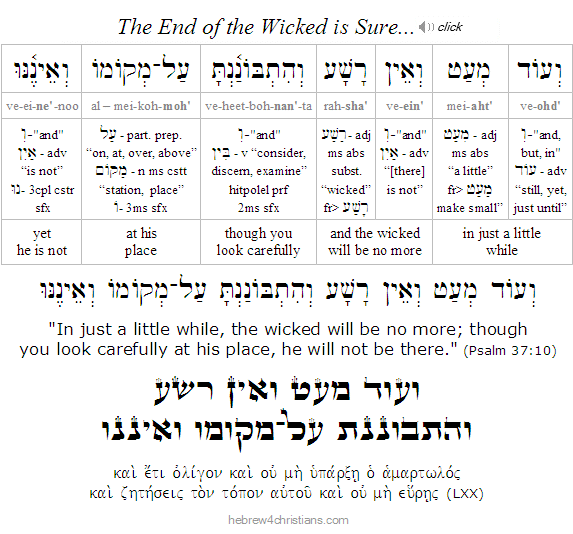
Just a little longer (ohd me'at) and there will be no wicked one (ve'ein rasha). Soon God will utterly vanquish wickedness, though in the present hour such hope might seem distant and far away. Stay strong in your desire for God's Name to be vindicated, for righteousness and love to shine as the noonday. Take hold of this vision through tevunah (understanding), and contemplate that there will be "no place" for the wicked one: wickedness itself will be driven away like dissipating smoke. Moreover, it is not only the wicked of this world, but our own inner wickedness that will find no place, for in the world to come we will be free from not only sin's influence but also sin's presence within our own hearts... Maranatha!
Perfect Love (אהבה שלמה)...

04.03.19 (II Adar 27, 5779) The gospel reveals God's passion for us, the call of his heart, his desire to elevate us to the role of the beloved, and we respond by accepting Him as the great Lover of our souls, the "ultimate concern" of our life. Sin threatens to seduce us away from God's love, to interfere with our relationship, which evokes God's "jealousy" to protect love from loss. It is written that "perfect love casts out fear" (1 John 4:18), but perfect love (τελεία ἀγάπη) must be "perfect," that is, reciprocal, complete, consummated, and alive with passion. In Hebrew, perfect love is "shalem" - that is, whole, healed, and unified (i.e., ahavah shlemah: אהבה שלמה). Perfect love is both given and received... It is not "perfect love" to objectively accept that God loves you in Jesus. No, you must receive this as an inward passion, you must live within it, must embrace it, take possession of it, and let it fill your heart to abundance. This love, this "perfect love," then will cast away your fear of being unwanted, rejected, and abandoned. But to know this love, you have to open your heart and accept it as your own; you have to accept yourself as the beloved of God:
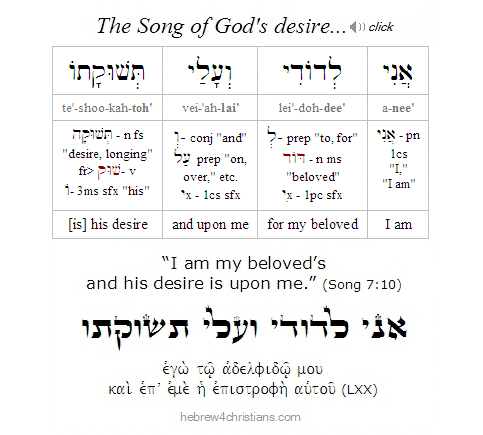 |
A New Beginning...

[ The Biblical Year (Rosh Chodashim) begins this Friday at sundown (i.e., Nisan 1, 5779), which means that Passover begins in two weeks, on April 19th at sundown. Shanah Tovah! ]
04.03.19 (II Adar 27, 5779) The very first word of the Torah indicates the significance of time, namely, bereshit (בְּרֵאשִׁית) - "in the beginning..." (Gen. 1:1), and according to tradition, the very first commandment given to the children of Israel (as a whole) was that of Rosh Chodesh (ראש חודש), or the declaration of the beginning (i.e., rosh) of the "new month," and particularly the very first month of their redemption (see Exod. 12:2). In other words, Passover month (i.e., chodesh yeshuah) was to begin Israel's year, and indeed the sacrificial system itself (i.e., the Tabernacle) was consecrated precisely on the new moon of the first month (Exod. 40:2). Note that the Hebrew word for month (i.e., chodesh) comes from the root chadash (חָדָש), meaning "new," and therefore the Passover redemption was intended to mark a "new beginning" for the Jewish people. And indeed, God marks the start of our personal redemption as the beginning of our life as a new creation (2 Cor. 5:17), just as Yeshua is the "first of the firstfruits" of God's redeemed humanity (1 Cor. 15:45-49).
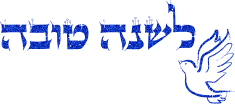 |
Discovering the Sacred Center...
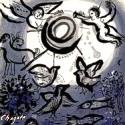
04.02.19 (II Adar 26, 5779) It is written in our Scriptures, θεὸς ἀγάπη ἐστίν, "God is love," which means that God's compassion and kindness are bound to his very essence and nature, and therefore our task is not to seek God's love but to remove all the barriers within us that we have built against receiving it... Discovering what hinders our reception of love does not come from human analysis, however, as if we could take ourselves apart to find some reason for our fear. No, the best way to overcome barriers of the heart is to be still, seek silence, and pray - for this enables us to get in touch with the "sacred center," that is, the realm of holiness where God dwells. When we empty ourselves, turning to God for love, we will hear the Spirit whispering back to us: "Be not afraid..." "Live in me..." "Walk in the light..." "I am with you always..." "You are loved..."
Getting Ready for Passover...

04.02.19 (II Adar 26, 5779) Preparing for Passover usually begins a full month before the holiday arrives, just after the festival of Purim (or at the latest around the time of the New Year of spring, i.e., Nisan 1). Since no leavened bread may be eaten during all seven days of Passover, we make a special effort to remove leaven entirely from our homes, in obedience to the Torah's command (see Exod. 12:15). Spiritually understood, we remove chametz to symbolize that we are making a radical break from the past by becoming a new "substance," as Paul instructed: "Cleanse out the old leaven that you may be a new lump, as you really are unleavened: for Messiah our Passover Lamb has been sacrificed for us. Let us therefore celebrate the festival, not with the old leaven, the leaven of malice and evil, but with the unleavened bread of sincerity and truth" (1 Cor. 5:7-8). Note that the Greek text uses an imperative verb here (ἐκκαθάρατε): "You cleanse out (i.e., purge, as in catharsis) the old leaven so that you may become a new lump (ἵνα ἦτε νέον φύραμα)" since you have indeed been made new because of what Messiah has done for you." This is a matter of faith, friends, as you "become who you are" by means of trusting in the Salvation of the God of Israel.
 |
"A little leaven leavens the whole lump..." Chametz (i.e., leaven) is considered a corrupting influence, a hidden uncleanness that manipulates purer elements. Like the influence of a lump of leaven in a batch of dough, "spiritual" leaven functions as an evil impulse within us (i.e., yetzer ha'ra: יֵצֶר הַרָע) that corrupts and "sours" our soul. You cannot include a little sin in your life without it affecting your whole spiritual life. This "yeast in the soul" is essentially pride that manifests itself in idolatrous desires and lusts (the "puffed up" rise of the flesh in opposition to God). A practical way to observe the commandment to purge out the old leaven is not only to physically remove leaven from your home, but to look within you heart to see what corrupts and enslaves you in the physical, emotional, and intellectual realms of your life. Are you addicted to pleasure? power? approval from others? Are you enslaved to pride or fear? What holds your attention? What moves your behavior? This is part of the "search for chametz" in your life. Take a few moments to write down all the things that have enslaved you and then tear the list into small pieces. Before Passover arrives, take the torn pieces and burn them in a fire, symbolizing the end of your former life and the making of all things new. "Therefore if any person is in Messiah, he is a new creation: old things are passed away; behold, all things become new" (2 Cor. 5:17).
Related Topics:
Audio Discussions:
The Meaning of Life...

04.02.19 (II Adar 26, 5779) The Hebrew word for "life" is chayim (חַיִּים), a plural noun that contains two consecutive letter yods (יי) that picture two "hands held together" (the Hebrew word yad [יָד] means "hand"), or the union of our spirit with God's Spirit. The word itself reveals that there is no life apart from union with God, who extends his hand to you and says, "Live in me" (John 15:4). Live in God, who is your life, your Beloved, your light, your truth, your healing, your beauty, your breath, and your salvation. Yeshua is the Source of all life, and we find nourishment, strength, and fullness of joy as we connect with his life. The Lord is our light and our salvation, the Mediator of divine life (Psalm 27:1; John 1:4). The Voice of the LORD still speaks: "Take heart. It is I; be not afraid."
Likewise the Hebrew word for "beloved" is yedid (יְדִיד), which comes from the word dod (דּוֹד), as used in the verse ani le'dodi ve'dodi li (אֲנִי לְדוֹדִי וְדוֹדִי לִי), "I am for my beloved and my beloved is for me" (Song 6:3). The name "David" (דָוִד) also comes from this root. It is interesting to see that the word yedid is similarly formed by combining or joining the Hebrew word for "hand" (i.e., yad: יָד) together (i.e., יָד+יָד), which pictures two friends walking together yad b'yad (יָד בְּיד) - while holding hands...
The Hebrew word for life, i.e., chayim (חַיִּים), can also be read as chai (חי), "alive," combined with the particle im (אם), "if," suggesting that being alive is conditional on our connection with God in the truth. "Whoever believes in the Son has eternal life (חַיֵּי עוֹלָם); whoever refuses the Son shall not see life, but the separation of God remains" (John 3:36). Life and peace are therefore inextricably connected, and those who refuse Yeshua, the Prince of Peace (שַׂר־שָׁלוֹם), therefore separate themselves from unity with God. Yeshua alone is the means of receiving the divine life: "Whoever has the Son has the life (הַחַיִּים); but whoever does not have the Son of God does not have the life" (1 John 5:12).
The Divine Life is such that it is never diminished as it shared but instead grows and multiplies in miraculous ways. This is alluded to by the Hebrew word for love (i.e., ahavah: אהבה), the gematria of which is thirteen (1+5+2+5=13), but when shared with another it is multiplied: 13 x 2 = 26 - the same value for the Sacred Name (יהוה), i.e., (10+5+6+5=26). The love of God given in Yeshua is the very life of the universe...
The word chayim is also written in the plural to indicate that each person potentially contains a "universe of lives" within him or her. Spiritually, your soul is a unity that contains a multiplicity of changes, yet remains a distinct identity. Physically, when Cain murdered his brother Abel, it is written, "the voice of your brother's bloods (plural) cries out from the ground" (Gen. 4:10), indicating that Abel's descendants also cried out. In light of this the Talmud states, "Whoever destroys a soul, it is considered as if he destroyed an entire world; and whoever saves a life, it is as if he saved an entire world" (Sanhedrin 37a).
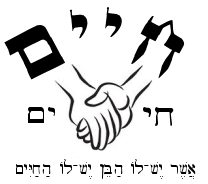 |
Shabbat HaChodesh (שַׁבַּת הַקּדֶשׁ)

[ The last Sabbath of the year is a "wake up call" to begin preparing for Passover... ]
04.01.19 (II Adar 25, 5779) This coming Sabbath is called "HaChodesh" (the "Sabbath of the Month" [of Nisan]), which means it is the very last Sabbath of the Biblical year. We honor this event by "sanctifying" the new moon (Exod. 12:1-20), and we spiritually prepare for this season by taking some time to review the meaning and importance of the season of Passover. For instance, Passover has four traditional names: Chag Ha-Pesach (the holiday of the Passover [Num. 9:2]); Chag HaMatzot (the holiday of Unleavened Bread [Exod. 12:17-20]); Chag Ha-Aviv (the holiday of Spring [Deut. 16:1]), and Z'man Cheiruteinu (the Season of our Freedom). The Torah also uses four expressions of freedom to tell the Jewish people how He will take them out of Egypt ("I will bring you out"; "I will free you"; "I will redeem you"; and "I will take you as my own"), each expression of which is associated with one of the four cups of the traditional Seder. Above all, however, Passover marks the yahrzeit (anniversary of the death) of Yeshua as our Passover Lamb.
Words and Healing...

[ The following is related this week's Torah (parashat Tazria), and in particular the spiritual sickness (tzara'at) that results from abusing our language (and therefore our thinking). ]
04.01.19 (II Adar 25, 5779) Just as a body can become sick with illness, so can a soul: "I said, 'O LORD, be gracious to me; heal my soul (רְפָאָה נַפְשִׁי), for I have sinned against you!'" (Psalm 41:4). Jewish tradition links tzara'at ("leprosy") with the sin of lashon hara ("evil talk"), suggesting that the word metzora ("leper") is word play from the Hebrew phrase, motzi ra: "one who brings forth [speaks] evil." As it is written in Scripture: mavet ve'chaim be'yad lashon (מָוֶת וְחַיִּים בְּיַד־לָשׁוֹן) - "Death and life and in the power of the tongue" (Prov. 18:21). Because we are made in the image and likeness of God, our words matter -- and they wield power. Indeed, the Hebrew word for "word" (דָּבָר) also means "thing." When we bless others, we are invoking grace and good will to be manifest in the world, but when we curse others, the opposite effect is realized. Note, however, that both the blessing and the curse returns to the one who utters it...
Regarding lashon hara Yeshua soberly warned us, "I tell you, on the day of judgment people will give account (ἀποδίδωμι) for every careless word they speak (i.e., πᾶν ῥῆμα ἀργόν, all "empty" or "thoughtless" words), for by your words you will be justified, and by your words you will be condemned" (Matt. 12:36-37). Every word we utter reaches up to the highest places of heaven and echoes there. The sages say, "my words - not a soul knows." But the Holy One, blessed be He, says, "I am sending an angel who will stand near you and record every word you say about your neighbor." Every word we speak is recorded in the "heavenly scrolls" (Rev. 20:12). Therefore King David admonishes us, "Who desires life (מִי־הָאִישׁ הֶחָפֵץ חַיִּים) and loves many days that bring forth good? Guard your tongue from evil and keep your lips from using deceptive speech. Turn away from evil and do good; seek peace and pursue it" (Psalm 34:13-14). Notice the connection between our words (i.e., out thoughts) and our deeds here, which again suggests the connection between "words" and "things" (i.e., devarim: דְּבָרִים). It is very sobering to realize that our inmost thoughts are essentially prayers being offered up to God...
"Take care then how you hear, for to the one who has, more will be given..." (Luke 8:18). Those who curse others, who practice hate, feed the hatred of their own souls and will reap the fruit of their lips... Those who bless others, on the other hand, who practice love, feed grace to their souls and will likewise reap the fruit of their lips. "The good person out of the good treasure of his heart produces good, and the evil person out of his evil treasure produces evil, for out of the abundance of the heart his mouth speaks" (Luke 6:45).
Because the metzora was put into exile because of his sinful thinking (i.e., words), so he came back to the "edge of the camp" only with words... This first step back was crucial, as the prophet later said, "Return to the LORD and repent! Say to him: 'Completely forgive our iniquity; accept our penitential prayer, that we may offer the praise of our lips'" (Hos. 14:2). When we sincerely return to the LORD, He will take care of the problem of our impurity, uncleanness, and sin. That's the message of the cross of Yeshua, too. We can add nothing to His finished work but simply accept it as performed on our behalf through faith...
Note: There is a larger principle here that involves our responsibility to be truth-bearers, to not abuse or slander others, to not abuse our minds, etc. Evil thought brings evil into verbalized consciousness which is ultimately released into the world, and this is something for which we shall give account. The corollary notion that "good talk" is always blessed must be qualified to carefully define what "good" means. For instance, some people might regard "good" talk as "nice" or "politically correct" talk, but that certainly is not true; since people routinely flatter and manipulate others using nice-sounding words. Still other people may think they are doing heaven a favor by arguing and beating people over the head with their vision of the truth. Humility is a necessary ingredient for dibbur emet (דִּבּוּר אֱמֶת). truth telling, and those who lack it speak falsely even if they technically they are telling the truth.
|














